 13/06/2008 12:28 13/06/2008 12:28 |
|
| | | OFFLINE | | Post: 13.913 | Registrato il: 28/08/2005
| Utente Gold | |
|
======================================================================
Bush at Vatican meeting with Pope
By DEB RIECHMANN

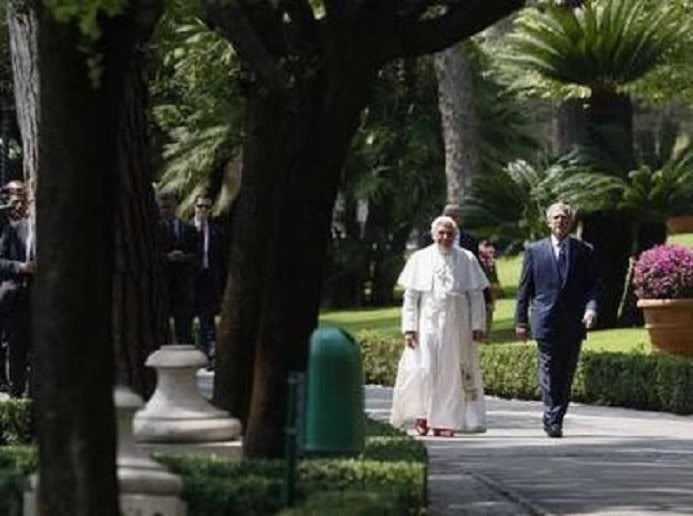
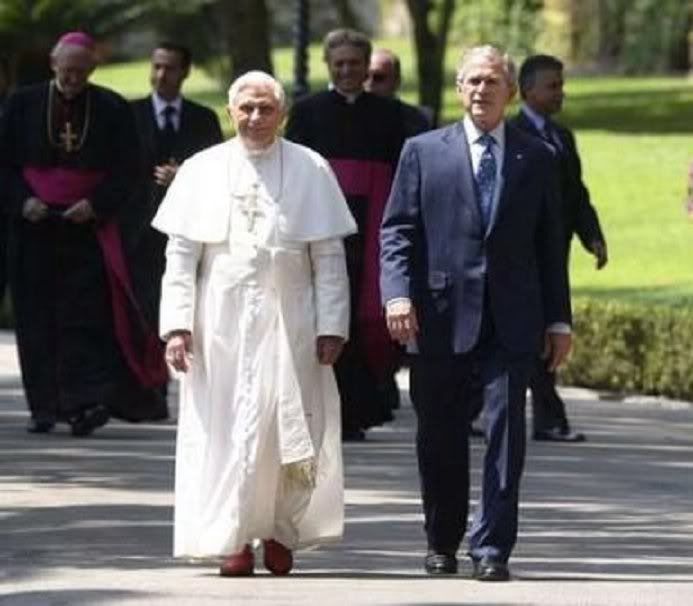
ROME, June 13 (AP) - Pope Benedict XVI gave President Bush a rare peEk on Friday of the Vatican Gardens, a spot where popes pray privately and only special guests are allowed to stroll.
"Your Holiness, you're looking good," Bush told the Pope as the two shared a warm greeting.
Normally, VIPS are received in the Pope's library in the Apostolic Palace. That's where Bush had his first meeting with Benedict in June 2007.
But in an apparent gesture of appreciation for the warm welcome Bush gave him in Washington in April, Benedict welcomed the President and First Lady Laura Bush near St. John's Tower in the lush Vatican Gardens.
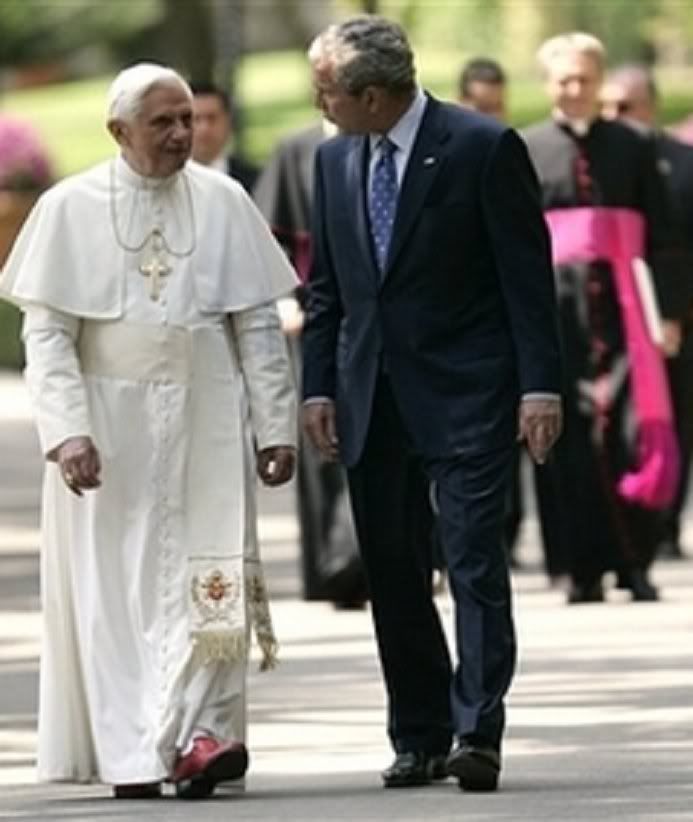
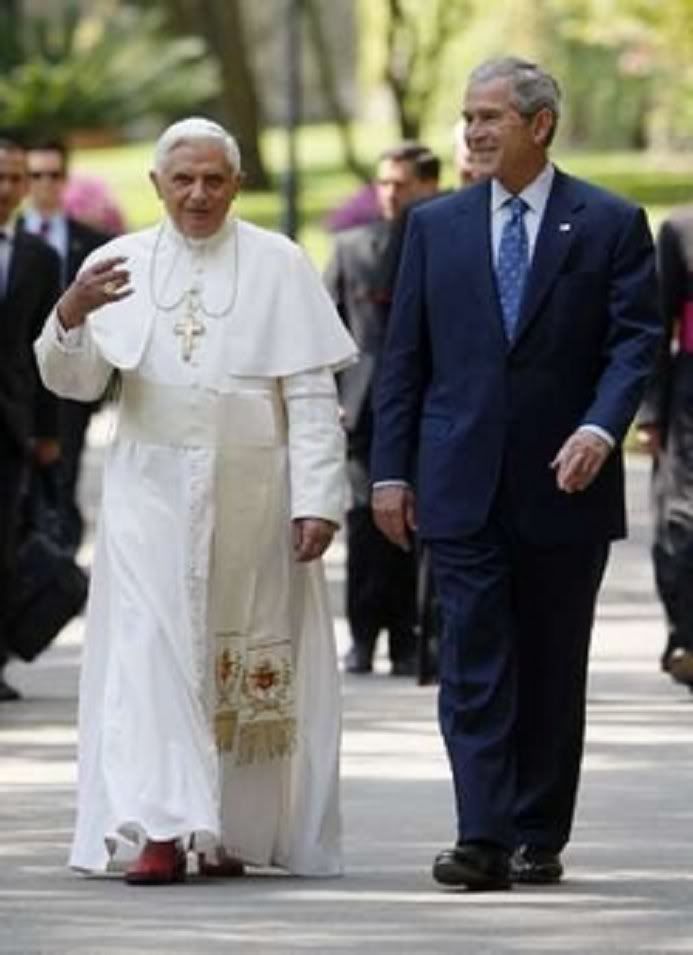
The presidential motorcade had bounded through downtown Rome, with people leaning out balconies and popping out of their businesses to watch.
Bush's limousine pulled into St. Peter's Square and continued on to St. John's Tower, where he and Mrs. Bush were greeted by the Pope.
On a brief tour, Benedict and Bush peered out from a tower balcony, and the President seemed awed by the view all around.
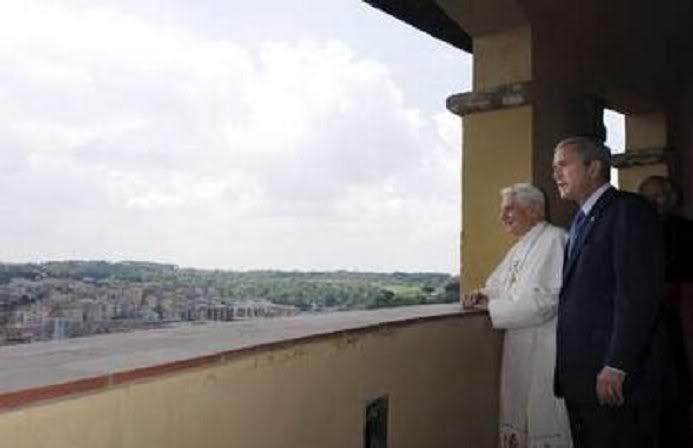
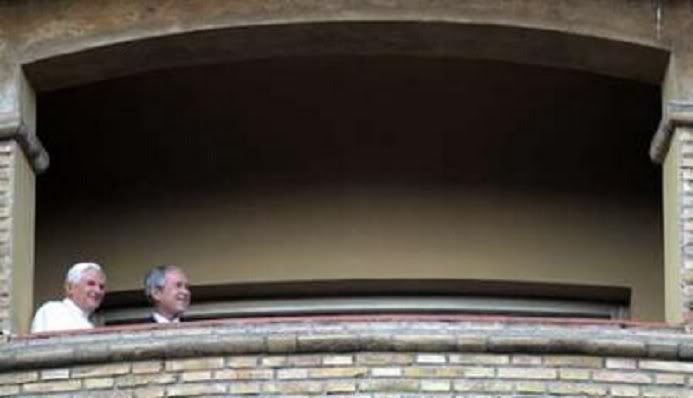
"This is fantastic up here," Bush said. "Thank you so much for showing me this."
White House press secretary Dana Perino said the two leaders have the kind of relationship that allows them to speak frankly. They were to discuss such issues as human rights, HIV and AIDS in Africa, and poverty around the world, she said.
After their private meeting ended, Bush and Benedict posed for official photographs and exchanged gifts.
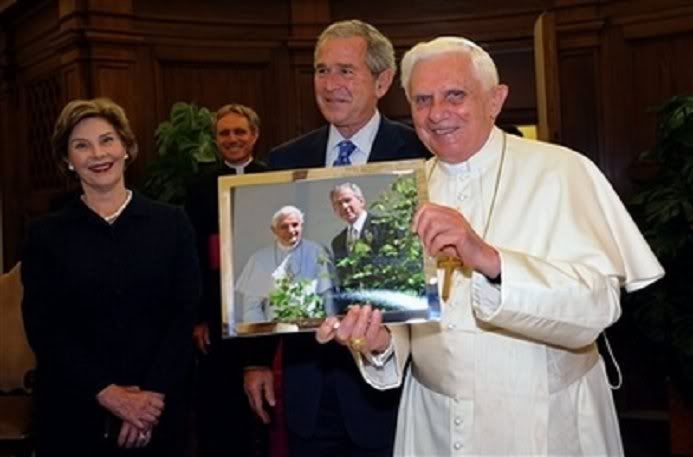
The President gave the Pontiff a photograph of the two walking along the White House colonnade on their way to the Oval Office in April. The picture was presented in a sterling silver frame with an engraved presidential seal. Benedict gave Bush a framed photograph and four volumes on St. Peter's Basilica. Members of the presidential entourage received rosaries and medals of the pontificate.
Bush and the Pope then strolled through the gardens to see the Lourdes Grotto, which was donated to Pope Leo XIII at the turn of the century by French Catholics. Bush and Benedict sat in wooden patio-style chairs admiring the grotto as Mrs. Bush rejoined them.
Sirens in the city and the whirring of a helicopter overheard broke the silence in the placid scene — as did noisy parrots that flew right over the heads of the Bushes and the Pontiff.
The group was then treated to the performance of a young boys' choir [the Sistien Chapel Choir]. Bush and the First Lady personally thanked the children when they finished.
Bush and Benedict share much common ground, particularly in opposing abortion, gay marriage and embryonic stem cell research. But they disagree on other issues, including the war in Iraq, the death penalty and the U.S. trade embargo against Cuba.
Benedict's journey to the United States will be best remembered for his repeated comments about the shame of the church's clergy sexual abuse crisis. He held a dramatic private meeting with five abuse victims from the scandal-scarred Boston Archdiocese.
In Washington and New York, Benedict sounded themes about truth trumping moral relativism, rich nations' responsibility to care for poor ones, and Catholics' call to live out their faith.
Bush, after his visit to the Vatican, was flying to France where he was giving a speech in Paris to highlight a rebound in trans-Atlantic relations, which were fractured over the war in Iraq. He is also commemorating the 60th anniversary of the start of the Marshall Plan, the massive U.S. aid program to rebuild Europe after World War II.
Bush's vision of a new era of trans-Atlantic relations will last at least seven more months.
The next U.S. President will determine the tenor of future U.S.-European relations, but until then Bush will continue to capitalize on the election of Europe's newest powerbrokers, some of whom are less critical of the war in Iraq than their predecessors.
Bush said he is seeing the outlines of a "new era of trans-Atlantic unity" in the faces of Europe's current leaders like Italian Premier Silvio Berlusconi, British Prime Minister Gordon Brown, German Chancellor Angela Merkel and French President Nicolas Sarkozy.
"I see a commitment to a powerful and purposeful Europe that advances the values of liberty within its borders and beyond," Bush was to say in the speech Friday in Paris. "And when the time comes to welcome a new American President next January, I will be pleased to report to him that the relationship between the United States and Europe is the broadest and most vibrant it has ever been."
A few short years ago that wasn't the case. Former German Chancellor Gerhard Schroeder and former French President Jacques Chirac clashed with Bush over the U.S.-led invasion of Iraq. Two of Bush's allies, former British Prime Minister Tony Blair and ex-Spanish Prime Minister Jose Maria Aznar, paid a political price for backing Bush on the war, which fractured trans-Atlantic ties.
Bush has spent his second term successfully mending them. But while the Bush administration has linked arms with nations across the globe to try to solve a host of international challenges and threats, including North Korea and Iran's nuclear programs, the President's initial go-it-alone reputation set the tone of his presidency.
Bush sees Pope
in break from Iran push
By Philip Pullella and Jeremy Pelofsky

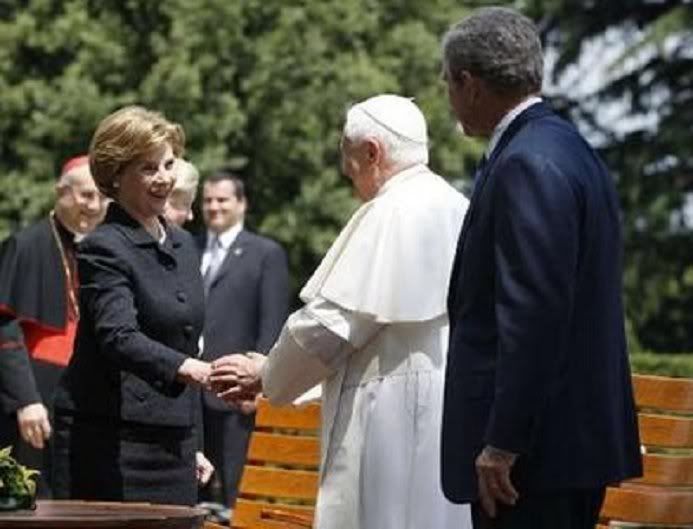
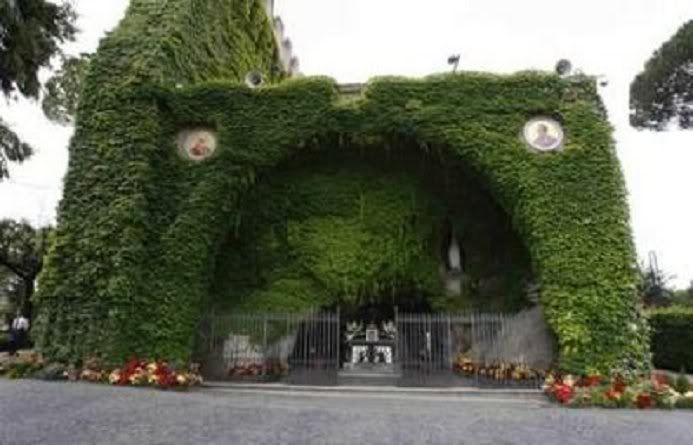 The grotto of Our Lady of Lourdes in the Vatican Gardens.
The grotto of Our Lady of Lourdes in the Vatican Gardens.
VATICAN CITY, June 13 (Reuters) - U.S. President George W. Bush met Pope Benedict at the Vatican on Friday before resuming his campaign to rally European support for more sanctions against Iran.
Bush was driven into the idyllic Vatican Gardens where, as birds chirped, the Pope welcomed him before the two entered a restored medieval tower for formal private talks.
"Such an honor, such an honor," Bush said to the Pope.
Bush was heard discussing his recent visit to the Pope's native Germany as the pair took an elevator to an upper floor of St John's Tower for talks which lasted about half an hour.
The meeting in the tower, a walk in the Vatican Gardens, and a performance by the Sistine Choir were a break with normal protocol designed to repay Bush for the warm White House lawn reception the Pope got in April on his 81st birthday.
It was the first time that a meeting with a head of state at the Vatican was not held in the Pope's private study.
Security around the Holy See was tight, with police lining the streets, anti-terrorist sharpshooters in nearby buildings and even secondary streets closed off in case Bush had to leave the area in an emergency via an alternative route.
The head of Vatican security, Domenico Giani, told the Holy See's newspaper this week that two new permanent anti-terrorism units had been set up in the mini-state and would be working together with Italian and American security during the visit.
Benedict's predecessor John Paul II had a led a campaign against the U.S.-led invasion of Iraq in 2003 but the President and the Pontiff see eye-to-eye on many moral issues, such as abortion, gay marriage and embryonic stem cell research.
A White House spokeswoman said Bush and Benedict had "established a good relationship" enabling them to talk on a range of issues including AIDS, Africa and combating poverty.
The Roman Catholic leader and the Methodist president prayed together during the U.S. visit and there has been speculation they may do so again.
But La Repubblica newspaper said not everyone in the Vatican was happy to see Benedict giving Bush special treatment. It quoted unnamed monsignors recalling that Bush did not heed the late John Paul's warnings against invading Iraq.
But one Vatican official close to the Pope told Reuters early on Friday: "The Pope is doing this because he is a gentleman. That's the long and short of it."
Condemned by many Europeans for the war in Iraq, Bush is seeking a diplomatic solution to a standoff with Tehran over its nuclear energy program while also making it clear that military options remain on the table.
Later on Friday in Paris, Bush will address the Organization for Economic Cooperation and Development, where he is expected to renew his call to prevent Tehran from obtaining a nuclear bomb and seek support for democracy in the Middle East.
To rally support for his Iran policy, Bush will see his close friend French President Nicolas Sarkozy on Friday and Saturday, followed by a stopover in London on Sunday and Monday where he will confer with British Prime Minister Gordon Brown.
"All of us ... need to be sending the same message to the Iranians, which is verifiably suspend your enrichment program or else you will face further sanctions and further isolation," Bush said after meeting Italian premier Silvio Berlusconi.
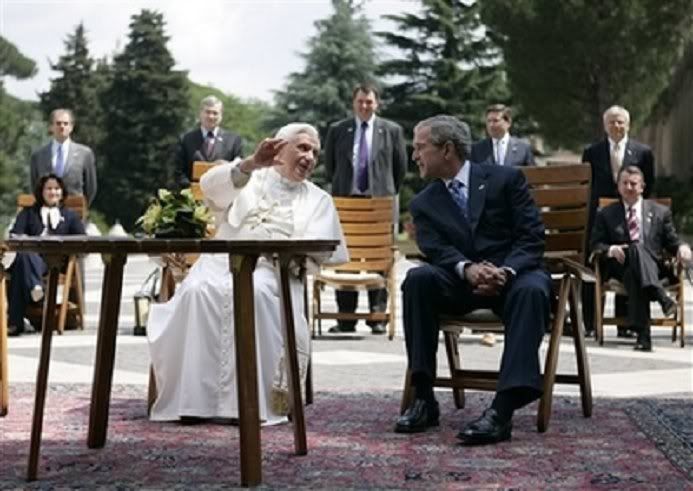
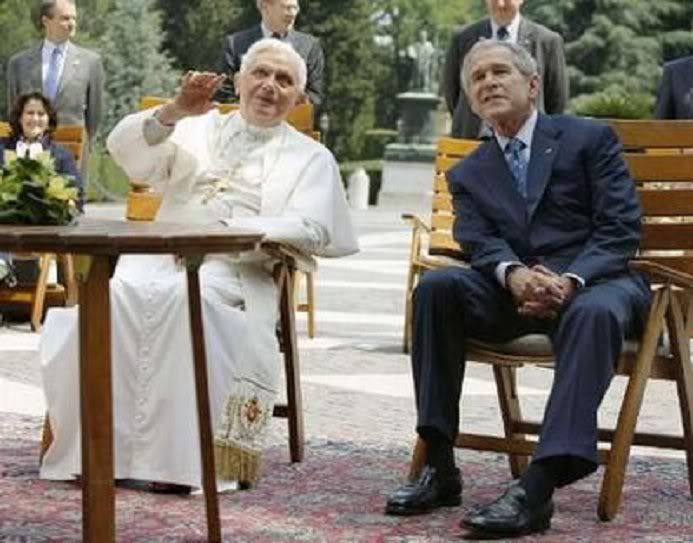 A later version of the Reuters report:
Pope and Bush take break
A later version of the Reuters report:
Pope and Bush take break
in the calm of Vatican Gardens
By Philip Pullella and Jeremy Pelofsky

VATICAN CITY, June 13 (Reuters) - Pope Benedict gave George W. Bush an unprecedented welcome in the tranquility of the Vatican Gardens on Friday before the U.S. President resumed his campaign to rally European support for sanctions against Iran.
Under tight security, Bush was driven from the bustle of Rome into the idyllic setting. As birds chirped, the two entered a restored medieval tower and held 30 minutes of private talks.
"Such an honor, such an honor," Bush said to the Pope.
After the meeting in the tower, they stood on a terrace to take in the view of 44 hectares (108 acres) of manicured gardens, buildings, ancient walls and St Peter's Basilica that make up Vatican City.
Bush asked: "How big is it?" A Vatican aide responded: "Not quite as big as Texas." Bush then said: "Yes, but more important! ... This is spectacular."
The talks in the tower, walk in the gardens and a performance by the Sistine Choir as the two sat on wooden lawn chairs were a break with normal protocol.
[The rest of the story is the same as the first one.]
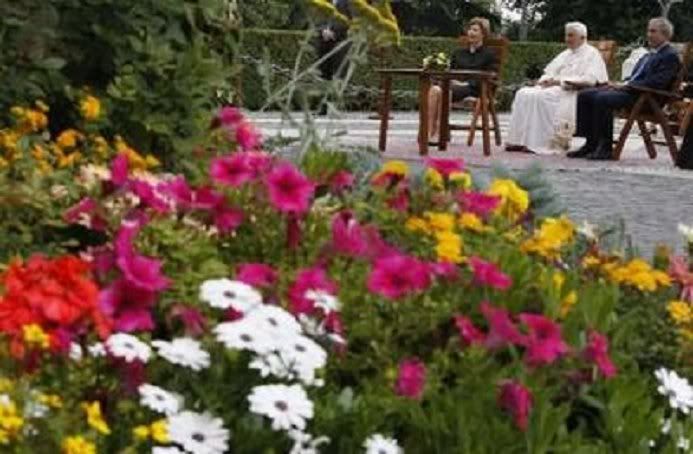
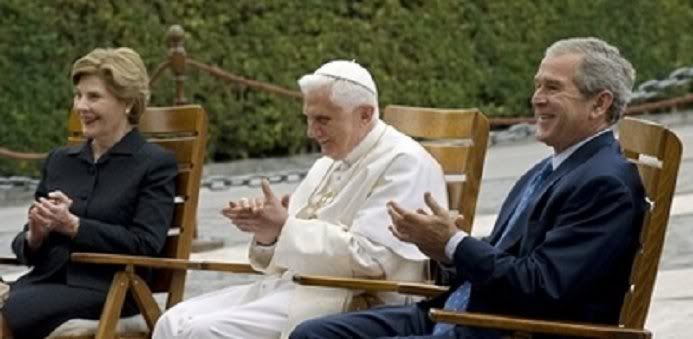 AFP was the first international news agency to report the story today but has so far not updated this initial report:
Pope lays on special Vatican welcome for Bush
AFP was the first international news agency to report the story today but has so far not updated this initial report:
Pope lays on special Vatican welcome for Bush
by Gina Doggett

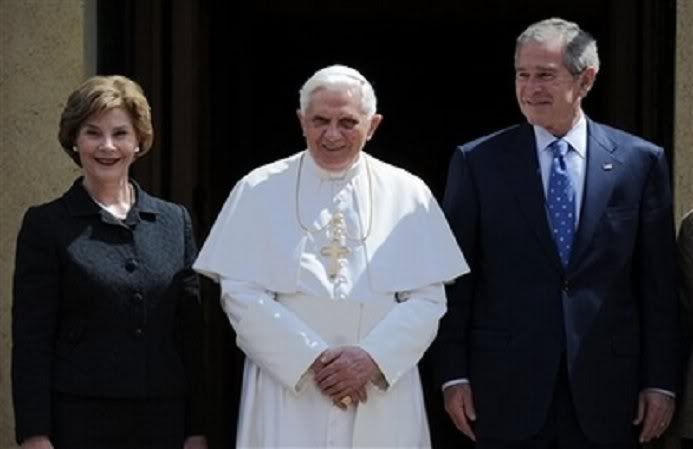
VATICAN CITY, June 13 (AFP) - US President George W. Bush arrived on Friday for a special audience with Pope Benedict XVI, who is returning the hospitality he enjoyed at the White House in April.
Swiss Guards in their striped regalia stood to attention as Bush stepped out of a black limousine with his wife Laura and was warmly greeted by the head of the Roman Catholic Church outside the medieval St John's Tower.
The US leader could be heard exclaiming "what an honour" as he clasped the pontiff's hands in his.
US Ambassador to the Vatican Mary Ann Glendon, a Catholic, kissed the Pontiff's hand.
Bush and the Pope then went into a tete-a-tete in the tower, a venue reserved for illustrious guests instead of the usual site for papal audiences, the pontiff's private library.
The two, who also met at the Vatican last year, were later to stroll in the secluded Vatican Gardens.
Benedict's trip to the United States coincided with his 81st birthday, which he celebrated in grand style at the White House on April 16, when he was greeted with a 21-gun salute and some 13,500 well-wishers filled the South Lawn.
Bush "is a huge fan of the Pope and has full respect for him," White House chief of protocol Nancy Goodman Brinker said.
The US leader "fully supports the (Catholic) Church and fully supports everything this pope is trying to do on behalf of peace, education and hunger in cooperation with world political leaders," she told the ANSA news agency.
Bush, whose relations with Pope John Paul II were strained because of the US-led invasion of Iraq, feels closer to Benedict, who appreciates the religious fervour of the President, a born-again Protestant.
The two see eye to eye on key social issues, as both are staunch opponents of same-sex marriage, abortion and embryonic stem-cell research, though they diverge notably on the death penalty.
Benedict has also voiced his concerns for the plight of Christians in Iraq and over harsh CIA interrogation methods.
On Friday, the two leaders will pray before a statue of the Madonna before bidding each other farewell.
The Italian press has been rife with speculation that Bush may convert to Catholicism as his brother, Florida Governor Jeb Bush, did years ago, as well as former British prime minister Tony Blair. The latter two men are both married to Catholics.
Bush had talks in Rome on Thursday with Italian Prime Minister Silvio Berlusconi on the third leg of his farewell tour of Europe, which has taken him to Slovenia and Germany and will end with stops in France and Britain.
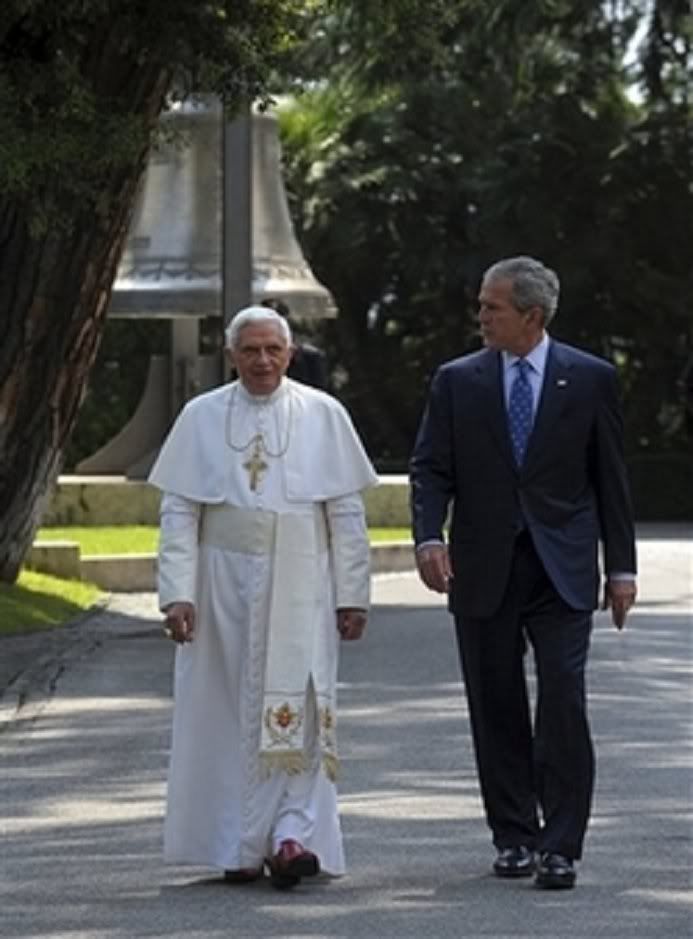
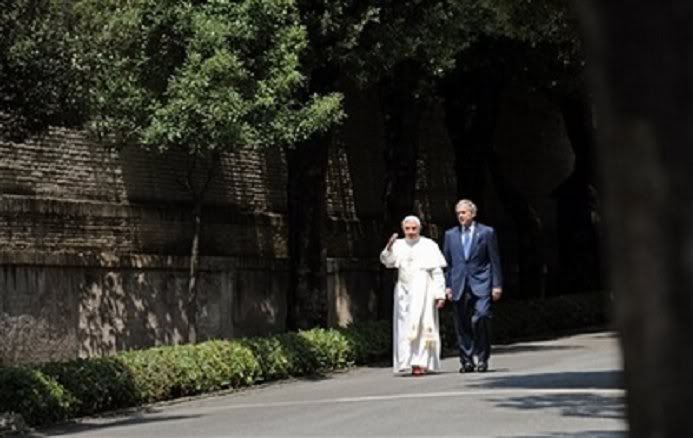
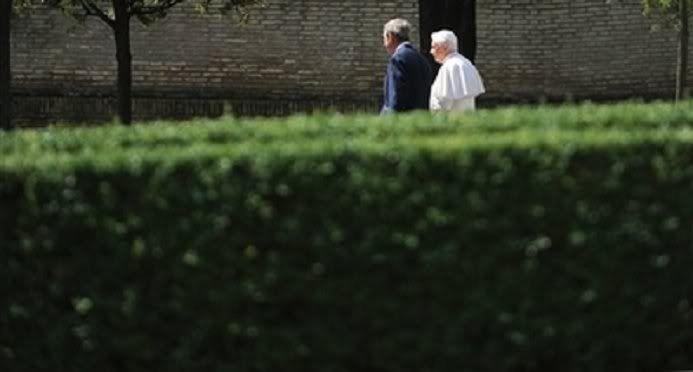 Pope, Breaking With Protocol,
Pope, Breaking With Protocol,
Gives Bush Vatican Garden Tour
By Flavia Krause-Jackson

VATICAN CITY, June 13 (Bloomberg) -- Pope Benedict XVI, breaking with tradition, personally greeted U.S. President George W. Bush on his arrival to the Vatican today for a meeting with the leader of the world's 1.1 billion Catholics.
The pontiff stood and waited for Bush to arrive before leading him up to the medieval St John's Tower. Typically, papal audiences take place in the Pontiff's private library in the Apostolic Palace.
Bush was the first head of state to be personally greeted by Benedict upon arriving at the Vatican. Following their 30-minute meeting, the Pope led Bush, an evangelical Christian, for a walk in the Vatican gardens.
The German-born Pope has been one of the most outspoken critics of the U.S. invasion and military occupation of Iraq. Still, Bush shares the Vatican's opposition to same-sex marriage, abortion and stem-cell research and Bush hosted a birthday party at the White House during a six-day papal visit to the U.S. in April.
Bush presented Benedict with an autographed photo of the two men taken during the Pontiff's U.S. trip.
Bush, on his sixth and final official visit to Italy, met with Prime Minister Silvio Berlusconi last night, flies out today to Paris and wraps up his European tour with a trip to the U.K. on June 15 and 16.
[Modificato da TERESA BENEDETTA 13/06/2008 17:45] |
|
 13/06/2008 14:22 13/06/2008 14:22 |
|
| | | OFFLINE | | Post: 13.914 | Registrato il: 28/08/2005
| Utente Gold | |
|
  Finally, someone in MSM has acknowledged the implications of the reception given by Pope Benedict XVI to President Bush at the Vatican today. For days, the international 'commentariat' has avoided pointing out the obvious: while they may dismiss George W. Bush as 'no longer relevant' in his remaining 8 months as President [forgetting that, in any case, he still retains the full powers of the US Presidency - and as such, continues to be 'the most powerful man on the planet' - until January 20, 2009], the Pope has gone out of his way to give him unprecedented attention. This is from today's issue of Italy's most prestigious newspaper.
The Pope shows
Finally, someone in MSM has acknowledged the implications of the reception given by Pope Benedict XVI to President Bush at the Vatican today. For days, the international 'commentariat' has avoided pointing out the obvious: while they may dismiss George W. Bush as 'no longer relevant' in his remaining 8 months as President [forgetting that, in any case, he still retains the full powers of the US Presidency - and as such, continues to be 'the most powerful man on the planet' - until January 20, 2009], the Pope has gone out of his way to give him unprecedented attention. This is from today's issue of Italy's most prestigious newspaper.
The Pope shows
consonance with Bush
by Massimo Franco
Translated from

June 13 2008
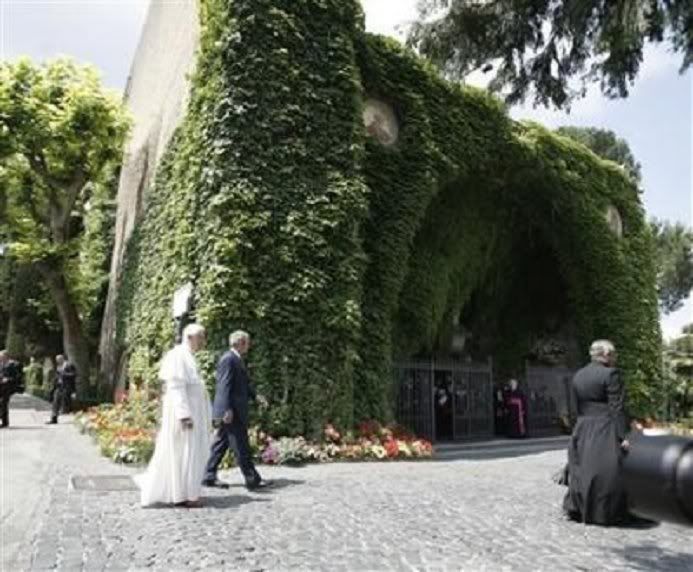 The Pope and the President approaching the grotto to Our Lady of Lourdes in the Vatican Gardens.
The Pope and the President approaching the grotto to Our Lady of Lourdes in the Vatican Gardens.
The meeting today between Benedict XVI and George W. Bush indicates the degree of change in Vatican-USA relations since the years of John Paul II.
The 'familiar' protocol personally decided on by the Pope for today's meeting underscores his sympathetic receptiveness towards the American President, which was already evident when he visited the United States last April.
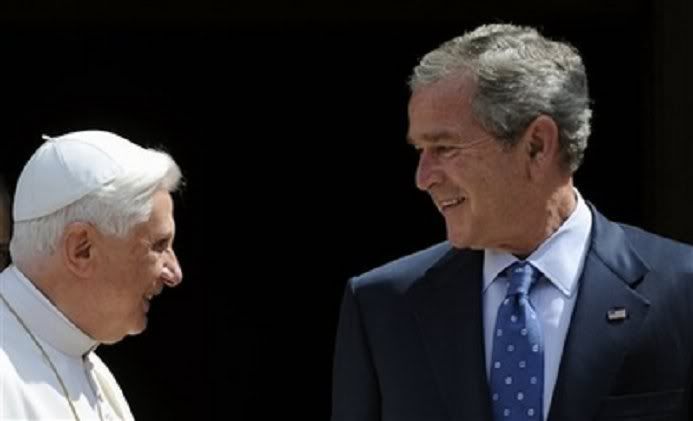
It shows a Pontiff who does not mind going countercurrent, symbolically embracing a leader widely considered unpopular.
Not only that. Bush is nearing the end of his presidential mandate, and yet the Holy See has decided to receive him with fill honors - and more. To the point of arousing murmurs among some of the Roman Curia.
Who do not seem to appreciate that the harmony between the two leaders comes above all from the resolve with which Bush has defended a pro-life stand on bio-ethical issues, and what his administration has invested in fighting worldwide disease including AIDS - doing so on his own, certainly not to please the Vatican!
Moreover, the differences that had divided the White House and the Vatican over the war in Iraq are apparently behind them. What both see as more important today is to rebuild Iraq and protect the religious minorities.
On his recent trip, Benedict XVI openly praised the United States for its 'healthy secularity', and in turn earned the appreciation of the American public, far beyond all expectations. Especially having expressed himself repeatedly on the priest scandals that had cast such a shadow on the Church in the United States.
Thus, there was not much surprise when Bush's chief of protocol, Nancy Goodman Brinker, told journalists that Bush is 'a great fan of the Pope'. More surprising to many was the 'Americanophilia' that Benedict XVI has shown. [Though not a surprise who those who have followed his writings and statements before he became Pope.]
L’Osservatore Romano led up to the meeting earlier this week by publishing interviews with the Apostolic Nuncio to Washington, Archbishop Pietro Sambi, and with the Vatican's permanent observer at the United Nations in New York, Archbishop Celestino Migliore.
Sambi remarked that the conversation between Bush and the Pope at the White House last April "was of a private nature - we know what was made public, but we cannot rule out that they discussed other topics".
Some have interpreted his words, perhaps far beyond his intentions and what the situation merits - such as conjecture that the Methodist Bush may convert to Catholicism.
Also notable was that the Prefecture of the Pontifical Household saw fit to publish, in Italian and English, a booklet describing the "Protocol for the Reception" of today's private meeting.
Bush's visit with the Pope - and its extraordinary features - sealed two gratifying days in Rome for the US President, who met with President Napolitano and his old friend and ally, Prime Minister Silvio Berlusconi, yesterday - despite a demonstration by hundreds protesting the Iraq war.
For the Vatican, it was not only a new point in relations with this outgoing administration, but also of sympathy and token of goodwill towards the next President of the United States.
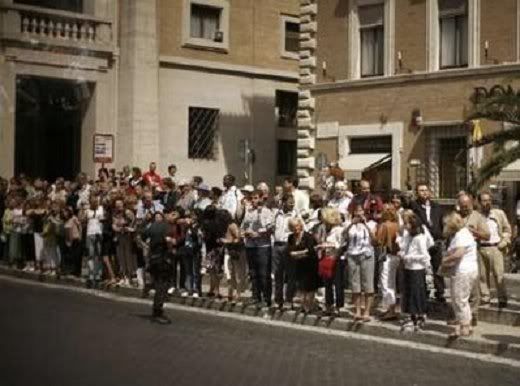 A crowd lines the street along the route taken by Bush's motorcade to the Vatican today.
There's an equally positive editorial in Il Tempo, whioch does not yeild to the temptation of equating the Bush Presidency only to the Iraq war, as Benedict XVI obviously does not:
Benedict XVI and George W. Bush:
A crowd lines the street along the route taken by Bush's motorcade to the Vatican today.
There's an equally positive editorial in Il Tempo, whioch does not yeild to the temptation of equating the Bush Presidency only to the Iraq war, as Benedict XVI obviously does not:
Benedict XVI and George W. Bush:
Two paladins in defense of life
Translated from

With his visit to Benedict XVI today, President Bush symbolically brings his own Presidency towards its ideal completion. A Presidency that has been characterized by a strong appeal to the founding values of the West to which America owes its exsitence and identity.
Thse founding values have at their root a vision of man taught by the Christian history and culture of Europe. America, said one of its founding fathers, Alexander Hamilton, is 'an experiment in freedom'.
It does not have a state religion that is held reponsible for producing the values which society needs in order to survive. The state does not favor any one religion, but neither does it try to impose itself as the source of those values which must come from the depths of man and his relation with the divine.
The State respects all churches and all religions, and, recognizing their function in society, seeks to help them carry out their mission and allows itself to be helped in carrying out its own mission, while avoiding any confusing mix-up.
These are the elements of American identity which have allowed the United States to see in John Paul II, and now in Benedict XVI, a basic partner in dialog not only on the issue of peace in the world, but also on questions which concern the identity and destiny of the American people.
This relationship between religion and politics has been traditional in the United States but not taken for granted. Ahead of Europe and to a more intense degree, the United States has experienced radical secularization, of an opulent society in which the only recognized values are the immediate satisfaction of selfish individual impulses, of values which are nothing but mundane.
But before Europe, too, the United States also experienced the social breakdown resulting from such secularization, and its recovery, starting in the 1980s, has been due to a strong and conscious return to its founding values.
In this course, the role of the Catholic Church in the United States has been fundamental, because it has emerged no longer as a minority phenomenon but as an interpreter of the nation's conscience, certainly in the dialog with other Christian churches and with Judaism.
In America, Christians cannot impose their convictions on amyone, but they have the full right to participate in the public debate and to seek, secularly, a consensus on its owbn vision adn experience of man.
There is a book by Richard John Neuhaus, which is at the same time the start as well as the tesimony to this cultural attitude, called The naked public square. The public space cannot be devoid of significance even if the state should neither produce nor impose these values.
Of course, there was a moment of strong papal opposition to the war in Iraq. John Paul II was firmly against it, as the man who would succeed him was.
Nonetheless, even Bush would acknowledge how much wisdom there is in the papal admonitions about the dangers of war which almost always lead to evils greater than those thy seek to remedy.
[Modificato da TERESA BENEDETTA 14/06/2008 05:17] |
 13/06/2008 17:13 13/06/2008 17:13 |
|
| | | OFFLINE | | Post: 13.915 | Registrato il: 28/08/2005
| Utente Gold | |
|
  The Vatican Press office today issued two bulletins on the meeting between Pope Benedict XVI and President Bush. One was the usual communique issued after the Pope meets a head of state and/or government. The other was a description of the 'extraordinary protocol' that was followed.
AUDIENCE OF THE HOLY FATHER BENEDICT XVI
The Vatican Press office today issued two bulletins on the meeting between Pope Benedict XVI and President Bush. One was the usual communique issued after the Pope meets a head of state and/or government. The other was a description of the 'extraordinary protocol' that was followed.
AUDIENCE OF THE HOLY FATHER BENEDICT XVI
WITH H.E. GEORGE W. BUSH, PRESIDENT OF THE UNITED STATES OF AMERICA
Translated from

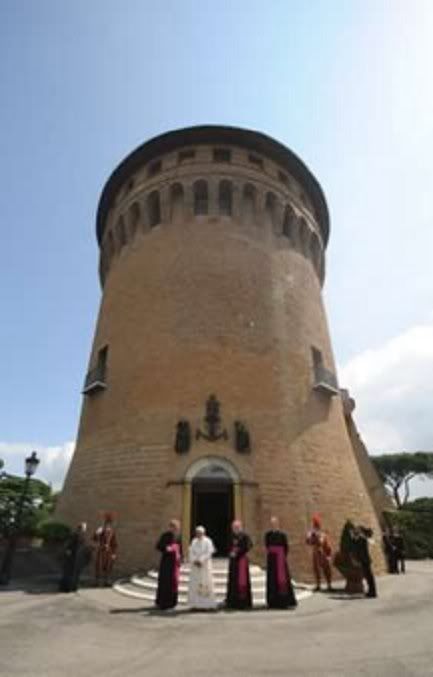
At 11 a.m. today, the Holy Father Benedict XVI received H.E. George W. Bush, President of the United States of America, in an audience at the study of the Torre di San Giovanni in the Vatican Gardens.
The President was accompanied by his wife Laura, and by H.E. Mary Ann Glendon, ambassador of the USA to the Holy See.
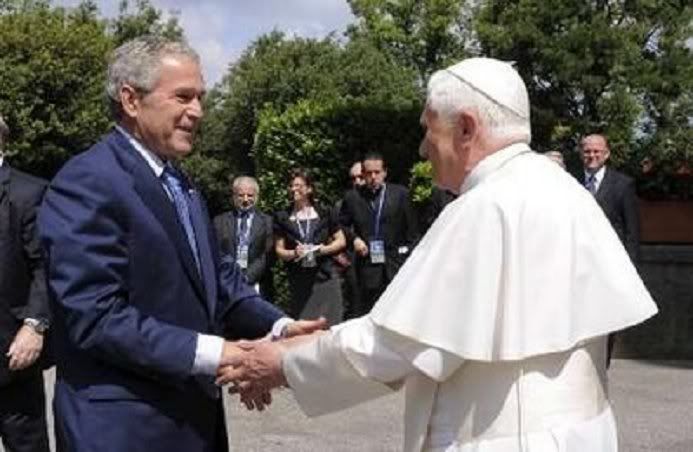
The Pope welcomed the President, Mrs. Bush and Ambassador Glendon at the foot of the steps leading to the Tower entrance. The Holy Father and the President then proceeded to the first-floor study for their private meeting.
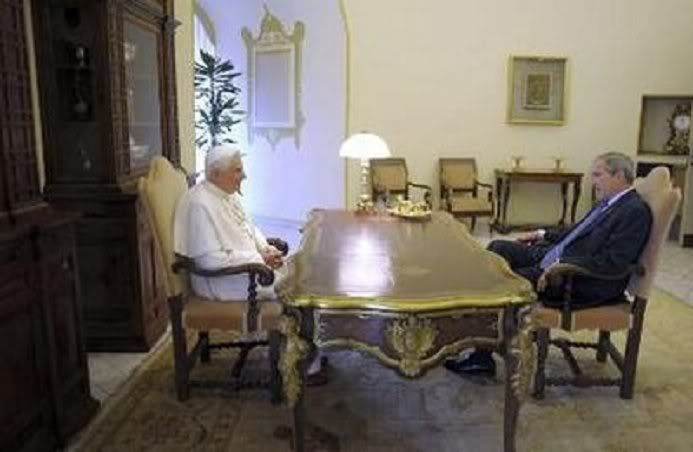
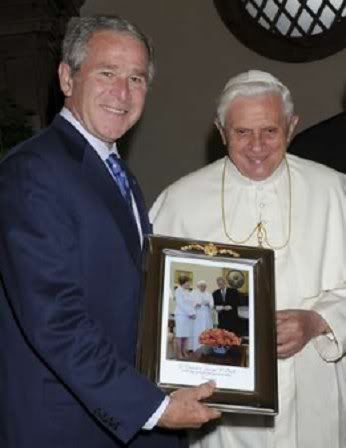 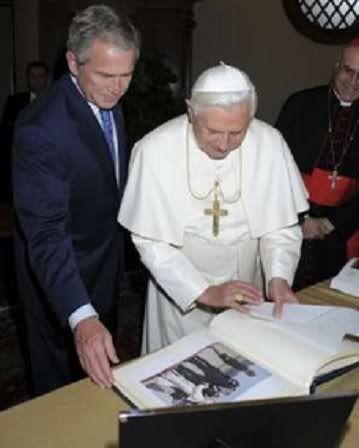
At the end of that meeting, the Pope and the President returned to the ground floor to join the Secretary of State, Cardinal Tarcisio Bertone, Mrs. Bush and Ambassador Glendon for the exchange of gifts and for the official photographs of the meeting.
The Pope and the President then left the Tower to walk in the Vatican Gardens, reaching the grotto of Our Lady of Lourdes, passing through Viale Pio XII, the San Giovanni Bastion, L:argo Ca[panna Cinese (with the 2000 Jubilee Bell), and Via Pio XI.
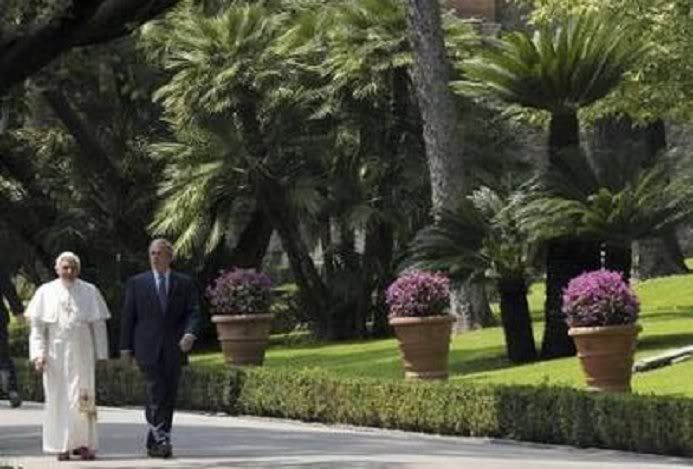
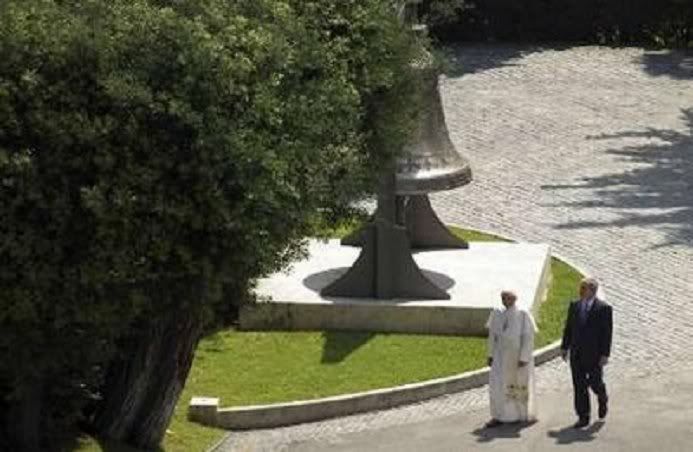
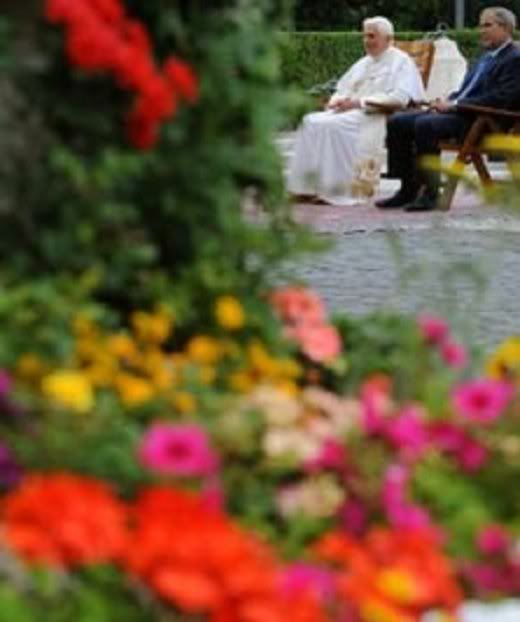
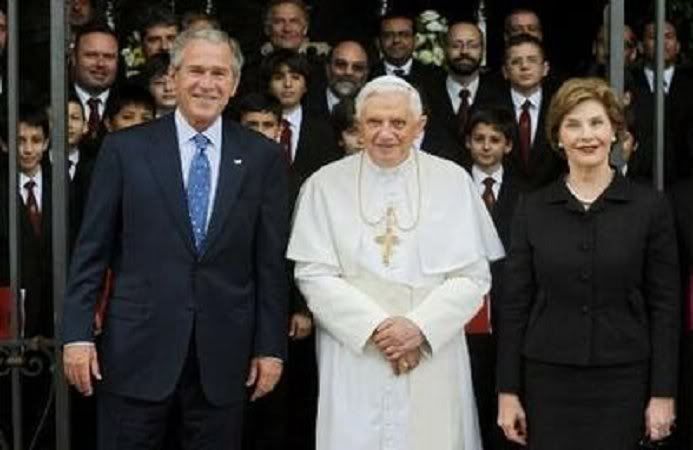
At the Piazzetta of the Lourdes Grotto, the singers of the Cappella Musicale Pontificia (better known as the Sistine Chapel Choir), under the direction of Mons. Giuseppe Liberto, performed two motets for the Holy Father, the president and their respective delegations. [Vatican Radio identified the motets as Palestrina's Exultate Deo and Alma Redemptoris Mater composed by Mons. Liberto himself.]
At 12 noon, President and Mrs. Bush and their delegation bade farewell to the Holy Father and left the Vatican.
The communique about the meeting was released in Italian and English:
COMMUNIQUE FROM THE PRESS OFFICE OF THE HOLY SEE
This morning, Friday 13 June 2008, George W. Bush, President of the United States of America, was received in audience by His Holiness Benedict XVI.
In order to respond to the cordiality of the welcome received by the Supreme Pontiff during his recent visit to the United States of America, the audience followed a special protocol.
The Holy Father greeted President Bush - who was accompanied by his wife Laura and by Mary Ann Glendon, the U.S. ambassador to the Holy See - at the entrance to the Tower of St. John located in the Vatican Gardens.
His Holiness and the President of the United States then went to the study on the upper floor of the tower for a private meeting, while Laura Bush and Ambassador Glendon remained with Archbishop James Michael Harvey, prefect of the Pontifical Household. Subsequently they were joined by Cardinal Secretary of State Tarcisio Bertone.
During the cordial talks, the Holy Father first reiterated his gratitude for the warm and exceptional welcome he had received in the United States of America and at the White House during his visit there in April, and for the President's commitment in defence of fundamental moral values.
The discussions them turned to the main themes of international politics: relations between the United States of America and Europe, the Middle East and efforts for peace in the Holy Land, globalisation, the food crisis and international trade, and the achievement of the Millennium Development Goals.
At the end of the meeting, and following the exchange of gifts, Benedict XVI and President Bush took a brief stroll in the Vatican Gardens to the Grotto of Our Lady of Lourdes where they were joined by Mrs Bush and the entourage. There, the Choir of the Sistine Chapel sang two hymns.
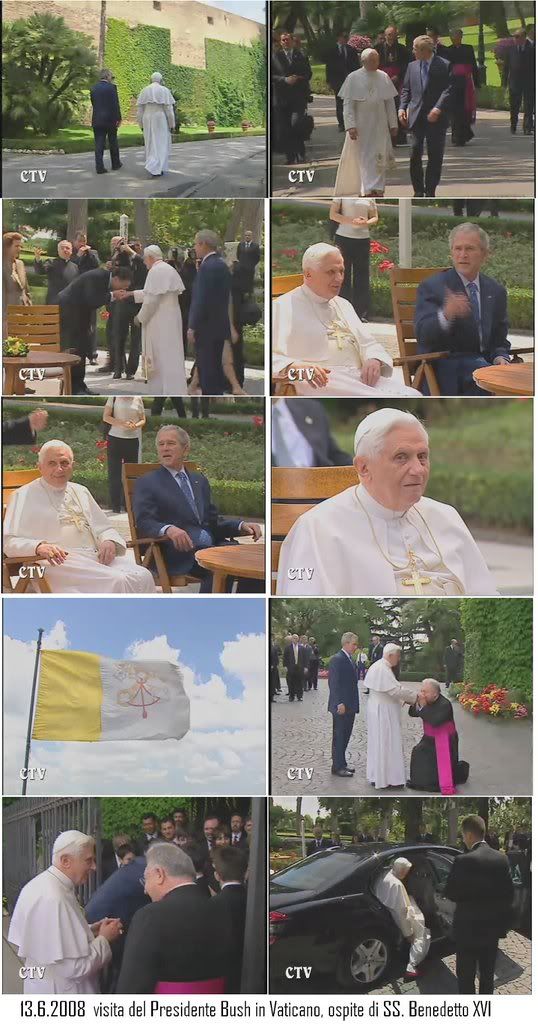 Video-cap montage by Caterina.
The CNS report offers a few more details than the earlier reports:
Bush and Pope meet in Vatican Gardens
Video-cap montage by Caterina.
The CNS report offers a few more details than the earlier reports:
Bush and Pope meet in Vatican Gardens
for private talks, informal stroll
By Carol Glatz

VATICAN CITY. June 12 (CNS) -- In a cordial and festive visit to the Vatican, U.S. President George W. Bush met with Pope Benedict XVI in the lush Vatican Gardens for private talks, an informal stroll and a choral performance by the Sistine Chapel Choir.
The hourlong visit June 13 was the fifth time Bush came to the Vatican for a papal audience and his third meeting with Pope Benedict. However, it was the first time in recent memory a head of state was welcomed in such an informal way and at such a unique location.
The Vatican had said it wanted to break with protocol to show its appreciation for the President's warm hospitality during the Pope's visit to the White House during his April 15-20 trip to the U.S.
With birds chirping and a cool, light breeze blowing through gnarled olive trees and looming cypresses, the Pope greeted the U.S. President at the entrance of a medieval tower on the Vatican's highest hill in the gardens.
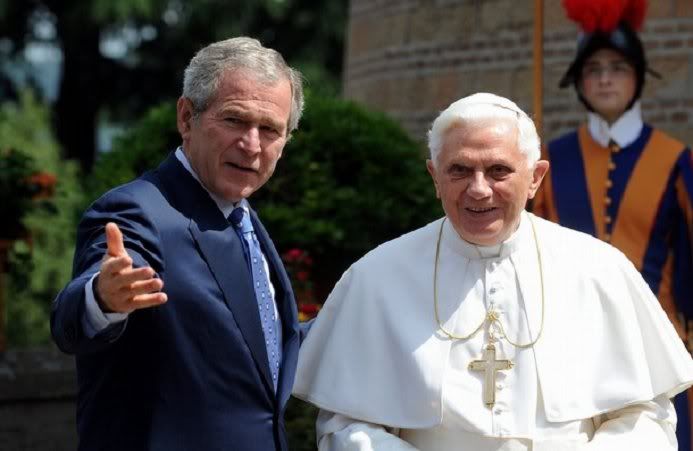
They both expressed their pleasure at seeing each other again.
"It's such an honor," Bush told the Pope as cameras clicked and smiles beamed.
First lady Laura Bush approached Pope Benedict and said: "How are you? It's so good to see you. You look great."
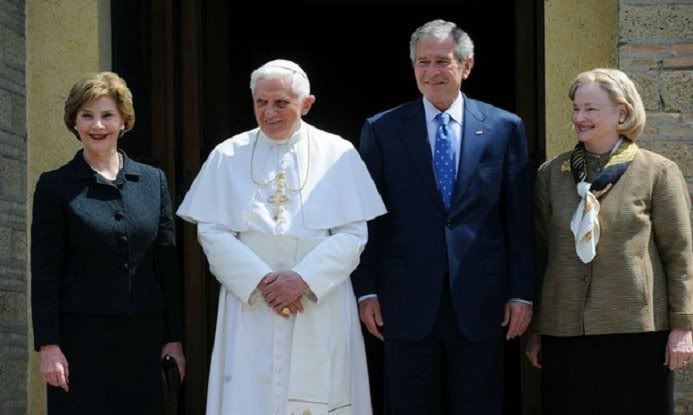
U.S. Ambassador to the Vatican Mary Ann Glendon accompanied the presidential entourage. When she and Laura Bush flanked the Pope and the President for photographs, Bush told the Pope, "We are surrounded by impressive women."
Pope Benedict and Bush then held 30 minutes of private talks inside an ornate, circular studio on the second floor of St. John's Tower. Built on the end of a long, fortressed wall, the medieval watchtower is completely renovated and serves as special accommodations for important guests.
During the closed-door meeting, the Pope "reiterated his gratitude for the warm and exceptional welcome he had received" for his April pastoral visit "and for the President's commitment in defense of fundamental moral values," said a Vatican statement released a few hours after the meeting.
The Pope and Bush discussed international concerns such as U.S. relations with the Middle East and Europe, as well as efforts being made for peace in the Holy Land, it said.
It said they also spoke about "globalization, the food crisis, international trade and the achievement of the Millennium Development Goals," which have the aim of halving the rates of world poverty -- defined by the number of people existing on less than a dollar day -- by 2015.
Bush came to the Vatican as part of a wider European tour, which was to include a U.S.-European Union summit in Slovenia and meetings with government leaders in Germany, Italy, France and the United Kingdom.
Security was stiff in Rome throughout the president's three-day stay as police braced for expected protests. While no demonstrators were evident when Bush arrived at the Vatican, some 2,000 protesters marched through the center of Rome June 12, holding anti-war posters and shouting slogans.
While Glendon told Catholic News Service that she did not have a detailed account of what Bush and the Pope discussed during the visit, she said the two men have a common approach to pressing world issues.
They both are concerned with "keeping the human person in view" and how unfolding events impact the poorest and most disadvantaged people in the world, she said.
After their private talks, Pope Benedict escorted Bush to the top of the turreted tower to get a panoramic view of the Vatican and Rome.
Bush reportedly asked a Vatican aide how big Vatican City State is -- to which the aide replied, "Not quite as big as Texas."
Bush responded, "Yes, but more important," and remarked how "spectacular" the view was.
Visiting heads of state normally exchange gifts with the Pope.
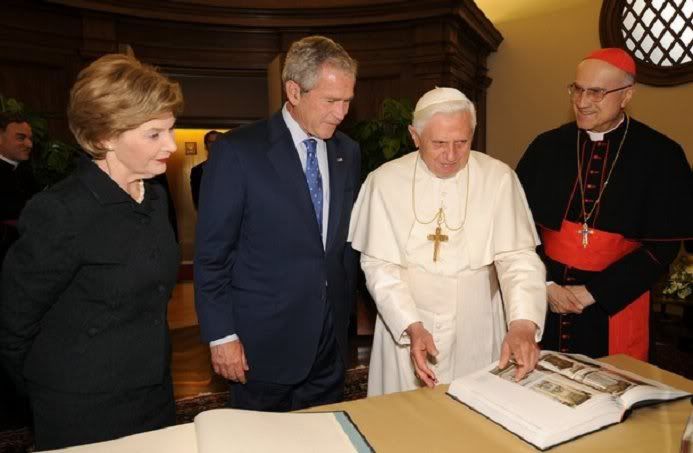
The Pope gave the President a four-volume illustrated book set about the history of St. Peter's Basilica as well as a silver-framed photograph of the Pope, the President and the First Lady in the Oval Office of the White House saying a prayer for families.
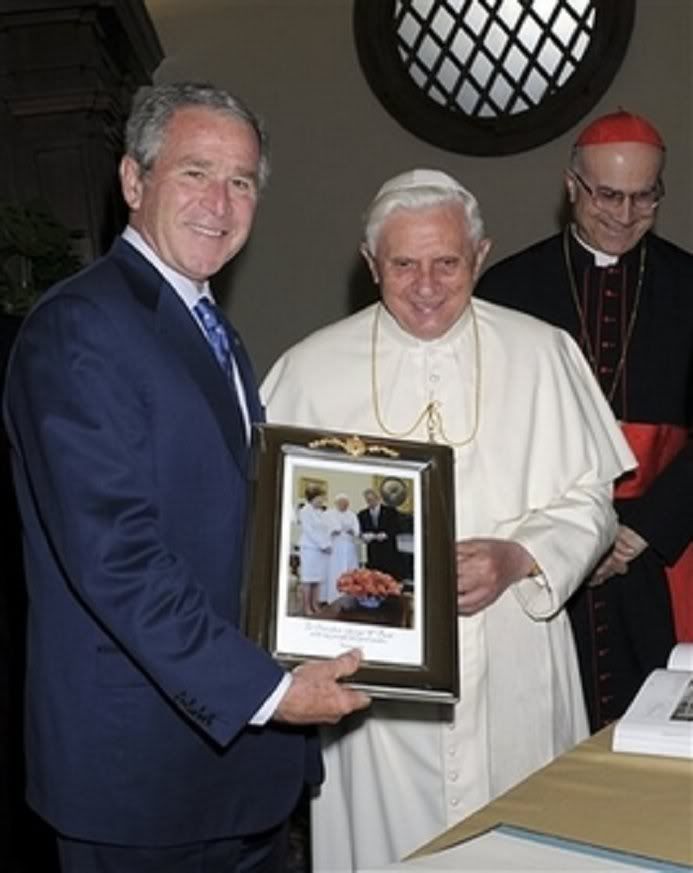
Upon seeing the framed photograph, Laura Bush laughed and exclaimed, "We're giving the same thing," as she pointed to the President's gift of a silver-framed picture of himself with the Pope at the White House.
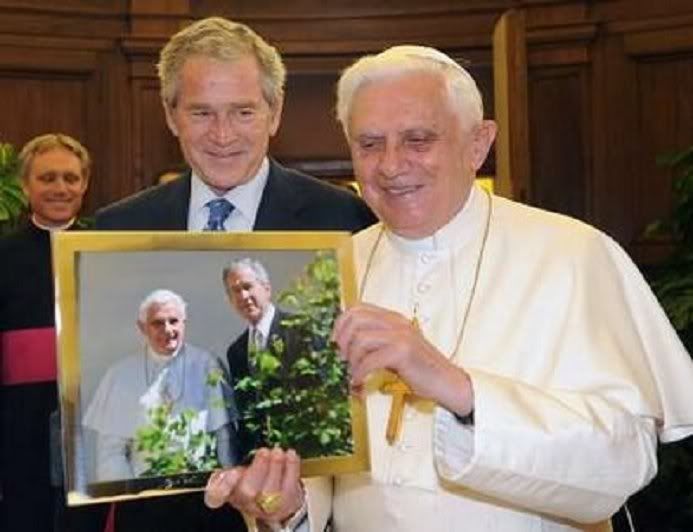
The President also gave the Pope a large album containing many of the pictures taken during his White House visit.
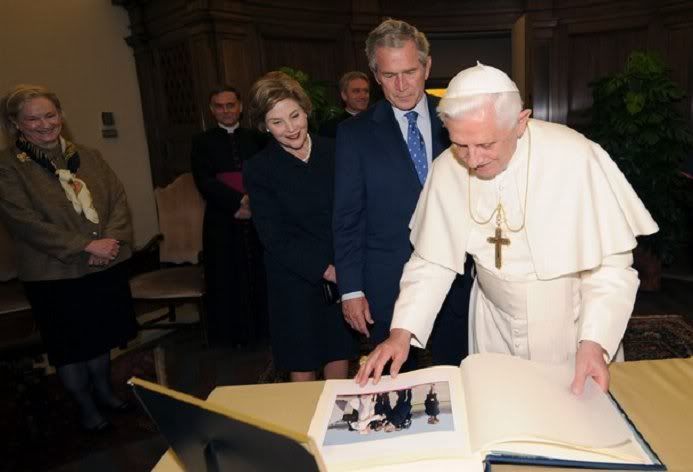
The most unusual event of the morning was the leisurely stroll the two men took side by side along a winding road lined with trees, manicured lawns, ivy-covered walls, trickling fountains and colorful flower beds.
The walk was scheduled for 20 minutes, but after just eight minutes they arrived at their destination of the grotto of Our Lady of Lourdes where they were joined by Bush's wife and the Vatican's secretary of state, Cardinal Tarcisio Bertone.
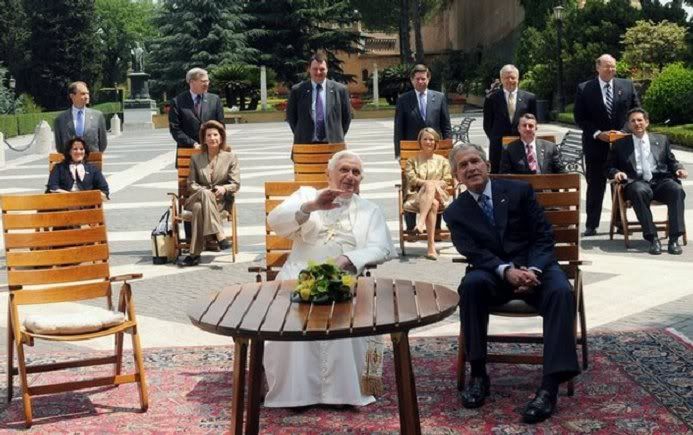
After greeting the presidential entourage, the Pope and the President sat on cushioned wooden deck chairs to listen to a brief choral performance by the Sistine Chapel Choir.
Just before the 30 boys and 20 men sang two hymns a cappella, a flock of parrots flew overhead and squawked loudly as the Pope pointed them out to the President.
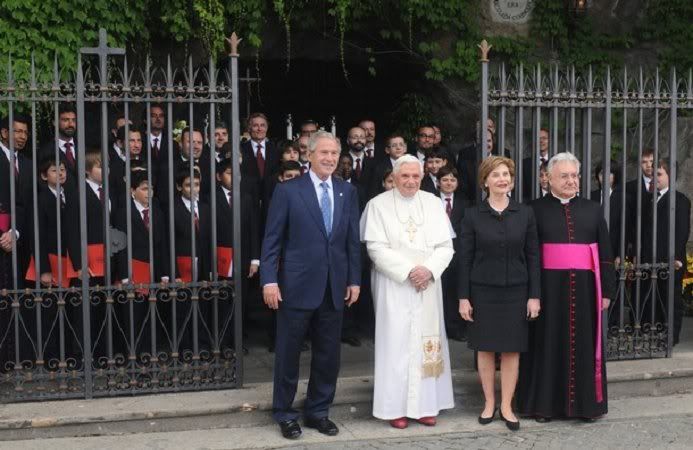 The Holy Father, the Bushes, and Mons. Liberto, director of the Sistine Chapel Chowir, with the choir members in the background.
The Holy Father, the Bushes, and Mons. Liberto, director of the Sistine Chapel Chowir, with the choir members in the background.
Bush and Pope Benedict have met three times in a little more than one year and Glendon said, "There is no doubt that these two men have formed a deep personal friendship."
She said Bush regards the Pope as the greatest spiritual leader in the world and admires the Pope for upholding the truth in the face of a rampant culture of relativism.
They have "a shared foundation of spiritual and moral views that colors the way they discuss political issues," she said, and this is "a living example of what the Pope means when he speaks about positive secularism."
"It is a living example of the fact that democracy and Christianity are good for each other," she said.
Though Pope Benedict and Bush agree on several issues, they differ on such issues as the war in Iraq and the death penalty.
[Modificato da TERESA BENEDETTA 13/06/2008 23:04] |
 14/06/2008 05:57 14/06/2008 05:57 |
|
| | | OFFLINE | Post: 401 | Registrato il: 24/11/2005
| Utente Senior | |
|
Thanks for posting a great set of pics and articles. I especially like this one:

|
 14/06/2008 06:35 14/06/2008 06:35 |
|
| | | OFFLINE | | Post: 13.921 | Registrato il: 28/08/2005
| Utente Gold | |
|
  The Vatican continues to show how much George W. Bush appears to have found favor with Benedict XVI. The extraordinary audience given to him by the Pope yesterday was L'Osservatore Romano's top story for today - although the headline itself says it was an 'informal' encounter...and then the phrase 'in the sign of friendship'.
The Vatican continues to show how much George W. Bush appears to have found favor with Benedict XVI. The extraordinary audience given to him by the Pope yesterday was L'Osservatore Romano's top story for today - although the headline itself says it was an 'informal' encounter...and then the phrase 'in the sign of friendship'.
IMHO, Bush's unrelenting critics over Iraq and other issues should step back a bit and consider why a man of Benedict's acute intelligence and instincts would opt to show in such extraordinary ways his friendship and support for a man many people have already consigned to the dustbin of history! It surely goes far beyond returning Bush's gestures when the Pope was in the USA!
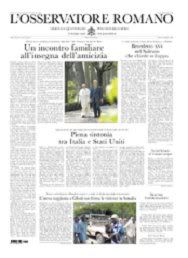
The Pope receives the President of the United States in audience:
'An informal encounter in a sign of friendship'
Other Page 1 stories: The papal visit to Leuca and Brindisi - Italy's Salento region in need
of development; Bush meetings with Italian leaders show full harmony on international goals;
Ireland votes down prposed European Constitution; Djibouti agreement fails to halt violence
in Somalia.
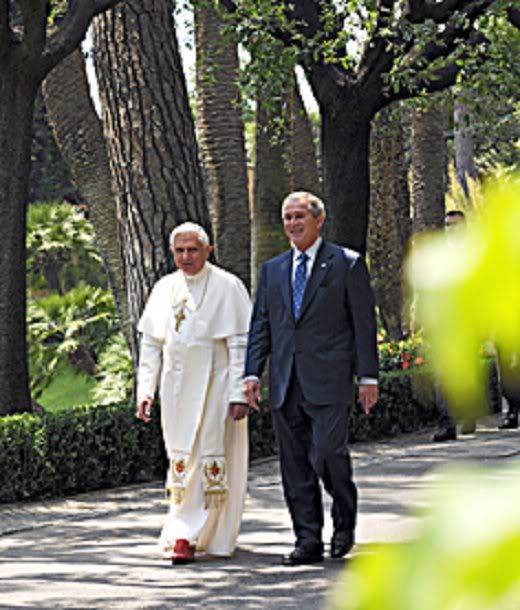
=====================================================================
I resisted translating any of the Italian newspaper stories yesterday speculating that George W. Bush may 'do a Tony Blair' and convert to Catholicism after he leaves office, because I think it is sheer speculation and has nothing to do with the relationship between the Pope and the President. Blair was definitely turning Catholic at the time of his last meeting with the Pope, his wife is Catholic, and their children have been raised Catholics, but that did not earn him any 'special' treatment from the Vatican.
But trust the UK correspondents in Rome to pick up the chaff from the Italian press and try to sell it. Here is Malcolm Moore....
George W Bush meets Pope
amid claims he might convert
to Catholicism
By Malcolm Moore in Rome

June 13, 2008
George W Bush and Pope Benedict XVI have held an intimate meeting in Rome as rumours mounted in Italy that the president may follow in Tony Blair's footsteps and convert to Catholicism.
The two men spoke for half an hour in the 12th century Tower of St John, a private area in the Vatican gardens which is used by the Pope for private reflection.
The usual protocol for heads-of-state is a meeting in the Pope's library in the Apostolic Palace, but a spokesman for the Vatican said Benedict wanted to reward ['repay' was the word used!] Mr Bush for the "warmth" of his reception at the White House earlier this year.
The two men have grown increasingly close in the past two years, and Mr Bush was overheard whispering: "What an honour, what an honour, what an honour!" as he ascended the steps to the tower.
After a stroll through the Vatican gardens, the men listened to a recital by the choir of the Sistine Chapel. However, Mr Bush did not, as expected, kneel in prayer before the Grotto of the Madonna of Lourdes. It was thought that he may have prayed with the Pope in private. Mr Bush prayed with Benedict in the Oval Office during the Papal visit to the US in April.
Several Italian newspapers cited Vatican sources suggesting that Mr Bush may be prepared to convert. One source told Il Foglio, an authoritative newspaper, that "Anything is possible, especially for a born-again Christian such as Bush."
He added that while the Holy See deplored the war in Iraq, "on ethical matters he has always had a line that is practically identical to that of the Vatican."
Mr Bush has spoken out against gay marriage, abortion and stem cell research. He has proposed amending the US constitution to "fully protect marriage" as the "union of man and woman as husband and wife".
He has repeatedly made clear his admiration for Benedict and has even claimed to have read some of the Pope's theological books.
A source close to the Vatican said that Mr Bush was the most "Catholic-minded" president since John F Kennedy, who famously played down his Catholicism. Mr Bush belongs to a Methodist church in Texas and prays at an Episcopal church in Washington.
However, George William Rutler, a New York-based priest who is close to the President, was quoted by the Washington Post earlier this year saying that Mr Bush "is not unaware of how evangelism, by comparison with Catholicism, may seem more limited both theologically and historically".
Mr Bush has filled the White House with Catholic speech-writers and consultants and is also thought to have asked a Catholic priest to bless the West Wing.
Before Bush became President, Karl Rove, his former political adviser, invited Catholic intellectuals to Texas to lecture the candidate on the Church's teachings. Mr Bush appointed the Catholic judges Samuel Alito and John Roberts to the Supreme Court.
However, it is thought unlikely that Mr Bush would convert until after he has left office. Jeb Bush, the president's brother, has already converted to Catholicism. [He did so when he married his Mexican wife almsot 30 years ago!]
Catholics have noted that during the contested election in 2000, Jeb Bush travelled to Mexico and prayed to the icon of Our Lady of Guadalupe. His brother's victory was announced by the Supreme Court on December 12, the feast day of the Lady of Guadalupe. [Interesting side note!]
And here's Richard Owen with an earlier story:
President Bush 'honored'
by Vatican welcome
by Richard Owen, in Rome

June 13, 2008
President Bush arrived at the Vatican this morning to a welcome from Pope Benedict XVI so unusually cordial that it gave rise to speculation in the Italian press that Mr Bush might convert to Catholicism.
In an unprecedented move the pontiff met Mr Bush for their final encounter not in the papal library, as is usual under normally strict Vatican protocol, but at St John's Tower, a restored medieval tower in the Vatican walls used to house the Vatican's VIP guests.
As he entered the tower with the Pope, Mr Bush repeatedly exclaimed, "This is such an honour, such an honour".
Mr Bush and the Pope held talks for half an hour, after which they gave each other photographs commemorating the Pope's visit to the White House in April, leading Laura Bush to laugh and exclaim, "We're giving the same things!"
Earlier, Mrs Bush greeted the Pope by saying, "How are you, so good to see you, you look great." Mr Bush alternately addressed the Pope as "Your Holiness" and "Sir" observing "You've got a beautiful place here."
As Mr Bush and the Pope posed for photographs flanked by Mrs Bush and Mary Ann Glendon, the US Ambassador to the Holy See, Mr Bush joked to the Pontiff, "We are surrounded by impressive women."
A communique issued by the Vatican said that Mr Bush and the Pope discussed US-European relations, the Middle East and peace efforts in the Holy Land, and globalisation and the world food crisis.
The talks were followed by a stroll around the Vatican gardens and a performance by the Sistine Chapel choir of two motets, one by Palestrina and the other a modern composition by the choir's conductor, Giuseppe Liberto.
In another unusual gesture the Vatican distributed to journalists a minute-by-minute programme with a cover photograph of St John's Tower and the Vatican gardens, to underline the exceptional nature of the visit. Mr Bush arrived in a convoy of some 50 vehicles, accompanied by his wife Laura and Mrs Glendon.
The Vatican said that the Pope simply wanted to show his appreciation for the hospitality he was shown on a recent visit to the US. However Marco Politi, the veteran Vatican correspondent of La Repubblica, said that Mr Bush's unstinting admiration for the Pope had given rise to talk of the President's possible conversion, by analogy with Tony Blair. Mr Bush is a Methodist and a "born again" evangelical Christian.
Vatican sources said that no conversion process was under way, and could in any case only take place — as in the case of Mr Blair — once Mr Bush had left office.
They said that the rumours appeared to arise in part from remarks by Nancy Brinker, the White House head of protocol, who had said that Mr Bush was "a huge fan of this Pope", had "total respect" for the pontiff and "totally supported" him.
However both Vatican and US officials said that this referred to the fact that despite their differences on Iraq and the Middle East, Mr Bush and Pope Benedict saw eye to eye on the need to defend Christian values in the West and on specific issues such as abortion, gay marriage and stem cell research as well as poverty in Africa.
Corriere della Sera noted that differences between the Vatican and Washington over Iraq now "lie in the past", with the Pope's concerns focused more on Iraq's transition to democracy and the plight of Christians in Iraq and the Arab world.
After his Vatican visit Mr Bush flies to Paris, where he will outline a vision of transatlantic unity which he hopes his successor next January will fulfil.
"I see a commitment to a powerful and purposeful Europe that advances the values of liberty within its borders and beyond," Mr Bush will say in a speech in Paris. "And when the time comes to welcome a new American President next January, I will be pleased to report to him that the relationship between the United States and Europe is the broadest and most vibrant it has ever been."
He will add, according to the White House: "We must go forward with unity ... Dividing democracies is one of our enemies' goals and they must not be allowed to succeed."
The Independent chimes in the day after:
Bush 'may convert to Catholicism'
By Peter Popham in Rome

Saturday, 14 June 2008
President George Bush was given such a splendid welcome by Pope Benedict XVI yesterday that rumours started flying that the President, like Tony Blair before him, was on the verge of converting to Catholicism.
It was a Vatican visit such as no other head of state has ever enjoyed. Instead of greeting him, like all previous high-ranking visitors, in the papal library of the Apostolic Palace, the Pope took Mr Bush round the medieval St John's Tower then gave him a tour of the Vatican gardens, culminating in a brief open-air concert by the Sistine Chapel Choir.
The Pope waited for the President at the entrance of the tower. As he arrived, the President was overheard gushing "What an honour" as the two men disappeared for a half-hour tête-à-tête, details of which have not been made public.
The special reception was seen as a return of favours for the magnificent party thrown for the Pope two months ago when he turned 81 during his US tour, attended by up to 9,000 guests. But yesterday the Vatican was seething at rumours that there was much more to it than protocol: George Bush,lifelong Methodist, was about to convert.
The notion was given extra mileage by the fact that the President's brother Jeb, the former governor of Florida, converted to Catholicism on marrying his wife Columba, a Mexican.
The Vatican differs from the White House on immigration and the death penalty but on other issues including stem cell research, gay marriage and abortion there has been, as the Catholic daily L'Avvenire put it, "total harmony."
Cardinal Pio Laghi, the papal envoy to the White House, said: "Bush believes in the values of the Church and his brother is a convert."
=====================================================================
At least one US newspaper today carried the coNVersion rumor, and even reported a couple of reactions to it:
Italians speculate Bush to convert
by John Phillips

Saturday, June 14, 2008
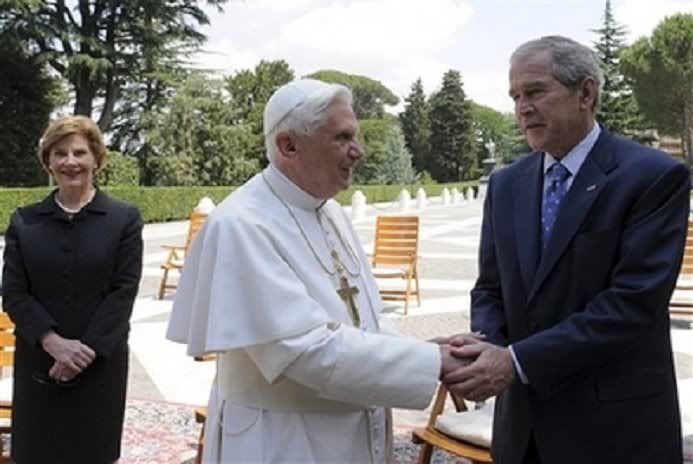
ROME - President Bush received an unprecedented welcome Friday from Pope Benedict XVI in the tranquil Vatican Gardens in a break with protocol that fueled speculation in Italian newspapers that the U.S. leader may be considering converting to Roman Catholicism.
"Such an honor, such an honor," Mr. Bush said to the pontiff as Benedict strolled with him past the bubbling fountains and imposing trees of the gardens that are rarely seen by anyone other than the Pope's close entourage in his tiny sovereign state.
The manicured park is traditionally where popes take time off to meditate and recover from the rigors of Vatican diplomacy.
The two men had 30 minutes of talks in the medieval St. John's Tower before standing on a terrace under a scorching sun to admire the view of the 108 acres making up the Holy See and listening to a performance by the Sistine Chapel choir while sitting on lawn chairs.
Popes normally receive visiting heads of state in the pontiff's imposing library in the Apostolic Palace next to St Peter's Basilica, but Benedict wanted to return the special hospitality he had received at the White House on his 81st birthday during his sojourn in the United States in April, Vatican sources said.
The stopover in the Vatican was one of the most agreeable during Mr. Bush's farewell European tour that later took him to France on Friday and may have been the most significant part of his trip for him personally, according to Italian commentators.
"The rosy legend of a possible conversion of Bush to Catholicism has started to circulate," wrote Marco Politi, the respected Vatican correspondent of La Repubblica newspaper, noting that the president's brother Jeb converted to Roman Catholicism as has former British Prime Minister Tony Blair.
La Repubblica headlined its report "The mystery of the conversion during the visit to the Pope."
The leading Corriere della Sera of Milan newspaper noted that the apostolic nuncio, or the Vatican's ambassador, in Washington, Pietro Sambi, may have hinted at a possible conversion when talking about the conversations the Pope held with Mr. Bush in the United States in April.
The conversation "was of a private nature," the nuncio had said, "we know what the parties made public, without being able to exclude that other themes were broached."
In Washington, the White House called reports on Mr. Bush's plan for a conversion "baseless speculation."
"There's nothing to those rumors," spokesman Tony Fratto said Friday.
Father Richard John Neuhaus, a prominent Catholic priest who runs the monthly magazine First Things and has been consulted by Mr. Bush, also discounted the reports. "I'd be very surprised," he said.
A Vatican statement said Friday the Pope and Mr. Bush discussed the "defense of fundamental moral values" as well as the Middle East and a commitment to peace in the Holy Land, globalization and the world food crisis.
Differences remain between the Holy See and Washington, for instance on the death penalty and U.S. policy toward Cuba, but Benedict evidently feels closer to Mr. Bush than his predecessor, Polish-born Pope John Paul II, who strongly opposed the invasion of Iraq.
Many Vatican diplomats now see a continued U.S. military presence in Iraq as essential to protect the Christian minority in Iraq who might otherwise be wiped out, Vatican sources say. [As if there were any sensible realistic choice at this point!]
[Modificato da TERESA BENEDETTA 15/06/2008 16:30] |
 14/06/2008 06:35 14/06/2008 06:35 |
|
| | | OFFLINE | | Post: 13.922 | Registrato il: 28/08/2005
| Utente Gold | |
|
  PASTORAL VISIT TO LEUCA AND BRINDISI, June 14-15, 2008
PASTORAL VISIT TO LEUCA AND BRINDISI, June 14-15, 2008
   PUGLIA IS READY FOR THE POPE'S EMBRACE
I - SANTA MARIA DI LEUCA
PUGLIA IS READY FOR THE POPE'S EMBRACE
I - SANTA MARIA DI LEUCA
Under the Virgin's loving look
by LUIGI RUSSO
Translated from
the 6/13/08 issue of

LECCE - Its geographic position makes it an ideal doorway to the Orient. Which today means openness 'to dialog with all the religions of the Mediterranean'.
Since 1989, Mons. Giuseppe Stendardo has been the parish priest and rector of the Marian shrine at Leuca. Saturday afternoon, he will welcome the Pope to the Basilica.
Benedict XVI will be arriving along the Cristoforo Colombo seaside boulevard after landing by helicopter at Punto Ristola, the southernmost tip of Italy.

 
 
"Our sanctuary," says Mons. Stendardo, has a great and long history. We have testimony that Marian devotion began here as early as 43 A.D., although it was not consecrated as such until 3443 by Pope Julius I."
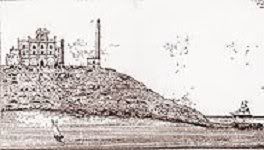 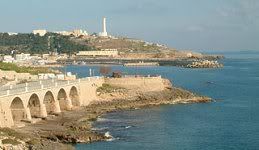 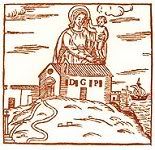
The Basilica is located on an ancient temple to the goddess Minerva. The transformation, according to tradition, followed St. Peter's passage through Leuca, where he is believed to have first stopped over on his way to Rome from Jerusalem.
Thus, a stone tablet now embedded in one of the basilica's doorways says: "The worship of idols having been banished from this temple by the divine Peter, his disciples dedicated it in the year 43 to the Virgin Mother of God to whom the Angel made the Annunciation. In the year 59, it was designated an episcopal see."
The Shrine of Santa Maria de Finibus Terrae is the heart of Benedict XVI's visit to the diocese of Ugento-Santa Maria di Leuca, an event that has been the object of much attentive preparation and participation.
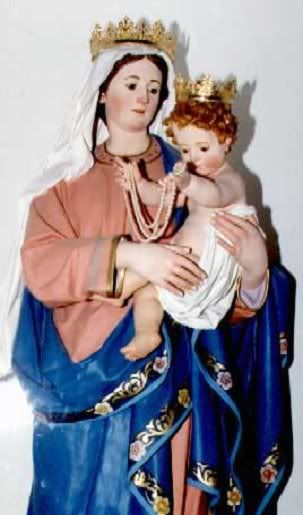 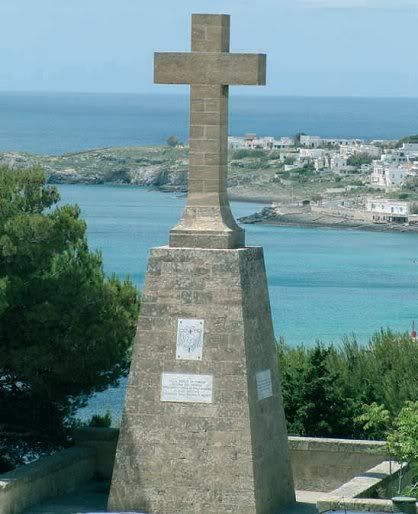
"We have distributed the prayer to the Virgin Mary drawn from the encyclical Spe salvi, and this has accompanied the pilgrimage of the image of Our Lady from February 17 to the middle of May in all 43 parishes of the diocese. There has been great participation everywhere not only in welcoming the image but also in the prayer vigils and catecheses held in connection with its pilgrimage," says Mons. Stendardo - proof, he says, of the great devotion to Mary in the region.
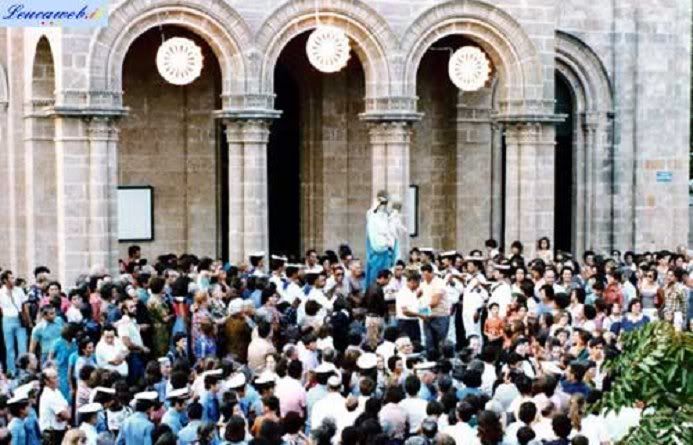 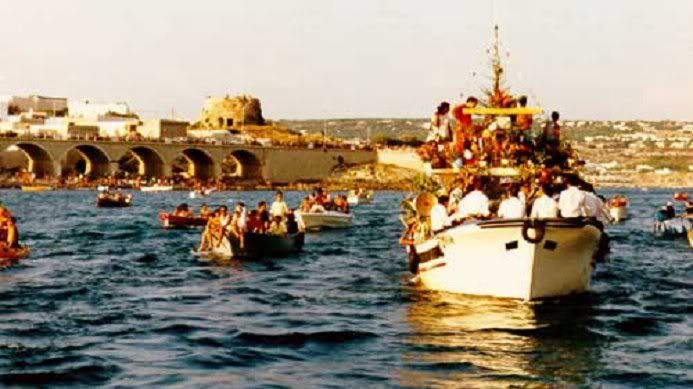
"Although we are quite remote, being at the extreme end of the 'boot'," he adds, "most of the tourists who come to Puglia come to this shrine. Just on the basis of the tourist buses that in the parking lot adjoining the shrine, we have calculated that more than a million pilgrims visit us each year. Not only from Italy but all of Europe."
Preparation for the Pope's visit had an aspect that is cultural and , he notes. At the diocesan level, there was a cycle of lectures on the magisterium of Benedict XVI focused on his two encyclicals and his recent discourses on the social and civilian problems of our time.
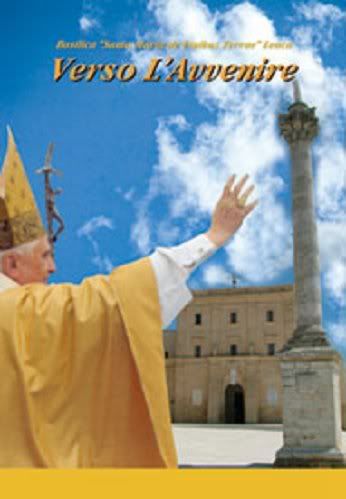 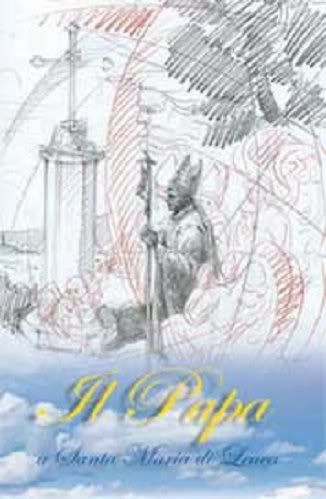 Diocesan publications for the visit.
Diocesan publications for the visit.
"The Holy Father will find," says Mons. Stendardo, "a diocese that is enthusiastic, who finds in his words the guidance and the courage to help the live the realities of today in the light of the Gospel. His visit will certainly reinforce the renewal of the Holy Spirit which has been evident in our communities. I think this will consolidate our faithful in the apostolic tradition, of which the Pope is the highest symbol."
LEUCA TO GREET THE POPE WITH
A HUNDRED THOUSAND FLOWERS
by Antonio Della Rocca
Translated from
Corriere del Mezzogiorno
June 13, 2008
And olive branches. Which they have chosen for two reasons - it's the plant that best represents the Salento peninsula [the 'heel' of the Italian boot], as well as that which was most associated with the earthly passage of Jesus Christ.
A stylized olive branch will also be on the chasuble that Benedict XVI will wear for the Mass, created by stylist Pino Cordella of Lecce. Even the chalice will be of olive wood, created for the occasion by Salentini artists Marco Simone and Niki Corrado.
And the hundred thousand flowers, all white - carnations, roses and gladioli - have been donated by the floriculturists of Taviano and Laverano. Landscape artist Piero Tunno will arrange them around the altar platform with appropriate greenery.
Pope Benedict XVI's visit to Leuca tomorrow afternoon will be an explosion of 'salentinita' in what the Bishop of the diocese says will nevertheless be a composed celebration befitting the Pope.
Mons. Vito De Grisantis says they expect at least 40,000 persons at the Holy Father's Mass in two sectors - one around the altar in front of the Basilica of Santa Maria de Finibus Terrae and a second one, in the streets leading from the tourist port and marina towards the shrine.
"We also expect people to greet the Holy Father from their windows as his motorcade passes through," said Mons. De Grisantis. "We encourage everyone to celebrate and express their joy for this visit."
The diocese has collected some 30,000 euros in the past few months to give to the Pope towards a hospitality center for Christian, Muslim and Jewish youths in the Holy Land.
The Pope is expected to arrive by helicopter at the military marina in Punto Ristola around 4:30 in the afternoon.
II- BRINDISI
Spiritual preparation since December
for the Pope's visit
by ANGELO SCONOSCIUTO
Translated from
the 6/13/08 issue of

BRINDISI - "In the words of the angel of the Lord to the shepherds of Bethlehem, I announce to you, with great joy, that His Holiness Benedict XVI will visit our Church of Brindisi-Ostuni".
As the Cathedral bells pealed in celebration at noontime on Christmas Eve 2007, Mons. Rocco Talucci made the official announcement of the Pope's visit which comes to pass tomorrow and Sunday.
"God is visiting our Church this way to give vigor to its synodal journey, so that we might continue with new impulse along the path of saintliness, and that we might grow in our mission "to illuminate all men by announcing the Gospel to every creature'," he said.
From December 24 onward, then, the diocesan spiritual preparation began alongside physical preparations by church and civilian authorities for a welcome worthy of the Vicar of Christ.
Brindisi had been looking forward to a Papal visit since 2000, when Mon. Talucci, shortly after he was installed as bishop, presented a formal request to the Secretariat of State. But John Paul II's health ultimately did not make it possible.
But Archbishop Talucci renewed the invitation after Benedict XVI was elected. He had occasion to speak to the Pope directly about it during the ad-limina visit of the bishops from Puglia. He recalls that they had discussed the generosity with which Brindisi had welcomed thousands of immigrants who had fled Eastern Europe, particularly Albania, for a better life.
The spiritual preparation has since taken the diocese through several stages marked by prayer vigils, community reflection on the Gospel and a study in depth of some aspects of the Pope's Magisterium.
The spiritual preparations were also linked strongly to the Feast of St. Peter's Chair, followed by the Lenten observance, and monthly Eucharistic adoration. The Diocesan Synod opened on Maundy Thursday.
Mons. Talucci's Easter message said: "The Successor of Peter, the Vicar of Christ today is Benedict XVI, who will be coming here as a bearer of hope: social hope to realize peace and justice, moral hope to build a civilization of love, spiritual hope for a renewal of life. This promise is concretized at Easter, in which we live and feel our hope, gift of the Resurrection, which has permeated history, resulting in those Christian roots that have generated spiritual goodness and social justice through the centuries, making the Church a conscience for the world, and the world a place in which to experience love."
The last phase of the spiritual preparation started June 5 in all the 60 parishes of the diocese leading up to the celebration of Pentecost, with parish discussions among the faithful on the encyclical Spe salvi.
Mons. Talucci says that beyond the Pope's visit, the Feast of Saints Peter and Paul on June 29 will mark yet another occasion for the diocese of Brindisi to manifest its spiritual closeness to the Successor of Peter.
In Brindisi, major concern
for Papal security
by Marcello Orlandisi
Translated from
Corriere del Mezzogiorno
June 13, 2008
BRINDISI - Since September 11, 2001, the port of Brindisi has been one of those strategic areas under constant and special surveillance.
And when a Pope sets foot here tomorrow for the first time in a thousand years, the threshold of vigilance is set very high indeed. Especially since the Pope will be speaking from the port area on the sea, which is so much a part of the Christian history of this city.
One gathers that at least 700-800 security personnel of the first line will be keeping an eye along the Pope's routes and critical areas.
Starting Saturday at 8 pm - the helicopter landing area on Via Spalato, the route to he Piazza Lenio Flacco for the formal welcome, and the area around the Cathedral and the Bishop's palace. Then Sunday, the area of Sant'Apollinare where the Mass will be celebrated, followed by the noonday Angelus. As well as all the crossings and bridges approaching Brindisi, the port basins and the docks.
The same number of men and women will be deployed as emergency and first aid personnel, including firemen, civil protection and hospital units. Six area hospitals are part of the emergency plan, and the entire security task force draws from local, provincial and regional policemen. Most of them will be operating in plain clothes. Selected squads of sharpshooters will be deployed on strategic rooftops along the Pope's route.
Motorboats of the police and coast guard will be patrolling the waters up to two miles offshore, and the port itself will be closed from Friday midnight till 6 p.m. on Sunday, after the Pope will have left Brindisi.
Starting Friday, security squads specializing in sea and land operations were to be deployed. The Aeronautics Corps of the Italian armed forces is in charge of securing landing zones, while the Army will be in charge of perimeter security.
[Modificato da TERESA BENEDETTA 14/06/2008 13:08] |
 14/06/2008 14:53 14/06/2008 14:53 |
|
| | | OFFLINE | | Post: 13.925 | Registrato il: 28/08/2005
| Utente Gold | |
|
  THE POPE'S DAY
THE POPE'S DAY
At noon today, the Holy Father taped a video message for the 49th International Eucharistic Congress
opening in Quebec City, Canada, tomorrow.
He starts his pastoral visit to the Salento region this afternoon.
 |
 14/06/2008 21:04 14/06/2008 21:04 |
|
| | | OFFLINE | | Post: 13.929 | Registrato il: 28/08/2005
| Utente Gold | |
|
  PASTORAL VISIT TO LEUCA AND BRINDISI, June 14-15, 2008
PASTORAL VISIT TO LEUCA AND BRINDISI, June 14-15, 2008
  
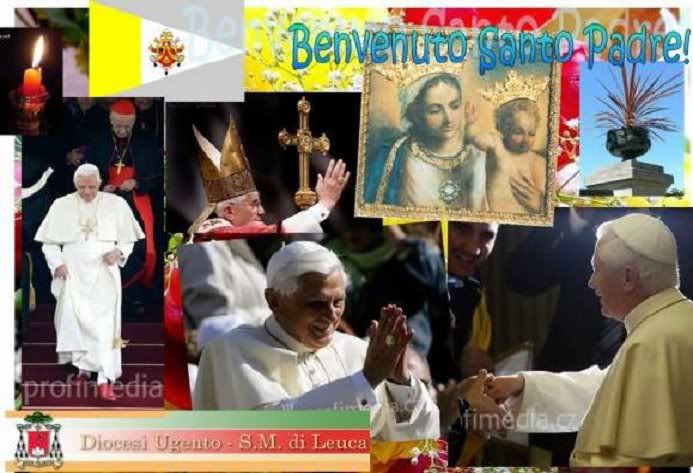 The pastoral visit to Santa Maria di Leuca and Brindisi:
The pastoral visit to Santa Maria di Leuca and Brindisi:
Benedict XVI in the Salento region,
an area that needs development
Editorial signed by
Carlo di Cicco, Deputy Editor
Translated from
the 6/14/08 issue of

Benedict XVI is going back to Puglia. A short visit which brings back memories of the first one - to Bari on May 29, 2005, a few weeks after he became Pope.
Then, it was to close the National Eucharistic Congress, and it was the new Pope's first opportunity to address the Church of Italy [of which he is the Primate], during which he indicated some directions that his Petrine ministry would take - in favor of ecumenism, listening to the Oriental and Orthodox churches, and dialog with present-day culture.
The visit this time to Santa Maria di Leuca and to Brindisi is a return to those themes in the context of the two local churches, which are both distinguished by a strong pastoral commitment in the face of social crisis.
The Salento region is undergoing specific difficulties linked to the underdevelopment of southern Italy. Jutting out into the Mediterranean, its most attentive inhabitants like to point out that it is like a bridge linking East and West, through which passed, in remote times, pilgrims going to and from the Holy Land, coming from all of Europe, as well as new people who came to Italy with new hopes and new ideas in a context of integration and reciprocal respect.
In fact, it was in Leuca, according to tradition, that the Apostle Peter first set foot in Italy at the dawn of Christianity in Europe. Perhaps it was for this reason that Pope Benedict XVI, before proceeding to Brindisi, which was originally the only city on the itinerary, welcomed the invitation to visit the Shrine of Santa Maria de Finibus Terrae in Leuca, which he visits today as the Successor of Peter.
Benedict XVI arrives in a region in which the regional society adn economy are in great difficulty not only because of present worldwide conditions, but as noted by the two bishops concerned - those of the dioceses of Brindisi-Ostuni and of Ugento-Santa Maria di Leuca - also because of historical disadvantages that have not been overcome.
In this context, the provincial council of Lecce recently approved unanimously a resolution of greeting and welcome for the Holy Father, "a sign," says provincial president Giovanni Pellegrino, "of respect as well as of a common interest to construct around the Pope's visit an unequivocal and strong sentiment of fraternal solidarity."
"The Salento region," Pellegrino adds, "is a land of hospitality, not only with its tourist structures, but also, many facilities designed to welcome migrants fleeing their countries. It is a land that has given the best of itself when in recent years, it opened its doors to men, women and children coming from Albania and other Eastern European countries, to the point where it was nominated for the Nobel Peace Prize. That is why in the Salento, the different foreign communities that are present in the region are assimilating without particular problems - in an atmosphere if tolerance, respect and profitable coexistence.".
While the diocese of Brindisi which the Pope is visiting Sunday is now aiming for renewal in the light of its diocesan synod, the diocese of Ugento does not forget that it is also the land of Don Tonino Bello, the bishop who was a friend of the poor, and was president of Pax Christi. He has left these parishes a profound and unforgettable legacy that has now led to the opening of his beatification process on the diocesan level.
[Modificato da TERESA BENEDETTA 15/06/2008 03:02] |
 14/06/2008 21:09 14/06/2008 21:09 |
|
| | | OFFLINE | | Post: 13.930 | Registrato il: 28/08/2005
| Utente Gold | |
|
  PASTORAL VISIT TO LEUCA AND BRINDISI, June 14-15, 2008
PASTORAL VISIT TO LEUCA AND BRINDISI, June 14-15, 2008
  
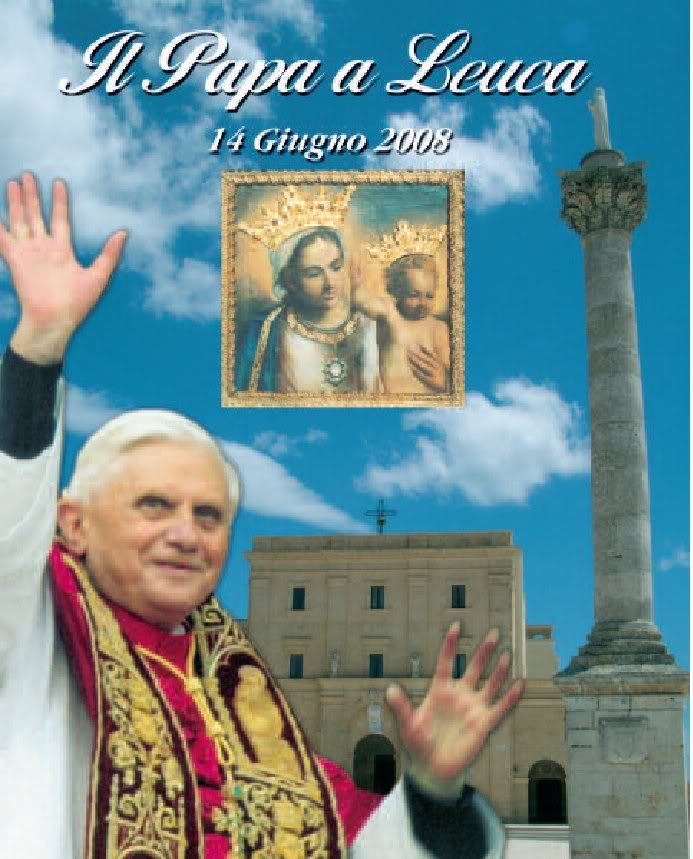 BENEDICT XVI ARRIVES IN THE SALENTO
Many thanks to Caterina in the main forum, whose videocaps show many aspects of the event not seen in the usual newsphotos.
BENEDICT XVI ARRIVES IN THE SALENTO
Many thanks to Caterina in the main forum, whose videocaps show many aspects of the event not seen in the usual newsphotos.
The Holy Father has reached the Salento from Rome. From Galatina airport, he took the helicopter to Punta Ristola, then the Popemobile to the Shrine of Santa Maria de Finibus Terrae in Leuca, to say Mass.
16.50 Benedict XVI takes a helicopter of the Italian Aeronautics force to Santa Maria di Leuca.
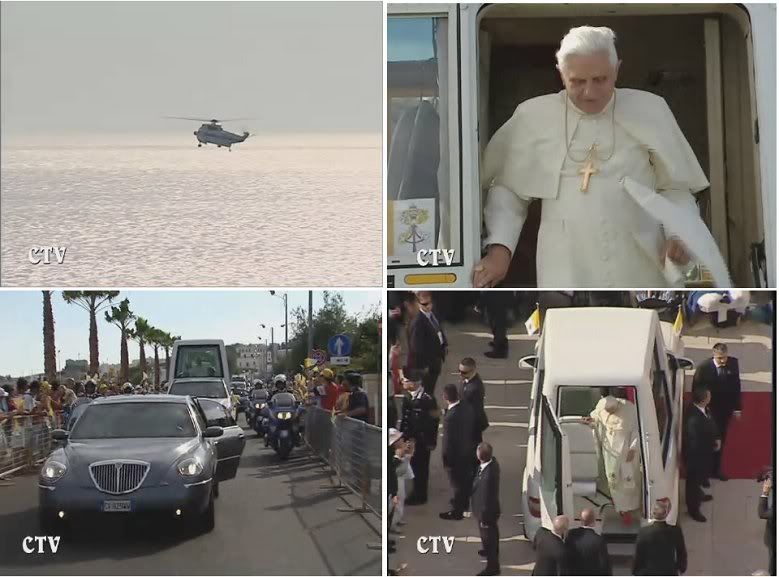
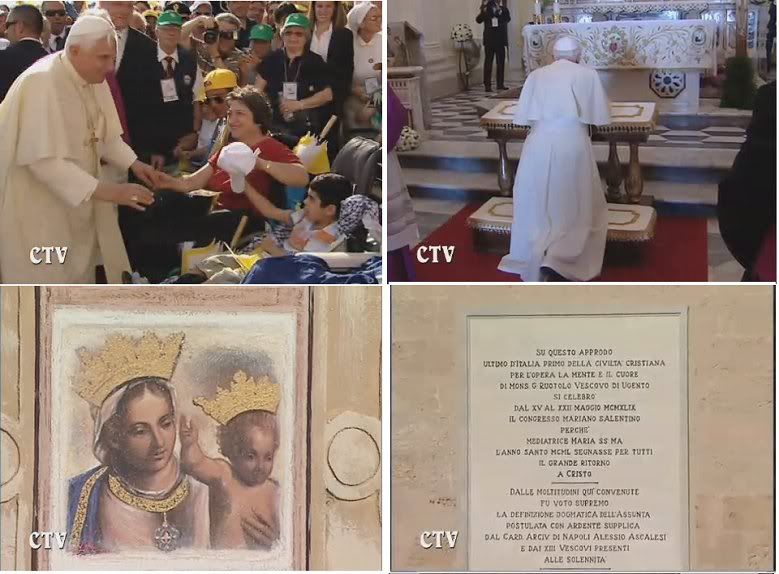
17.12 He lands in Punta Ristola, where he is welcomed by Mons. Vito De Grisantis, Bishop of Ugento-Santa Maria di Leuca, and civilian authorities led by Regional Governor Nichi Vendola.
17.18 Start of the Popemobile motorcade along the Cristoforo Colombo seaside boulevard to the square in front of the Basilica of Santa Maria de Finibus Terrae. Thousands line the route to greet the Pope.
17.26 The Popemobile reaches the Tourist Port of Santa Maria di Leuca, where he greets some 20,000 faithful, mostly young people coming from all parts of the Salento region. The Popemobile tours within the crowd then goes back to the seaside boulevard.
17.35 The Pope reaches the square of the Basilica. First, he greets a group of sick and handicapped people, then enters the Basilica where he is welcomed by the clergy of Puglia and institutional representatives. He spends some moments in prayer before the image of the Madonna.
Outside, including the 5,000 that could be accommodated in the square, more than 50,000 people had gathered in the area around the adjoining lighthouse and down in the tourist port.
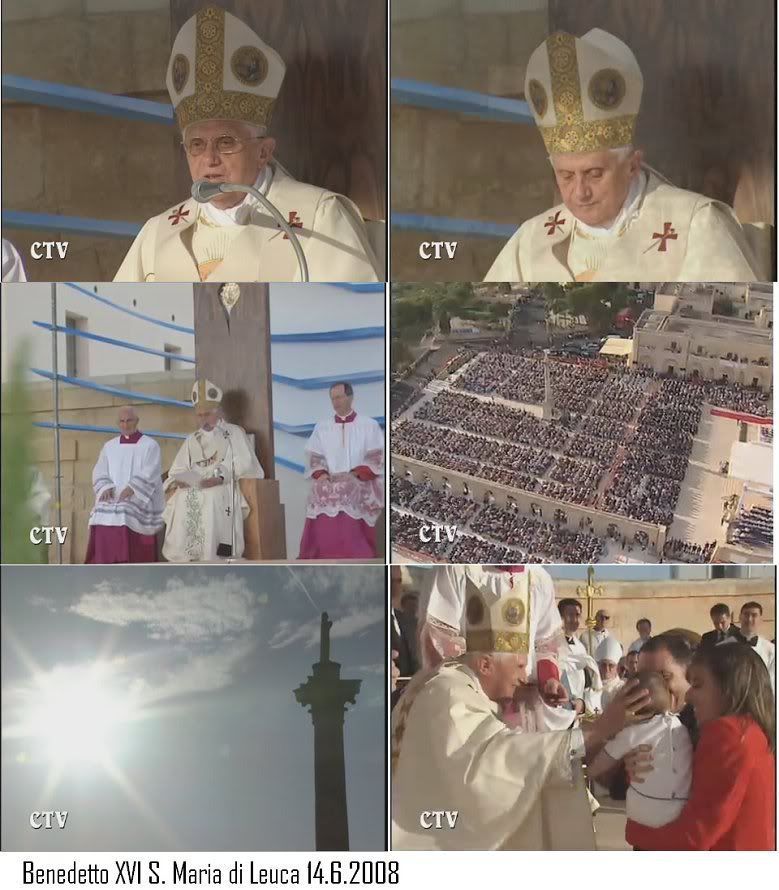
17.55 The Pope emerges from the Basilica and proceeds to the altar, greeted by a wave of applause. Mass begins.
17.58 Mons. De Grisantis welcomes the Pope. "Welcome, most blessed Father, with great pride from the Diocese of Ugento-Santa Maria di Leuca and the people of southern Salento.". He proceeds to speak about the problems of the youth and unemployment in the region.
18.03 Exchange of gifts. The Holy Father is presented with a framed image of the Basilica's patroness, and he presents the Diocese with a chalice to commemorate his visit.
20.00 Mass ends. The Pope gets back into the Popemobile and heads to Punta Ristola, where he takes the helicopter to Brindisi.
17 centuries after Julius I,
a Pope comes to southern Salento
by Titti Tummino

Benedict XVI is the 21st Pontiff to visit Puglia, but only the second after Julius I in 343, to set foot at this southern extremity of the Italian territory, although Papa Wojtyla visited the capital of the province, Lecce, in 1994.
Great expectation in this 'land's end', where hospitality and peace are the daily bread - the land which welcomed all those thousands of Albanian refugees, and from where the United Nations sends out humanitarian aid to parts of the world in need.
A truly historic visit, then, that has been prepared with diplomatic and organizational work for almost two years.
In the few hours before the Pope arrived, satellite trucks, including those of American and Arab TV networks, had set up their parabolic antennae in Leuca as in Brindisi. Palm fronds, olive, carob and pomegranate branches, splendid cream and white roses, adorn the routes of the Popemobile.
There will be no hitches. The union of truck transporters suspended their demonstrations for the duration of the Pope's visit. Repair crews have reinforced the stands for the maxi-screens affected by wind gales two nights ago.
Italian railways have confirmed enough additional trains to carry all pilgrims to and from Leuca and Brindisi. The national power company has completed the artistic illumination which will set off the architectural features of Brindisi for the Pope's nighttime arrival there, with special lighting for the Swabian Castle, the open area at Sant'Apollinare where the Pope will say Mass on Sunday, the Cathedral square, and the cloisters of the bishop's palace, where the Pope will spend the night.
Among the gifts to be given by the Diocese of Brindisi-Ostuni to the Pope are the liturgical garments for the Mass, executed in a specially woven fabric which incorporates the Christologic symbol of the Mystical Rose with two gryphons, mythical animals that are half lion-half eagle to symbolize the divine and human natures of Christ, as well as a gospel stand with a silver binder.
The city of Brindisi is presenting the Pope with a silver sculpture, and from the Brindisi Chamber of Commerce, a supply of vintage wine. A Salentine tailor is executing a special chasuble for the Pope, and a local shoemaker has fashioned for him a pair of ruby red moccasins in calfskin.
There have been no leaks as to the Pope's meals while he is here.
His first audience in Brindisi will be the young people gathered at Piazzale Lenio Flacco tonight.
[Modificato da TERESA BENEDETTA 16/06/2008 22:25] |
 14/06/2008 21:27 14/06/2008 21:27 |
|
| | | OFFLINE | | Post: 13.931 | Registrato il: 28/08/2005
| Utente Gold | |
|
  PASTORAL VISIT TO LEUCA AND BRINDISI, June 14-15, 2008
PASTORAL VISIT TO LEUCA AND BRINDISI, June 14-15, 2008
  
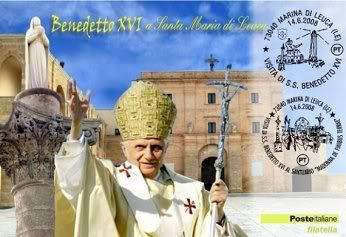
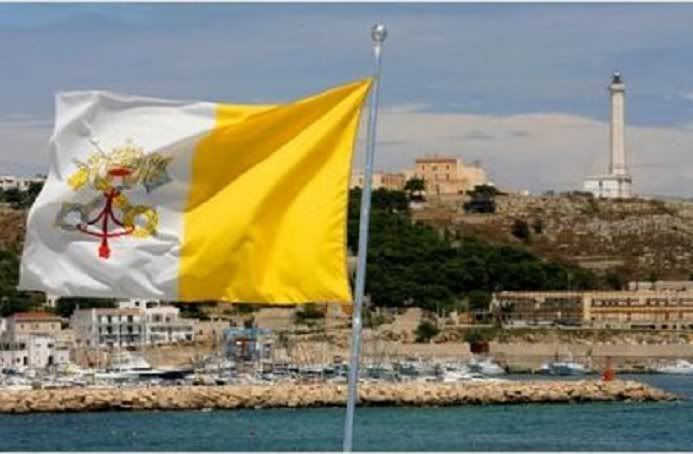
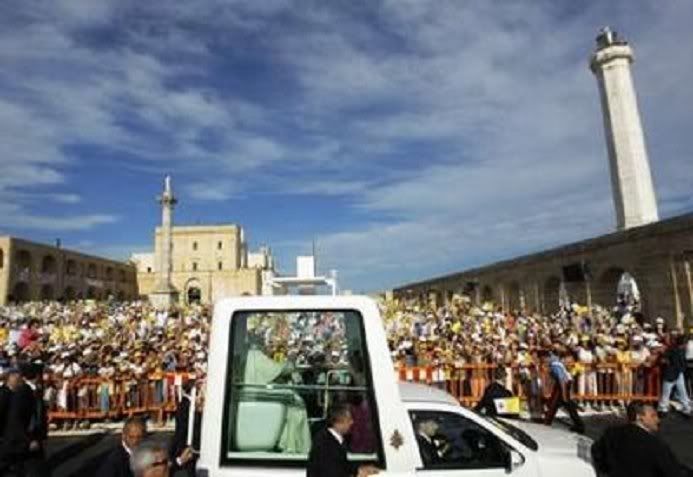 Pope begins two-day tour
Pope begins two-day tour
of impoverished southern Italy

SANTA MARIA DI LEUCA, Italy, June (AFP) - Pope Benedict XVI on Saturday praised the work of the Roman Catholic Church in southern Italy as he began a two-day visit to the impoverished Apulia region.
Tradition holds that it was here that Saint Peter, the disciple of Jesus considered the founder of the Christian Church, arrived from Palestine and headed to Rome to begin the evangelisation of Europe.
"This promontory between Europe and the Mediterranean, between West and East, reminds us that the Church has no borders, that it is universal," said the 81-year-old Pontiff.
Benedict also hailed the "generosity" of the port city of Brindisi that for years took in thousands of refugees from the former Yugoslavia and Albania.
The German-born Pope celebrated an open-air Mass attended by several thousand people under a hot sun at a sanctuary dedicated to the Virgin Mary overlooking the sea in this town at the tip of the heel of Italy's "boot."
"Here as in all of southern Italy, Church communities are places where the young generation can learn hope, not as a Utopia but as the tenacious confidence in the force of good," the Pope said.
"For the Church, geographical, cultural, ethnic and even religious borders are an invitation to evangelisation," he said.
Local bishop Vito De Grisantis, greeting the Pope, stressed the "need for rapid social, civil and economic development" in southern Italy, "especially to help families and young people for whom unemployment is an ever more serious problem."
The Pope replied: "In a context in which individualism is more and more encouraged ... the first service of the Church is to educate in the social sense, towards paying attention to those around you, to solidarity and sharing."
He added: "The Church can have a positive influence, especially on the social level," because it fosters "open and constructive human relationships, respectful of the service of the humblest and the weakest."
Later Saturday, at a vigil with young people in nearby Brindisi, the Pope warned against "the temptation of easy profits."
The Church and several humanitarian groups offered "refuge and help, despite the economic difficulties that continue to affect this region in particular," he said.
The Pontiff was set to celebrate another open-air mass in Brindisi on Sunday.
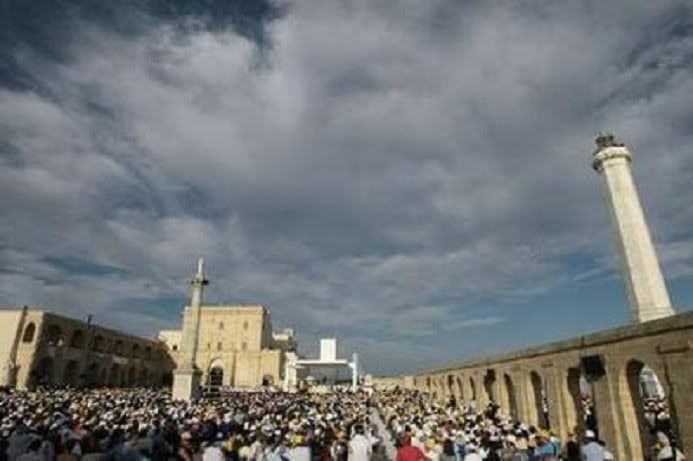
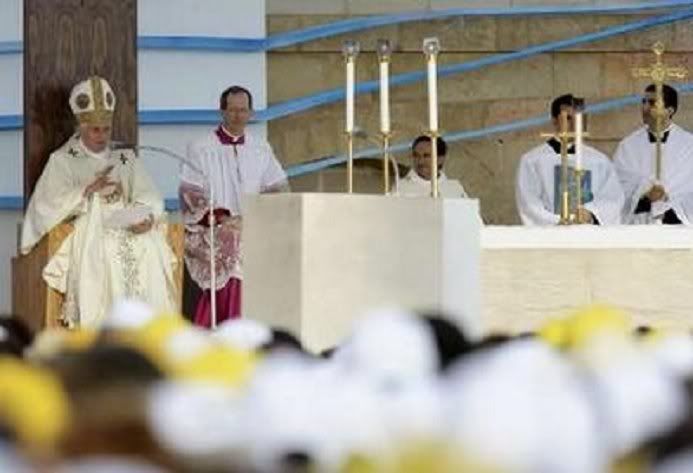
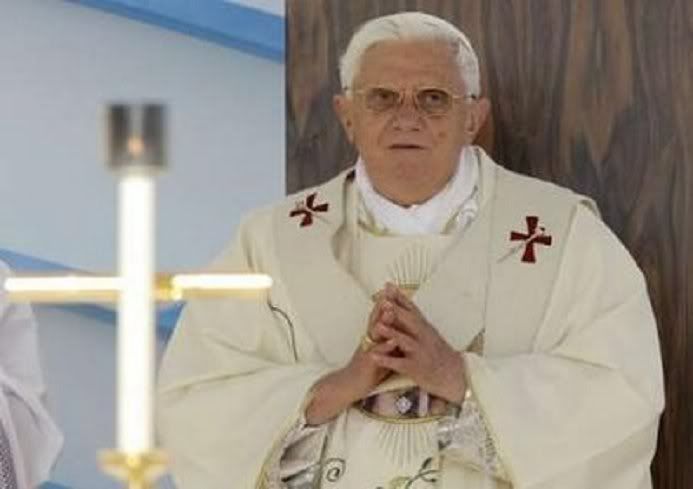
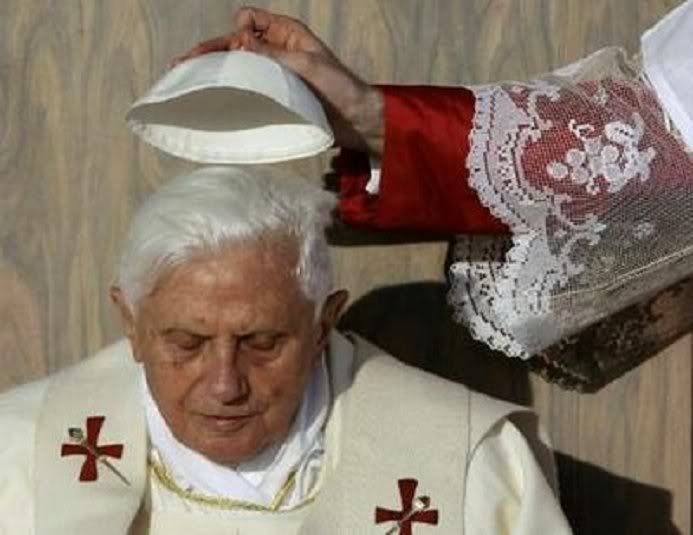
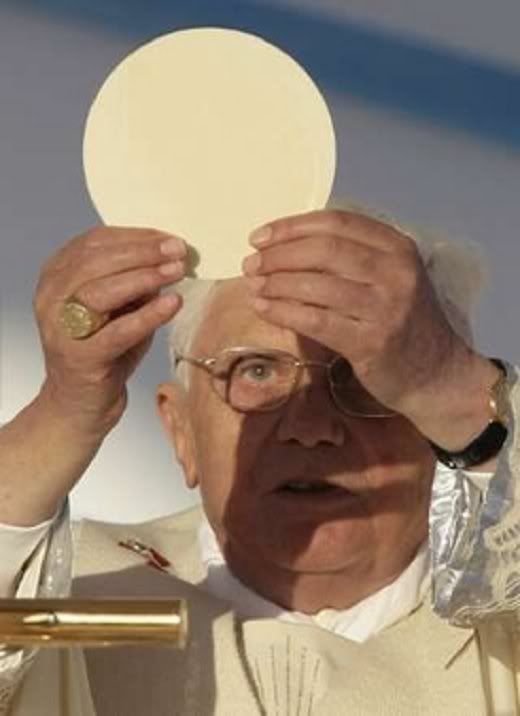 Pope says Church role in politics
Pope says Church role in politics
'for the good of all'
By Robin Pomeroy

SANTA MARIA DI LEUCA, Italy, June 14 (Reuters) - The Catholic Church has a vital role to play in shaping social policies but does not seek to usurp secular authorities, Pope Benedict said on Saturday.
In a homily to pilgrims in southern Italy, the Pope said the Church's role in politics -- where it often speaks out against abortion, gay marriage and embryo research -- was not intended to take the place of western secular ways of government.
"The Christian community cannot and does not want ever to substitute the legitimate and right competencies of institutions," the Pope told pilgrims at the start of a two-day visit to one of Italy's most economically depressed areas.
He spoke at an open-air Mass on a cliff 100 meters (330 feet) above the Mediterranean Sea at one of the southernmost points of the Italian mainland.
A day after strolling through the Vatican Gardens with U.S. President George W. Bush, with whom he sees eye-to-eye on many moral issues, the Pope said the Church had the role of "supporting (governments) in their work and always proposes cooperating with them for the good of all."
The Church often comes under fire from left-wing politicians in Italy, Spain and some other predominantly Catholic countries who accuse it of interfering in domestic affairs.
After the April election of a new conservative government, former foreign minister Massimo D'Alema warned the Church against succumbing to "the demoniacal temptation of seeking power" by forging a pact with new Prime Minister Silvio Berlusconi.
Benedict, wearing gold and cream vestments as he celebrated the Mass, said the Church's role in influencing policy-making was especially important in societies where individualism, rather than the common good, is championed.
"Good wins out," he said in his homily. "And, if at times it can seem to be defeated by bullying and cunning, in reality it continues to operate in silence and discretion, bearing fruit in the long term," he told the crowd of some 5,000 people who packed a small square.
Berlusconi himself has said his government is in favor of the Church. "The activity of the government can only please the Pope and his Church," he said earlier this month.
But Berlusconi's policies have not always coincided with the Vatican's views.
The Church has expressed concerns about a current government crackdown on immigration and Benedict's predecessor John Paul II was against the 2003 U.S.-led invasion of Iraq, which was supported by Berlusconi.
Among the local dignitaries to welcome the Pope to the seaside town of Santa Maria di Leuca was Nichi Vendola, an openly gay communist who is governor of Puglia, the "heel" of Italy.
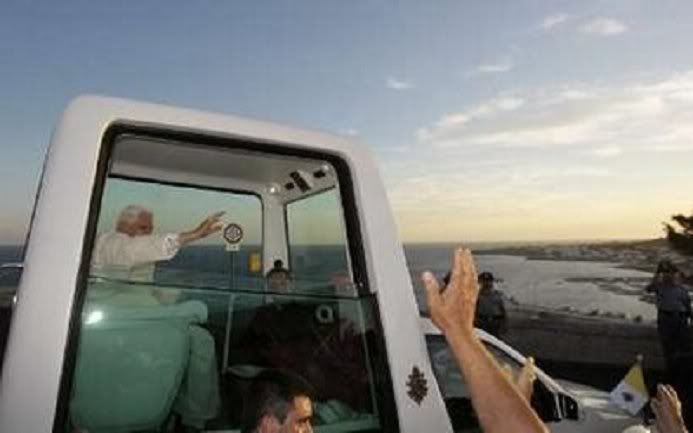 THE POPE IN LEUCA:
THE POPE IN LEUCA:
Evil will not win out
in southern Italy
Translated from

June 14, 2008
Benedetto XVI, nel piazzale del santuario di Santa Maria de finibus Terrae, affronta la condizione del Mezzogiorno e invita ad avere fiducia. Trascorrerà la notte a Brindisi • Si aspettano 100mila fedeli • In migliaia per la sicurezza
BARI - The Mass celebrated by Benedict XVI in front of the Basilica of Santa Maria de Finibus Terrae in Leuca, the extreme tip of the heel of the Italian 'boot', started with great applause and a greeting from the Bishop of Ugento-Santa Maria.
In his welcome remarks, Mons. Vito De Grisantis recalled a much-loved Salentine priest, Don Tonino Bello, who was bishop of Mofetta and president of Pax Christi. He died in 1993, and last April, the diocese opened a process for his beatification and eventual canonization.
The Pope's homily was warmly applauded several times as he spoke of present conditions in the Mezzogiorno [southern Italy] and exhorting them to have confidence.
He told them that even if, at times, 'goodness' appears to be 'overwhelmed by cunning', it "continues to function in silence and discretion, and bearing fruit in the long run".
"In a context that tends increasingly to incentivize individualism, the first service of the Church is to educate the faithful in social responsibility, attention for one's neighbor, solidarity and sharing.
The Church," he said, "is able to exercise a positive influence on the social plane, because it promotes renewed humanity, with constructive and open human relationships in the service above all of the least and the weakest."
Addressing an audience that included the governor of the region, Nichi Vendola, adn the Italian minister for regional affairs, Raffaele Fitto, Benedict XVI said: "It pleases me to point out that the Christian community cannot and would never wish to replace the legitimate and obligatory competencies of public institutions, Rather, it wishes to stimulate and support them in their tasks, proposing always to work with them for the good of all, starting with the situations of greatest unease and difficulty."
"Here in the Salento, as in all of southern Italy," he said, "the ecclesial communities are places where the new generations can learn hope, not as a utopia, but as a tenacious confidence in the power of goodness.... This is Christian social renewal, based on the transformation of consciences, on moral formation and prayer. Yes, because prayer gives us the strength to believe and to fight for the good even when humanly, one would be tempted to be discouraged or to step back."
The Pope concluded the Mass, concelebrated with the bishops of Puglia, with an invocation prayer to t the Virgin Mary, asking for peace and development for the peoples of teh Mediterranean and of teh world.
"Extending our look towards the horizon where sea and sky meet, we wish to entrust to you the peoples of teh Mediterranean and the whole world, invoking peace and development for all. Give us days pf peace, watch over our journey, let us get to see your Son in his full glory in heaven."
Earlier in the day, the Pope left Ciampino airport in Rome at 3:30 arriving around an hour later at the military airport of Galatina, on the Salento peninsula where the Ionian Sea meets the Tyrrhenian at Santa Maria di Leuca.
He then took a military helicopter to Punto Ristola, where he was welcomed by Vendola, Minister Fitto representing the national government, Mons. De Grisantis, Archbishop Giuseppe Bertello, Apostolic Nuncio in Italy, and Antonio Zanardi Landi, ambassador of Italy to the Holy See.
Vendola, a leading representative of the Rifondazione Comunista, will present the Pope in the name of the Puglia region, funding for a project of the African Medical and Research Foundation for the rural population of East Africa.
Arriving by Popemobile at the square in front of the Marian basilica, the Pope first greeted several sick and handicapped children, and in the process, shook hands with many wellwishers.
[Modificato da TERESA BENEDETTA 15/06/2008 11:14] |
 15/06/2008 00:46 15/06/2008 00:46 |
|
| | | OFFLINE | | Post: 13.932 | Registrato il: 28/08/2005
| Utente Gold | |
|
  PASTORAL VISIT TO LEUCA AND BRINDISI, June 14-15, 2008
PASTORAL VISIT TO LEUCA AND BRINDISI, June 14-15, 2008
  
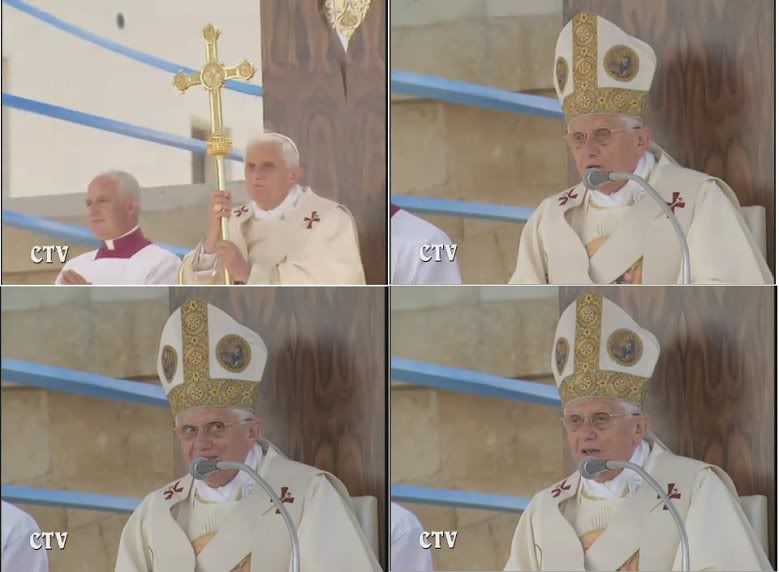
THE HOLY FATHER'S HOMILY
IN LEUCA, 6/14/08
Dear brothers and sisters,
My visit in Puglia - the second, after the Eucharistic congress in Bari - begins as a Marian pilgrimage at this extremity of Italy and of Europe, in the Shrine of Santa Maria de Finibus Terrae.
With great joy, I address an affectionate greeting to all of you. I affectionately thank your Bishop, Mons. Vito De Grisantis, for having invited me and for his cordial welcome. Along with him, I greet the other bishops of the region, particularly the Metropolitan of Lecce, Mons. Cosmo Francesco Ruppi, as well as the priests and deacons, consecrated persons and all the faithful.
I greet and acknowledge the presence of Minister Raffaele Fitto in representation of the Italian government, and the different civilian and military authorities present.
In this place that is so important for the cult of the Blessed Virgin Mary, I wanted today's liturgy to be dedicated to her, Star of the Sea and Star of Hope.
"Ave, maris stella, / Dei Mater alma, / atque semper virgo, / felix caeli porta!". (Hail, Star of the sea! Mother of God ever virgin, happy gate to heaven!)
The words of this ancient hymn are a greeting which in some way echoes that of the Angel in Nazareth. All the Marian titles in fact are, in effect, adorned and garlanded by that first name with which the heavenly messenger addressed the Virgin: "Rejoice, (you who are) full of grace!" (Lk 1,28).
We heard in the Gospel of St. Luke - very appropriate because this shrine, as the stone tablet above the central doorway says - is named after the Most Blessed Virgin of the Annunciation.
When God called Mary 'full of grace', the lamp of salvation was lit for the entire human race. A daughter of our people found grace in the eyes of the Lord, who pre-selected her to the the Mother of the Redeemer.
In the simplicity of Mary's house in a poor village of Galilee, the solemn prophecy about salvation begins to be fulfilled: "I will put enmity between you and the woman, and between your offspring and hers; He will strike at your head, while you strike at his heel" (Gen 3,15).
That is why the Christian people have taken up for her the canticle of praise that the Jews raised to Judith and that we earlier prayed in the Responsorial Psalm: "Blessed are you, daughter, by the Most High God, above all the women on earth" (Jdt 13,18).
Without violence, but through the gentle courage of her Yes, the Virgin has liberated us, not from an earthly enemy, but from the ancient adversary, giving human form to Him who would crush its head once and for all.
That is why, on the sea of life and of history, Mary shines as the Star of Hope. She does not shine with her own light, but she reflects that of Christ, the Sun who came on the horizon of humanity. By following the Star of Mary, we can orient ourselves on our journey and stay on the path towards Christ, especially in dark and tempestuous times.
The Apostle Peter knew this experience quite well, having lived it firsthand. One night, while he was crossing the Lake of Galilee with the other disciples, he was surprised by a tempest. Their boat, at the mercy of the waves, could no longer proceed.
Jesus came to them, then, walking on water, and invited Peter to leave the boat and come to him. Peter made a few steps on the waves but felt himself sinking, so he cried out, "Lord, help me!" Jesus took him by the hand and brought him to safety (cfr Mt 14,24-33).
This episode proved to be a sign of the tests that Peter would have to undergo at the time of the Passion of Jesus. When the Lord was arrested, Peter became fearful and denied him three times: he was overcome by the tempest.
But when his eyes crossed those of Jesus, the mercy of God took him in hand, and causing him to dissolve in tears, raised him up from his fall.
I wished to recall the story of St. Peter, because I know that this place and your entire church are particularly linked to the Prince of Apostles. As your bishop recalled at the start of the Mass, tradition attributes to him the first announcement of the Gospel on this land.
The Fisherman, 'fished out' by Jesus, cast the net here, and today we give thanks for having been the objects of that 'miraculous catch' which has now lasted 2000 years, an act which, as St. Peter himself wrote, "called us out of darkness into his (God's) wonderful light" (1 Pt 2,9).
To become fishermen with Christ, one must first be 'fished' by him. St. Peter is a witness to this fact, as is St. Paul, a great convert, whose birth we shall celebrate on its bimillenary in a few days.
As the Successor of Peter and Bishop of the Church founded on the blood of these two eminent Apostles, I have come to confirm you in the faith of Jesus Christ, the only Savior of man and the world.
The faith of Peter and the faith of Mary come together in this Shrine. Here one can draw from the double principle of the Christian experience: the Marian and the Petrine. Both together will help you, dear brothers and sisters, tp 'start over from Christ', to renew your faith so that it may respond to the demands of our time.
Mary teaches you to remain always in watchful heed of the Lord in the silence of prayer, to welcome his Word with generous willingness and the profound desire of offering yourself to God - offering your life concretely - so that his eternal Word, through the power of the Holy Spirit, may still 'become flesh' today in our history.
Mary will help you to follow Jesus faithfully, to unite yourselves to him in offering the Sacrifice, to carry in your heart the joy of his Resurrection, and to live in constant obedience to the Spirit of Pentecost.
In a complementary manner, St. Peter too will teach you to feel and believe with the Church, firm in your Catholic faith. He will bring you the desire and passion for unity, for communion, the joy of walking together with your pastors; and at the same time, he will make you take part in the desire for mission, to share the Gospel with everyone, to make it reach the very ends of the earth.
"De finibus terrae" - of land's end: the name of this holy place is very beautiful and evocative, because it re-echoes one of the last words of Jesus to his disciples. Jutting out from Europe to the Mediterranean, between West and East, it reminds us that the Church has no boundaries - it is universal.
Geographical, cultural, ethnic and even religious confines themselves are, for the Church, an invitation to evangelization in the context of 'communion in diversity'. The Church was born at Pentecost, it was born universal, and its vocation is to speak in all the languages of the world.
The Church exists - according to the original vocation and mission revealed to Abraham - to be a blessing for the benefit of all the peoples of the world (cfr Gn 12,1-2): in the language of Vatican-II, to be a sign and instrument of unity for the entire human race (cfr Const. Lumen gentium, 1).
The Church in Puglia has a distinct vocation to be a bridge among peoples and cultures. This land and this Shrine are, in effect, an 'advance post' in this direction, and I am very happy to note, in the letter of your Bishop and in his words today, how much this sensibility is alive among you and perceived positively, in genuine evangelical spirit.
Dear friends, we know well - because the Lord Jesus has been very clear about this - that the effectiveness of our testimony is proportional to the intensity of our love. It means nothing to project ourselves to the very ends of the earth, unless we love each other first and help each other within the Christian community.
That is why the exhortation of the Apostle Paul which we heard in the second Reading (Col 3,12-17) is fundamental bot only for your life in the ecclesial family, but even for your commitment to animate social reality.
In fact, in a context which tends increasingly to incentivize individualism, the first service of the Church is to educate the faithful in having a sense of the social - towards attention to our neighbor, towards fraternal solidarity and sharing.
The Church, having been endowed by its Lord with a spiritual charge that is constantly renewed, has shown itself capable of exerting a positive influence even on the social level because it promotes a renewed humanity and open, constructive human relations, with respect for and in the service, above all, of the least and the weakest.
Here, in the Salento region, as in all of southern Italy, the ecclesial communities are places where the young generations can learn about hope, not as a utopia, but as a tenacious trust in the power of good.
Goodness wins, and if at times it may appear defeated by overwhelming forces and by cunning, it really continues to work in silence and discretion, bearing fruits in the long run.
This is Christian social renewal, based on the transformation of consciences, on moral formation, on prayer. Yes - because prayer is the power to believe and to fight for what is good, even when humanly, one may be tempted to be discouraged and to draw back.
The initiatives which the Bishop cited earlier and the others which you have been carrying forward in your territory, are eloquent signs of this typically ecclesial style of human and social promotion.
At the same time, taking the occasion of the presence here of civilian authorities, I am happy to remind them that the Christian community cannot and would never wish to replace the legitimate and obligatory competencies incumbent on public institutions, but rather stimulates and supports them in their tasks and proposes always to collaborate with them for the good of all, starting with the situations of greatest unease and difficulty.
Our thought returns finally to the Most Blessed Virgin. From this shrine of Santa Maria de Finibus Terrae, I wish to place myself on a spiritual pilgrimage to the various Marian shrines of the Salento, true gems embedded in this peninsula flung out like a bridge on the sea.
The Marian piety of the people was formed under the admirable influence of the Basilian devotion to the Theotokos, mother of God, a devotion later cultivated by the sons of st. Benedict, of St. Dominic, of St. Francis, and expressed in very beautiful churches as well as simple sacred structures that must be cared for and preserved as a sign of the rich religious and civic heritage of your people.
We turn therefore to you, Virgin Mary, who remained fearless at the foot of your Son's Cross. You are a model of faith and hope in truth and goodness. In the words of the ancient hymn, we call on you: "Break the bonds of those who are oppressed,/ bring light to those who cannot see,/ drive away all evil from us,/ and pray for us that we may have every good."
Looking towards the horizon where sea and sky meet, we wish to entrust to you the peoples who live along the Mediterranean and those of the entire world, asking development and peace for all: "Give us days of peace,/ watch over our journey,/ so that we may get to see your Son/ full of joy in heaven". Amen.
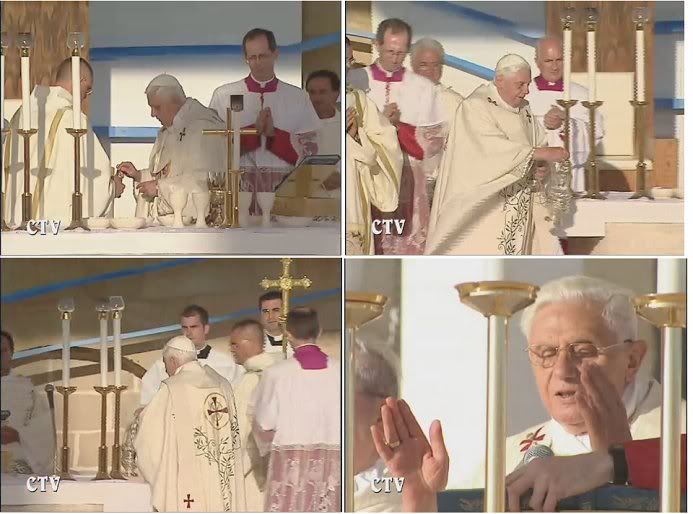 After the Eucharistic celebration, the Pope met with members of the organizing committee for the visit. He then took the Popemobile back to Punto Ristola, where he was seen off by the authorities who had welcomed him earlier, and at 19:30, he left by helicopter for Brindisi.
After the Eucharistic celebration, the Pope met with members of the organizing committee for the visit. He then took the Popemobile back to Punto Ristola, where he was seen off by the authorities who had welcomed him earlier, and at 19:30, he left by helicopter for Brindisi.
[Modificato da TERESA BENEDETTA 16/06/2008 15:29] |
 15/06/2008 13:46 15/06/2008 13:46 |
|
| | | OFFLINE | | Post: 13.940 | Registrato il: 28/08/2005
| Utente Gold | |
|
  PASTORAL VISIT TO LEUCA AND BRINDISI, June 14-15, 2008
PASTORAL VISIT TO LEUCA AND BRINDISI, June 14-15, 2008
  
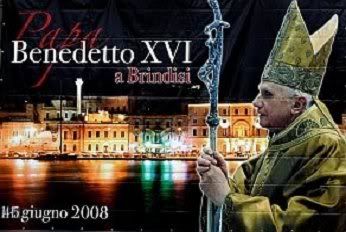
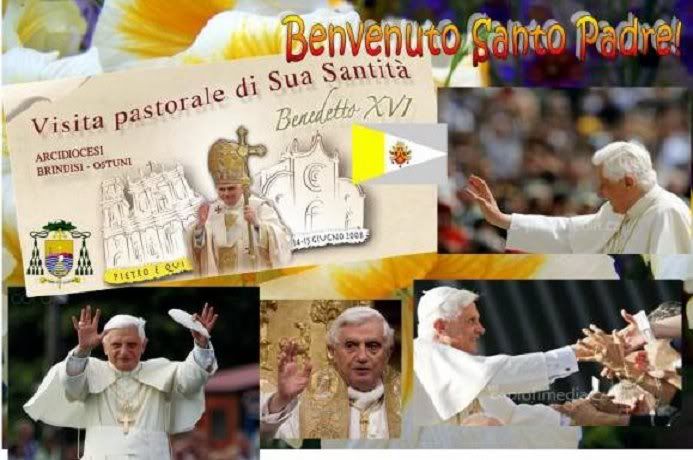
Entering Brindisi by Popemobile from the heliport.
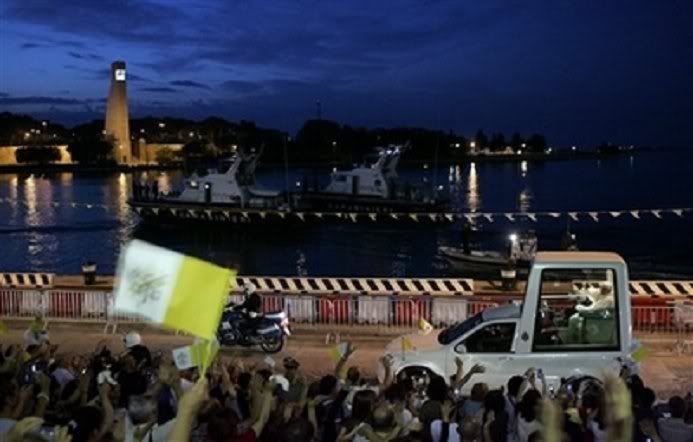
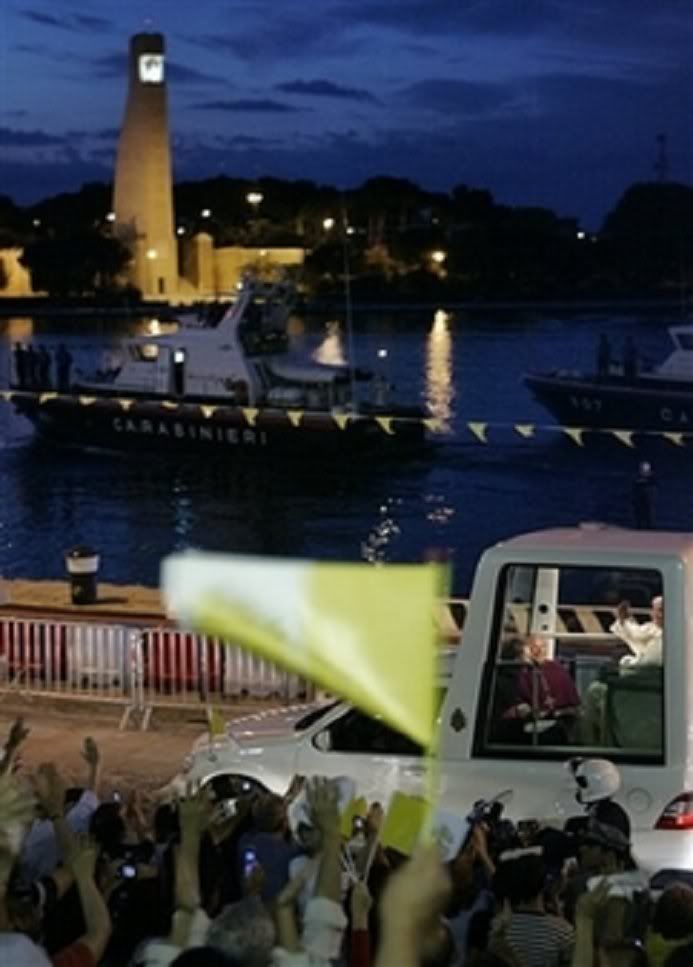 According to the Vatican note that precedes the text of the Holy
According to the Vatican note that precedes the text of the Holy
Father's address to the young people of Brindisi:
From the Punta Ristola heliport in Santa Maria di Leuca, the helicopter with the Holy Father on board landed at the parking lot of Via Spalato at the Port of Brindisi at 8 p.m.
After a welcome from the political, civilian and ecclesiastical authorities of the city, the Pope went by popemobile towards Piazzale Lenio Flacco where, at 8:30, he would meet city residents, in particular, the young people of the Archdiocese of Brindisi-Ostuni.
Introduced by remarks from Minister for Regional Governments Raffaele Fitto, representing the national government; by the Mayor of Brindisi, Domenio Mennitti, and by a youth representative, Giorgio Nacci, His Holiness delivered the following address:
ADDRESS OF THE HOLY FATHER
TO THE CITIZENS AND YOUTH OF BRINDISI
Mr. Minister,
Mr. Mayor and distinguished authorities,
Dear brothers and sisters,
I wish first of all to express my joy at finding myself among you and greet you with all my heart. I thank the Honorable Raffaele Fitto, Minister for Regional Affairs, who has brought me greetings from the government. I thank the Mayor of Brindisi for the warm words of welcome which he has extended in the name of the entire citizenry, and for the kind gift he has presented.
I greet and affectionately thank the young man who spoke for the youth of Brindisi. I know that you, dear young people, animated this gathering while awaiting my arrival, and that you will continue with a prayer vigil through which you wish to prepare for the Eucharistic Celebration tomorrow.
I cordially salute the Archbishop, Mons. Rocco Talucci, Emeritus Archbishop Mons. Settimio Todisco, the priests, religious men and women, and everyone present.
Dear friends, here I am with you, having gladly accepted the invitation of your Diocesan Pastor. I am indeed happy to visit your city which, even as it plays a significant role in the context of the Italian south, is also called on to project itself beyond the Adriatic Sea to communicate with other cities and other peoples.
Indeed, Brindisi - which at one time was the place of embarkation towards the Orient for merchants, legionaries, scholars and pilgrims - continues to be a port open to the sea. In recent years, the newspapers and television showed images of refugees disembarking at Brindisi from Croatia or Montenegro, from Albania and from Macedonia.
I think it is my duty to thank you for your efforts in this respect, which continue to be deployed by civilian and military authorities, in collaboration with the Church and various humanitarian organizations, to give the refugees asylum and assistance, despite the economic difficulties which, unfortunately, continue to preoccupy your region.
Your city has been and continues to be generous, for which merit it has been rightfully recognized, by assigning to it, in the context of international solidarity, an authentic institutional role: it now hosts the base for emergency humanitarian assistance from the United Nations (UNHRD) administered by the World Food Program of the Untied Nations.
Dear Brindisini, such solidarity is part of the virtues which make up your rich civilian and religious patrimony. Continue with renewed impulse to build together the future of this city.
Among the values rooted in your land, I wish to call attention to respect for life, and especially, attachment to the family, which is exposed today to a convergent attack by many forces which seek to weaken it.
How much more necessary and urgent it is therefore, in the face of such challenges, that all men of goodwill commit themselves to safeguarding the family, the solid base on which to build the life of an entire society!
Another foundation of your society is the Christian faith, which your ancestors considered as one of the qualifying elements of the Brindisian identity. May this adherence to the Gospel, consciously renewed and lived with responsibility, impel you, today as yesterday, to face with trust the difficulties and challenges of the present; may the faith encourage you to respond without compromises to the legitimate expectations of human and social promotion in your city.
To this act of renewal, the University which is in the act of being born can only offer its contribution, called on to serve those who, aware of their dignity and their duties, wish to participate actively in the life and economic, political, cultural and religious development of the territory.
Dear Brindisini, in order that the culture of solidarity may grow in your city, be at the service of one another, allowing yourself to be guided by an authentic sense of brotherhood. God is with you, and will not fail to give you the constant support of his grace.
Now I wish to address particularly the many young people present. Dear friends, thank you for your warm welcome, thank you for the warm feelings that your representative conveyed in your name. Your voices, which find immediate response in my soul, convey to me your trusting exuberance, your wish to live. To the latter, one can also attribute the problems that assail you, which sometimes risk suffocating the enthusiasms that are typical of your stage of life.
I know, in particular, the weight that not a few of you must bear because of the tragic phenomenon of unemployment which strikes above all the young men and women of Italy's Mezzogiorno [the Italian South].
In the same way, I know that your youth is besieged by get-rich-quick propositions, by the temptation to take refuge in artificial Paradises
or to let yourself be attracted by distorted forms of material satisfaction. Do not allow yourselves to be caught in the snares of evil! Instead, seek an existence that is rich with values, in order to give life to a society that is more just and more open to the future.
Bring to bear the gifts with which God has endowed your youth: strength, intelligence, courage, enthusiasm, the will to live. It is only with such 'baggage', always counting on divine support, that you can nourish hope within you and around you.
It is up to you and your hearts to transform progress into the greater good of all. And as you know, the way of goodness has a name: it is called love.
In love, and only in authentic love, does one find the key to every hope, because love has its root in God. We read in the Bible: "We have come to know and to believe in the love God has for us. God is love..." (1 Jn 4,16).
And God's love has the gentle and compassionate face of Jesus Christ. And so we come to the heart of the Christian message: Christ is the answer to your questions and problems - in him, every honest aspiration of the human being is confirmed.
But Christ is demanding and does not take half measures. He knows he can count on your generosity and consistency, and that is why, much is expected of you. Follow him faithfully, and in order to encounter him, love your Church, feel yourselves responsible for it, do not flee from being, each in your own way, courageous protagonists.
And this is one point to which I wish to call your attention: seek to know your Church, to understand it, to love it, paying attention to the voices of her Pastors. The Church is made up of human beings, but Christ is its Head and his Spirit leads it firmly.
You are the young face of the Church - therefore, do not fail to make your contribution to it so that the Gospel which it proclaims may be propagated everywhere. Be apostles among your contemporaries!
Dear brothers and sisters, thank you once again for your welcome. I have read some letters written to me by young people of your province, and from those letters, I have been able to know your reality better. Thank you for your affection. To all of you and all Brindisini, I assure you of my prayers so that you may be able to bear witness to the evangelical message of justice and peace.
May Mary, Regina Apuliae - Queen of Puglia - protect and accompany you always. I bless you from my heart, and I wish everyone good night!
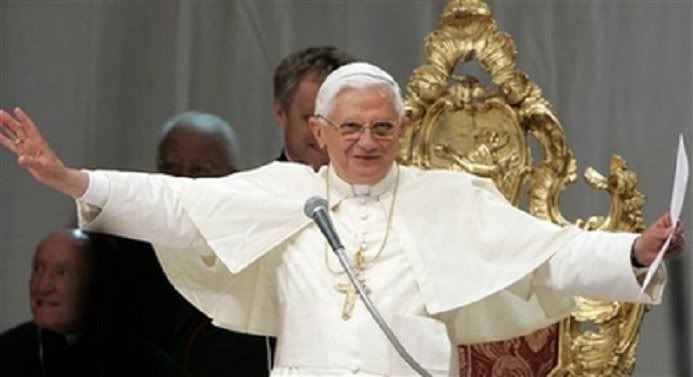
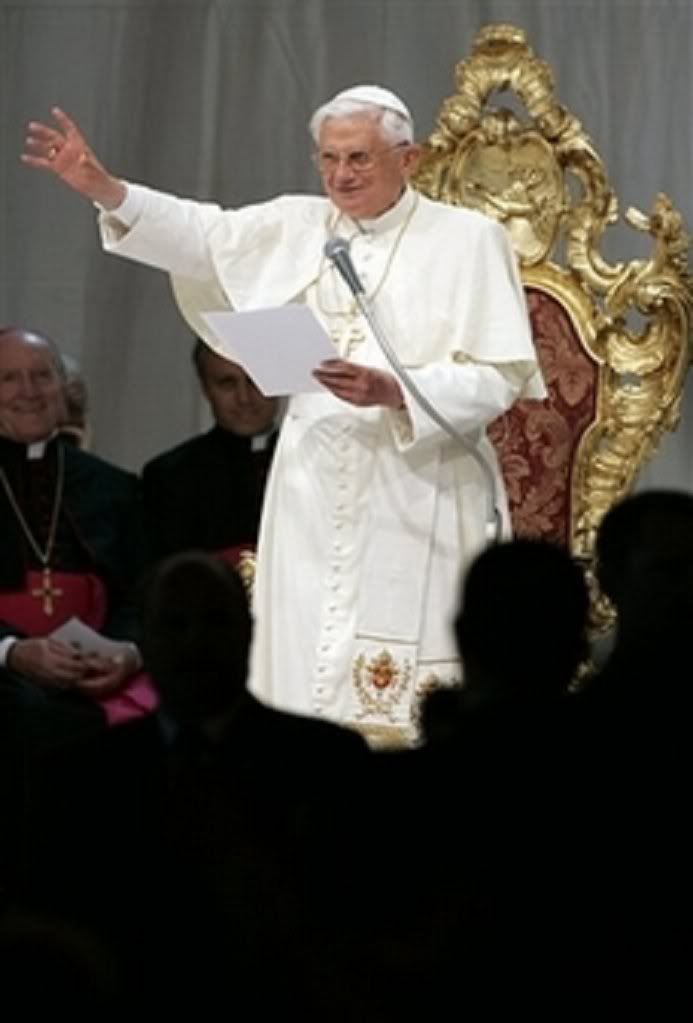
[Modificato da TERESA BENEDETTA 17/06/2008 00:34] |
 15/06/2008 14:32 15/06/2008 14:32 |
|
| | | OFFLINE | | Post: 13.943 | Registrato il: 28/08/2005
| Utente Gold | |
|
  PASTORAL VISIT TO LEUCA AND BRINDISI, June 14-15, 2008
PASTORAL VISIT TO LEUCA AND BRINDISI, June 14-15, 2008
   PUGLIA WELCOMES BENEDICT XVI
PUGLIA WELCOMES BENEDICT XVI
by Mario Ponzi
Translated from
the 6/15/08 issue of

From Santa Maria di Leuca to Brindisi as a messenger of love to sustain hope and confidence in the future. From the Marian sanctuary 'at land's end' ('de Finibus terrae), Benedict XVI has retraced the first steps of the Apostle Peter on Italian soil and reproposes Christ as the point of departure for a renewed Christian journey. This encounter with the population of Italy's southern extremity is dense with meaning.
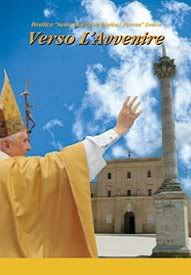 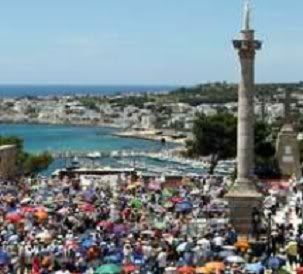 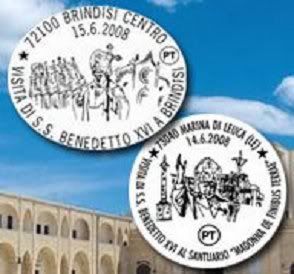
Benedict XVI is entering into the concreteness of daily existence for the people who guard a genuine treasure of popular devotion, the Shrine of Santa Maria de Finibus Terrae, a name and a reference that has marked the history and life of this region for centuries.
One has to believe that the thousands of persons who stood together yesterday to take part in the Mass celebrated by the Pope were able to experience the strength of that love that Benedict XVI seeks to instill int he hearts of man in the third millennium.
Benedict XVI stayed only a few hours in Leuca, but it was an occasion that will live long in the memory and hearts of the people whom he exhorted to understand that evil can be defeated by the force of goodness.
The Pope reached Brindisi after night had fallen - a city that hastened to draw close to him after years of awaiting a papal visit. John Paul II's health in his last few years did not allow it.
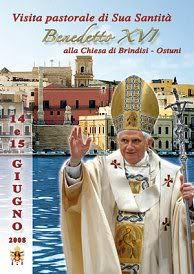 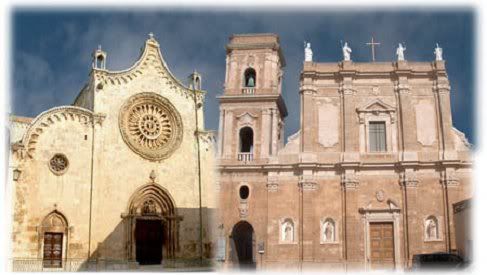
In December 2007, when the bishops of Puglia made their ad limina visit to Rome, Archbishop Rocco Talucci of Brindisi spoke about it to the Holy Father - and shortly thereafter, the Vatican announced that the Salento would be the second of three pastoral visits in Italy that the Pope would make in 2008.
Perhaps it was the young people of Puglia who most awaited him. It was they last night whom he first addressed shortly after arriving in Brindisi. He brought them words of encouragement to overcome present difficulties.
He gave them goals and objectives. And the way through which they could achieve them. He taught them how to read the signs of renewal, such as a University at Brindisi to start plugging the brain drain of professionals and university graduates away from the region in search of opportunities elsewhere.
The Holy Father joined the local Church in calling on the faithful to rediscover Christian hope which is not a utopia, pointing to the synodal experience that the diocese has begun to undertake. The church in Puglia is undergoing a post-Conciliar renewal without forgetting its deep and centuries-old rootedness in Christianity.
The presence of the Pope can only rouse fresh enthusiasm in a community that is ready to go forward, in the awareness of the confidence that he has re-instilled in them as guardians of a doorway to the East, and therefore, a role in the journey to reconstruct full communion with "our Orthodox brothers' and to undertaken constructive dialog with other religions.
The choice of the wharf at Sant'Apollinare in Brindisi port as the setting for the Pope's Sunday Mass today is significant in this sense, but also for another aspect: as a consecration of the role that Brindisi and its inhabitants had and have in showing generous hospitality to those who had been forced to leave their countries and homes in search of a new life and hope for the future.
VISIT TO BRINDISI

PROGRAM
Sunday, June 15
09:15 The Holy Father meets cloistered nuns in the chapel of the Bishops Palace.
09:30 Leave the Bishop's Palace in the Popemobile for Sant'Apollinare in Brindisi port.
10:00 Eucharistic celebration in Santi'Apollinare.
- HOMILY BY THE HOLY FATHER
12:00 The Holy Father leads the Angelus.
- REMARKS BY THE HOLY FATHER.
He then returns to the Bishop's palace.
13:00 Lunch with the bishops of Puglia, followed by a brief rest.
16:30 Greeting to members of the Organizing Committees at the Bishop's palace.
16:45 Visit to the Cathedral of Brindisi
- Adoration of the Blessed Sacrament
- Meeting with the priests and seminarians of the diocese.
- ADDRESS BY THE HOLY FATHER.
17:15 Travel by Popemobile to Brindisi-Casale airport.
17:45 Depart for Rome.
ROME
18:45 Arrival at Rome-Ciampino airport.
Travel by helicopter to the Vatican.
[Modificato da TERESA BENEDETTA 16/06/2008 05:03] |
 15/06/2008 14:56 15/06/2008 14:56 |
|
| | | OFFLINE | | Post: 13.944 | Registrato il: 28/08/2005
| Utente Gold | |
|
|
 15/06/2008 15:10 15/06/2008 15:10 |
|
| | | OFFLINE | | Post: 13.945 | Registrato il: 28/08/2005
| Utente Gold | |
|
  PASTORAL VISIT TO LEUCA AND BRINDISI, June 14-15, 2008
PASTORAL VISIT TO LEUCA AND BRINDISI, June 14-15, 2008
   MASS IN BRINDISI
MASS IN BRINDISI
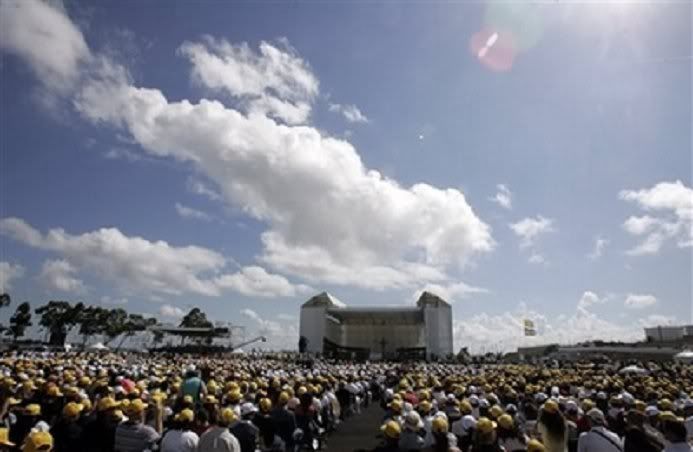 Pope celebrates Mass for 70,000
Pope celebrates Mass for 70,000

BRINDISI, Italy, June 15 (AP) - Pope Benedict XVI celebrated an open-air Mass before some 70,000 faithful in this southern Mediterranean city.
The faithful cheered as Benedict arrived Sunday in his popemobile. He smiled and waved to the crowd gathered under the sun in a large industrial space by the city's port.
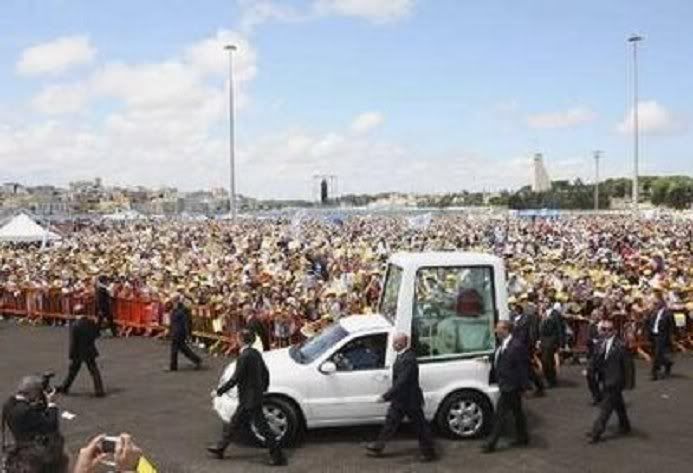
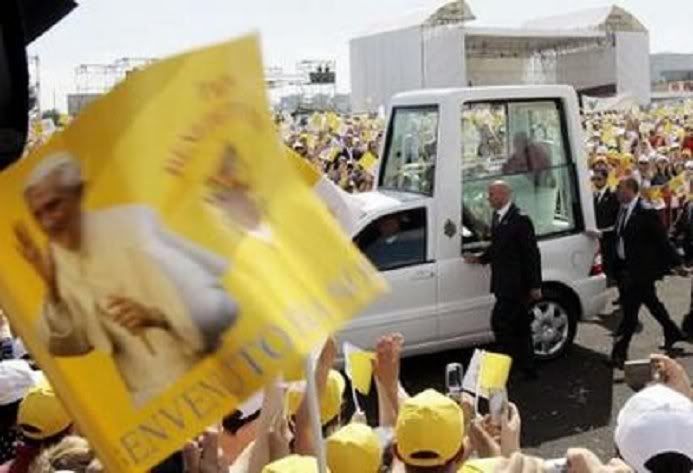
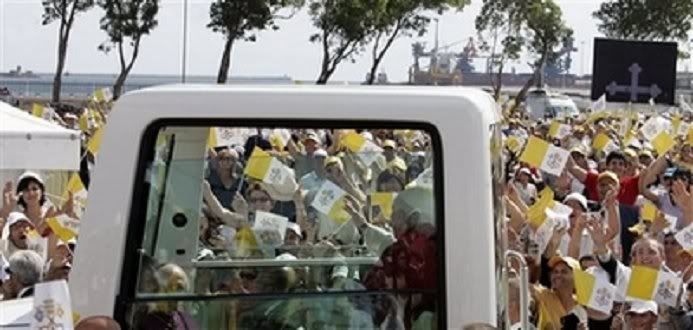
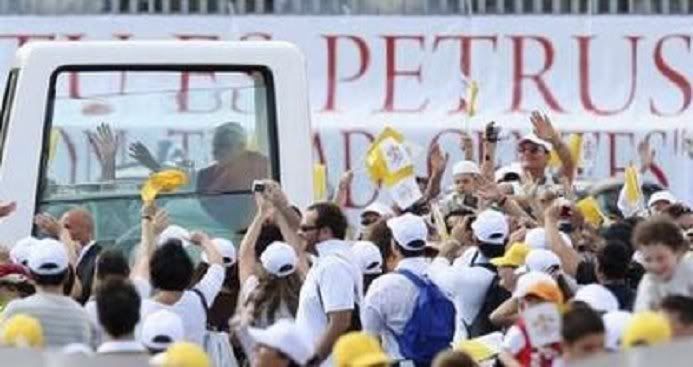
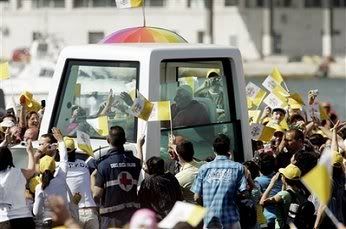 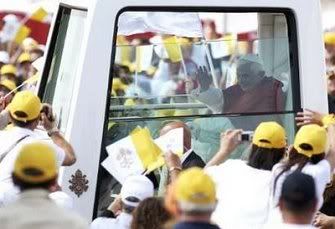
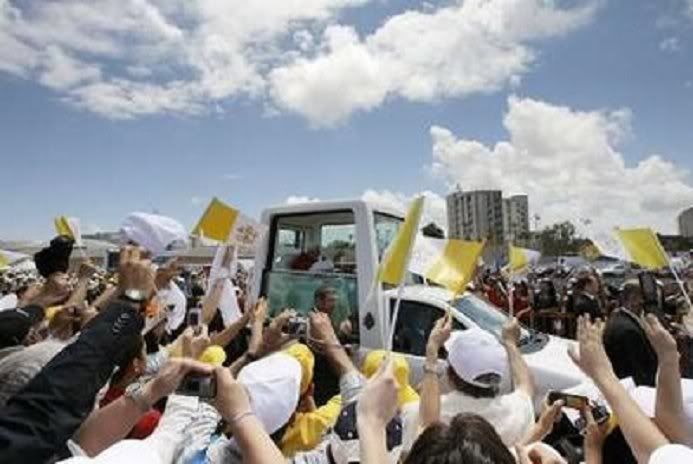
Brindisi was built in Roman times and was once an affluent port trading with Greece and the East.
The Pontiff is on a two-day trip to the Puglia region, which makes up Italy's heel." Later Sunday he meets with local clergy before returning to the Vatican.
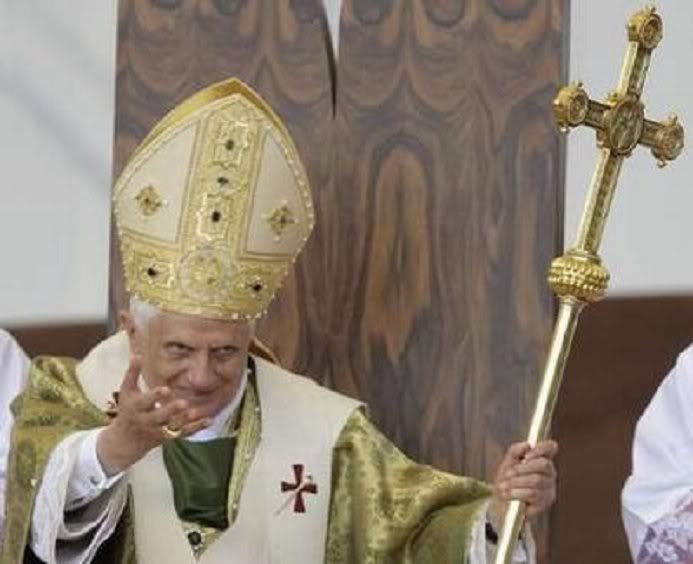 Pope sends 'message of peace'
Pope sends 'message of peace'
to Middle East

BRINDISI, Italy, June 15 (AFP) - Pope Benedict XVI used his traditional Sunday prayer to send a "message of peace" to the Middle East while on a pastoral visit to southern Italy.
"I would like to renew the Christian message of cooperation and peace among all people, especially among ... those of the Near and Middle East," he said in this city in the "heel" of Italy, jutting into the Mediterranean.
"Such a suggestive place" prompted the message, Benedict said, noting that Brindisi is near the town of Calimera, which is Greek for "good morning."
Noting that the UN World Food Programme manages an emergency food warehouse in Brindisi, Benedict praised the UN agency, "which plays an important humanitarian role."
Reiterating remarks he made at the UN General Assembly in April on the legitimacy of international intervention in times of crisis, Benedict said: "It is indifference or non-intervention that causes the real harm."
The Pontiff, on a two-day visit to Italy's impoverished Apulia (Puglia in Italian) region, on Saturday praised the "generosity" of the people of Brindisi, which saw a massive influx of refugees from the then Yugoslavia, as well as economic migrants from Albania, in the 1990s.
Celebrating a second open-air Mass on Sunday, the Pope stressed the Roman Catholic Church's social commitment in the name of "the love of Christ for the little and the poor."
He said: "Christian compassion has nothing to do with piety ... it is synonymous with solidarity and sharing, and animated by hope."
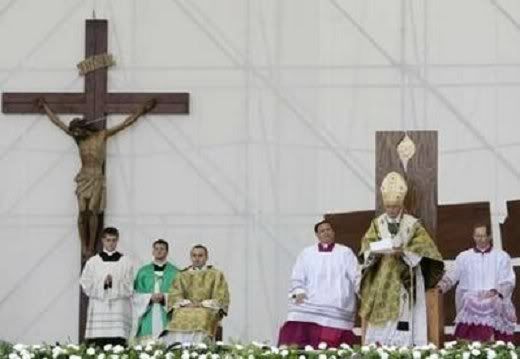
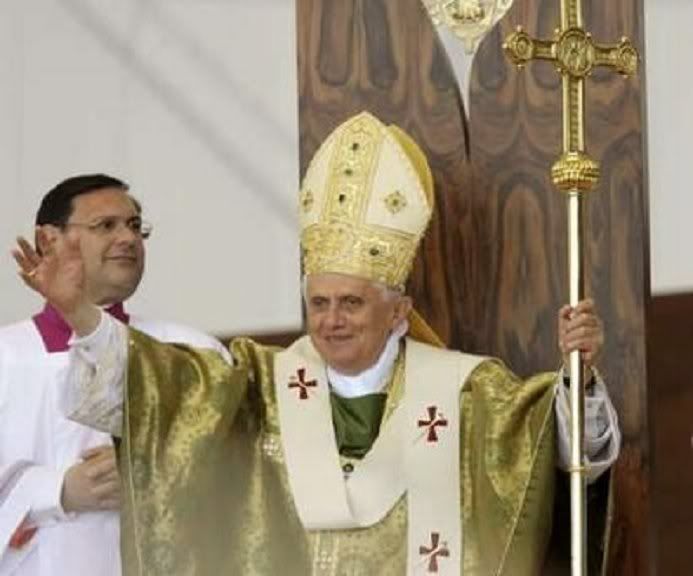
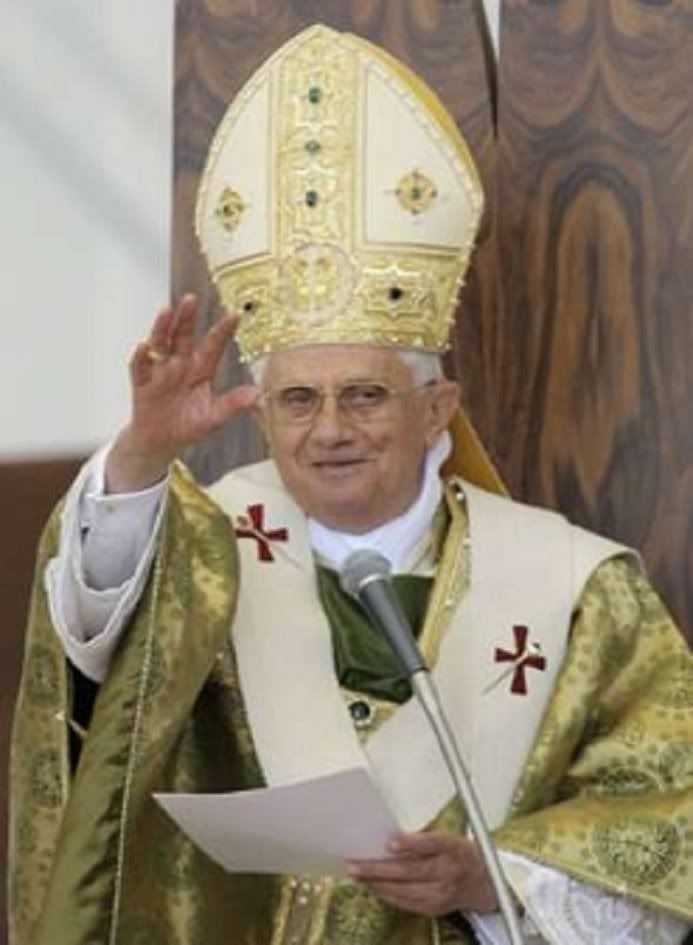
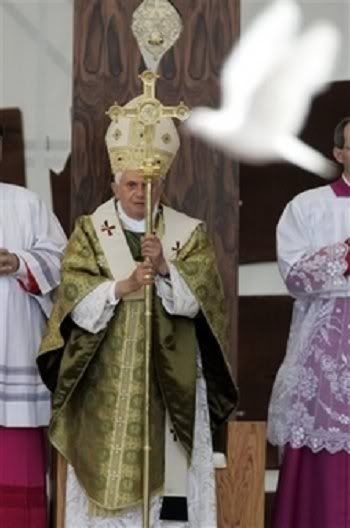 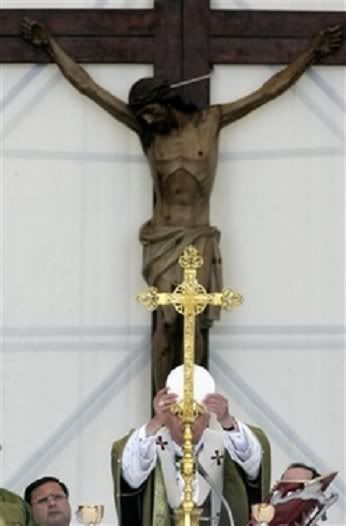
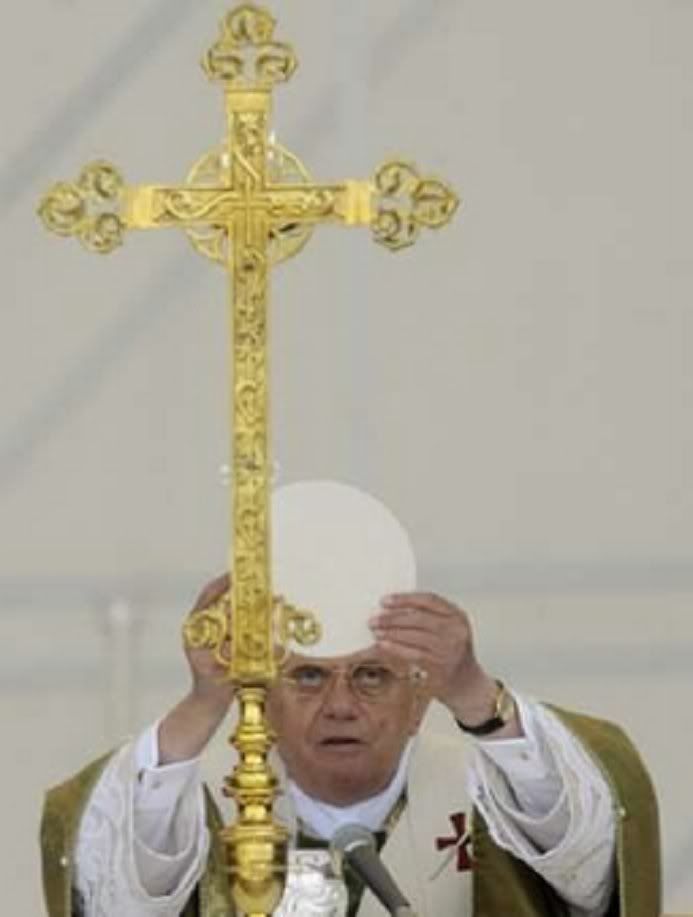
[Modificato da TERESA BENEDETTA 16/06/2008 19:32] |
 15/06/2008 21:30 15/06/2008 21:30 |
|
| | | OFFLINE | | Post: 13.946 | Registrato il: 28/08/2005
| Utente Gold | |
|
  PASTORAL VISIT TO LEUCA AND BRINDISI, June 14-15, 2008
PASTORAL VISIT TO LEUCA AND BRINDISI, June 14-15, 2008
   Thanks as ever to Caterina for her prompt videocap montages from the Mass in Brindisi, which I have used here in slightly edited form. Here is a translation of the Holy Father's homily:
Thanks as ever to Caterina for her prompt videocap montages from the Mass in Brindisi, which I have used here in slightly edited form. Here is a translation of the Holy Father's homily:
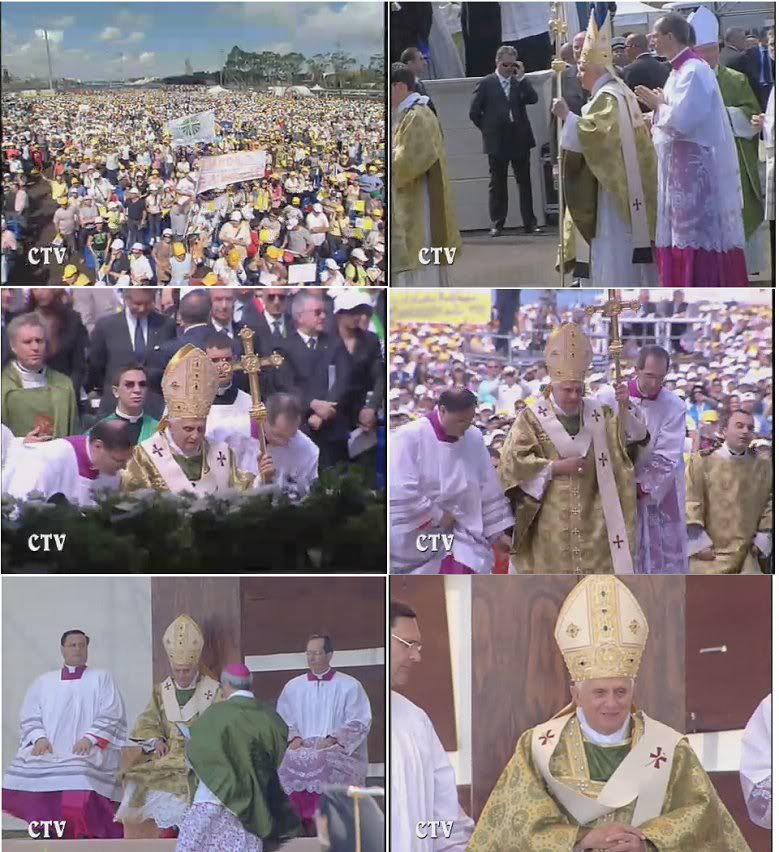
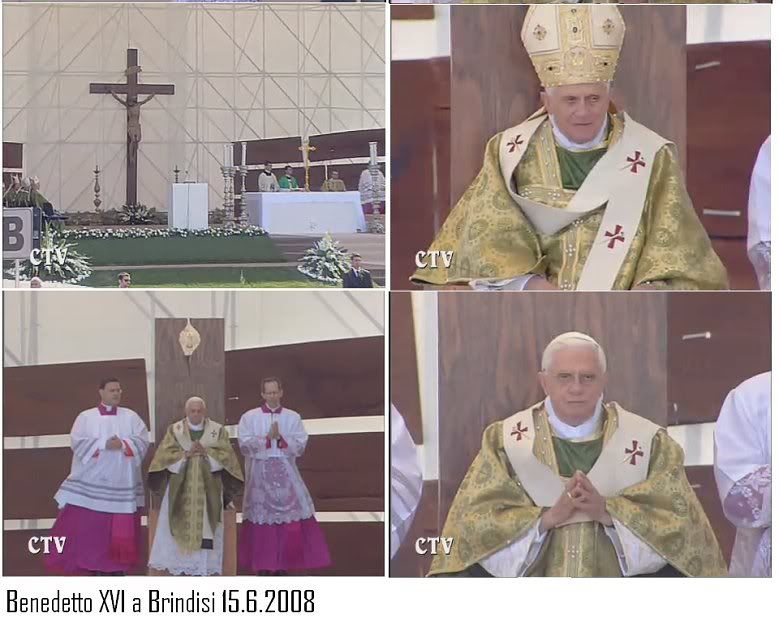
HOMILY AT THE MASS IN BRINDISI, 6/15/08
Dear brothers and sisters,
At the center of my visit to Brindisi, we celebrate on the Lord's day the mystery which is the source and summit of the entire life of the Church.
We celebrate Christ in the Eucharist, the greatest gift from his human and divine heart, the Bread of Life broken and shared so that we may become one with Him and among ourselves.
I greet affectionately all of you who have assembled in this place which is so symbolic - the port - which evokes the missionary voyages of Peter and Paul. With joy I see so many young people who animated last night's vigil, preparing themselves for the Eucharistic celebration. I also greet those of you are taking part spiritually through radio and television.
I address a particular greeting to the pastor of this beloved Church, Mons. Rocco Talucci, thanking him for the words he said at the start of the Mass. I greet the other bishops of Puglia who are here with us in fraternal communion of feelings.
I am particularly happy at the presence of Metropolitan Gennadios, to whom I extend my heartfelt greeting, which also goes to all our Orthodox brothers and those of other confessions, from the Church in Brindisi which, through its ecumenical vocation, invites us to pray and commit ourselves to work for the full unity of all Christians.
I greet and acknowledge the civilian and military authorities who are taking part in this liturgy, wishing them all the best in their service.
My affectionate thoughts go out to the priests and deacons, religious men and women, and all the faithful. I have a special greeting for the patients in the hospitals and those who are in prisons, whom I assure of remembrance in my prayers.
May the grace and peace of the Lord be on everyone and on the whole city of Brindisi!
The Biblical texts, which we heard on this eleventh Sunday in ordinary time, help us to understand the reality of the church: The first Reading (cfr Ex 19,2-6a) evokes anew the alliance reached on Mount Sinai during the exodus from Egypt; the Gospel (cfr Mt 9,26-10,8) tells of the calling and the mission given to the twelve Apostles.
We find presented here the 'constitution' of the Church. How can we not take note the implicit invitation addressed to every community to renew itself in its own vocation and its own missionary impulse?
In the first Reading, the sacred author narrates God's pact with Moses and Israel on Sinai. It is one of the great stages in the history of salvation, one of those moments that transcend history itself, in which the boundary between the Old and New Testaments disappears and the perennial plan of the God of the Alliance reveals itself: the plan to save all men through the sanctification of a people, whom God proposes to make his "special possession, dearer to me than all other people" (Ex 19,5).
In this perspective, the (Jewish) people are called to become 'a holy nation', not only in the moral sense, but first and above all, in its ontological reality itself, in its essence as a people.
How one should understand the identity of this people would be gradually manifested in the course of salvific events that take place in the Old Testament, and is then fully revealed in the coming of Jesus Christ.
Today's Gospel presents us with a decisive moment for that revelation. In fact, when Jesus called twelve apostles, he wanted to refer symbolically to the tribes of Israel, going back to the sons of Jacob.
Thus, placing himself at the center of his new community of Twelve, he made it understood that he had come to bring to fulfillment the plan of the celestial Father, even if it would not be till Pentecost that the new face of the Church would emerge - when the Twelve, 'filled with the Holy Spirit', would proclaim the Gospel, speaking in all languages (acts 2,3-4).
At that time, the universal Church would be manifested, assembled in one Body of which the risen Christ is the Head, and at the same time, sent by him to all nations to the very ends of the earth (cfr Mt 28.20).
The style of Jesus is unmistakable: it is a style characteristic of God who likes to fulfill the greatest things in poor and humble ways. The solemnity of the accounts of the Alliance in the Book of Exodus gives way in the Gospel to humble, discreet gestures which nonetheless contain the enormous potential for renewal.
It is the logic of the Kingdom of God, which is not by chance represented by the small seed that becomes a great tree (cfr Mt 13,31-32).
The Pact of Sinai was accompanied by cosmic signs which terrified the Israelites. But the beginnings of the Church in Galilee were devoid of any such manifestations, reflecting the gentleness and compassion of the heart of Christ, but also pre-announcing another battle - that against the great confusion brought on by the forces of evil.
To the Twelve, as we heard, Christ "gave the power over unclean spirits to drive them out and to cure every disease and every illness" (Mt 10,1). The Twelve would cooperate with Jesus in establishing the Kingdom of God, that is, his beneficial Lordship as the bearer of life - life in abundance for all mankind.
God who is Love triumphs. This work of Christ is always silent - it is not spectacular. It is precisely in the humility of being the Church, of living the Gospel each day, that the great tree of true life grows.
It is with these humble beginnings that the Lord encourages us, so that even with the humility of the Church today, in the poverty of our life, we can see his presence and thus have the courage to walk forward to him, and to make his love present on earth, the love which is the power for peace and for true life.
This then is God's plan: to spread to mankind and the entire cosmos his life-generating love. It is not a spectacular process. It is humble, but it carries with it the power of the future and of history.
It is a plan that God wishes to realize respecting our freedom, because love, by its very nature, cannot be imposed.
The Church is therefore, in Christ, the space for welcoming and mediating the love of God. In this context it appears clearly how the holiness and mission of the Church are two faces of the same coin: only insofar as it is holy - that is, filled with divine love - can the Church fulfill its mission, and it is precisely in the light of this task that God has chosen and sanctified it as his special possession.
Therefore our first duty in helaing this world is to be saintly, conforming ourselves to God. In this way, a sanctifying and transforming force comes from us which can act on others and on history.
It is this pairing of 'holiness-mission' - holiness is always a force which transforms others - against which your ecclesial community, dear brothers and sisters, measures itself at this time, in undertaking its current diocesan Synod.
In this respect, it is useful to reflect that the twelve Apostles were not perfect men who were chosen fro their moral and religious reproachlessness. Yes, they were believers, full of enthusiasm and zeal, but marked at the same time by their human limitations, sometimes even grave ones.
Jesus did not call them because they were already saintly, complete, perfect, but so that they could become saints, so that they could be transformed in order that they themselves could transform history. Exactly as it is for us. And for all Christians.
In the second Reading, we heard it synthesized by the Apostle Paul:
"God proves his love for us in that while we were still sinners Christ died for us." (Rm 5,8). The Church is a community of sinners who believe in the love of God and allow themselves to be transformed by him, and thus by becoming saintly themselves, they sanctify the world.
In the light of this providential Word of God, I have the joy today of confirming the path your Church has taken. It is a path of sanctity and of mission, about which your Archbishop has invited reflection in his recent pastoral letter; it is a path that he has amply verified in the course of his pastoral visits to the parishes and which he now intends to promote through the diocesan Synod.
Today's Gospel suggests to us what the style of mission should be, that is, the interior attitude that must translate into the life we live. It cannot be other than Jesus's own style: that of 'compassion'.
The evangelist proves it, calling attention to how Christ looked at the crowds: "At the sight of the crowds, his heart was moved with pity for them because they were troubled and abandoned, like sheep without a shepherd" (Mt 9,,36).
After having called the Twelve, we find this attitude again in the command he gave them to "go to the lost sheep of the house of Israel" (Mt 10,6). In these statements, one senses Christ's love for his people, especially for the 'little' ones and the poor.
Christian compassion has nothing to do with piousness and volunteerism. Rather, it is synonymous to brotherly solidarity and sharing, and inspired by hope. Were not Jesus's words to the Apostles - "As you go, make this proclamation: 'The kingdom of heaven is at hand'" (Mt 10,7) - born of hope?
This is hope, one that is based on the coming of Christ, and which ultimately coincides with his person and the mystery of the salvation be brought - in which he is the Kingdom of God, and that was news for the world - as recalled in the theme of the fourth National Convention of the Italian Church in Verona: "The risen Christ is the hope of the world."
Inspired by the hope in which you will be saved, even you, brothers and sisters in this ancient Church of Brindisi, are signs and instruments of compassion, of Christ's mercy.
To the Bishop and the priests, I repeat with fervor the words of the divine Teacher: "Cure the sick, raise the dead, cleanse lepers, drive out demons. Without cost you have received; without cost you are to give" (Mt 10,8).
This mandate is addressed even today to you, in the first place. The Spirit which acted in Christ and the Twelve is the same one that works in you and which allows you to fulfill among your people, in this territory, the signs of the Kingdom of love, justice and peace which will come, or rather, already are in the world.
But the mission of Jesus is shared in different ways by all the members of the People of God, by grace of Baptism and Confirmation. I think of the consecrated persons who profess vows of poverty, chastity and obedience. I think of Christian spouses and you, the lay faithful, who are engaged within the ecclesial community and in society as individuals or in associations.
Dear brothers and sisters of Brindisi, follow the path you have undertaken in this spirit. May your patrons, Saint Leucius and Saint Oronzo, who both arrived in the second century from the Orient to irrigate this land with the living water of thr Word of God, continue to watch over you.
May the relics of St. Theodore of Amasea, venerated in the Cathedral of Brindisi, remind you that to give one's life for Christ is the most effective way of preaching.
May St. Lawrence, son of this city who became, in the footsteps of St. Francis, the apostle of peace in a Europe torn by wars and discord, obtain for you the gift of authentic brotherhood.
I entrust you all to the protection of the Blessed Virgin Mary, Mother of hope and Star of evangelization. May the Blessed Virgin help you to remain in the love of Christ so that you may bring others abundant fruits for the glory of God the Father and for the salvation of the world. Amen.
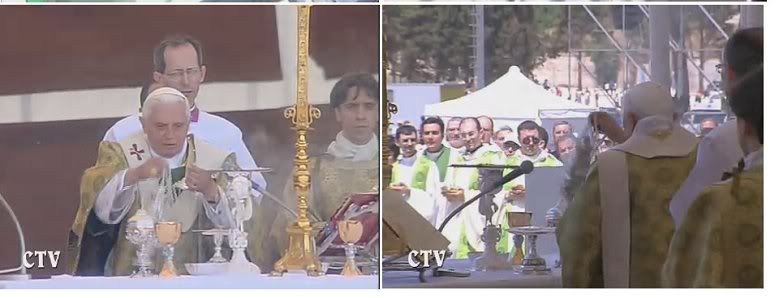
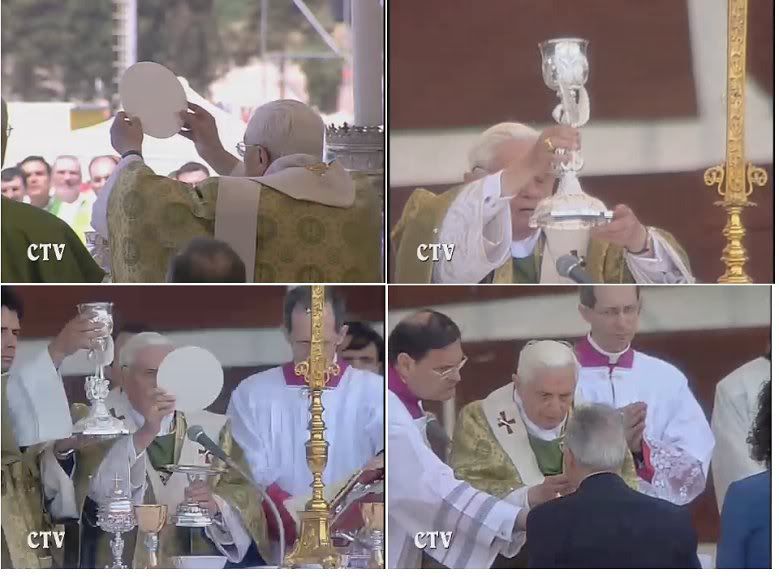
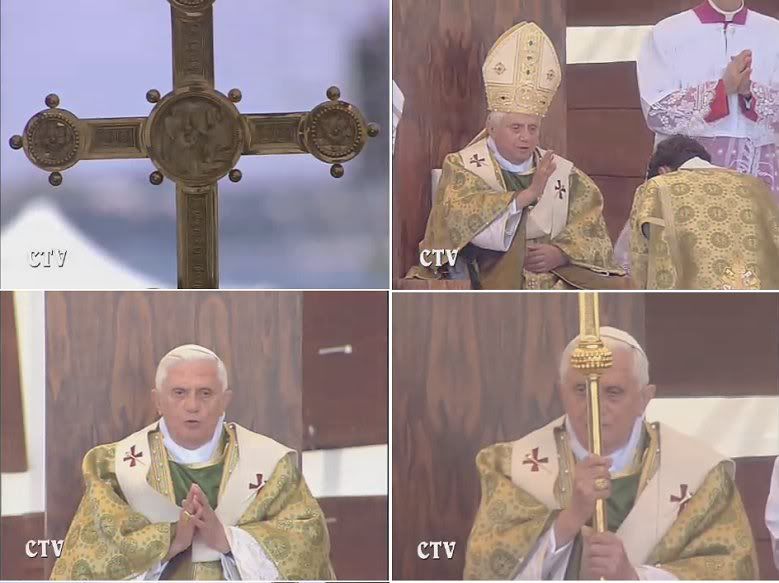
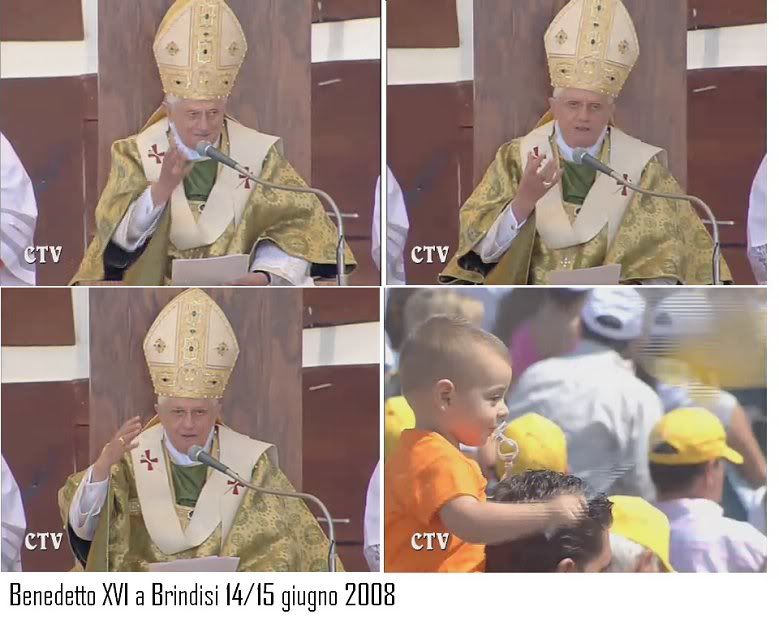
At the conclusion of the Holy Mass celebrated in Sant'Apollinare wharf at the Port of Brindisi, the {ope led in the recitation of the Angelus. Here are the words he said before the prayers:
REMARKS BEFORE THE ANGELUS
Dear brothers and sisters,
Before concluding this celebration, I express my acknowledgment to all those who prepared it with such care, animating it with music and song. I thank all those who organized my trip and are contributing so that everything may proceed in the best way. I refer to the various local authorities, the forces of order, volunteers, and you, dear inhabitants of Brindisi.
I invite everyone now, as I do every Sunday, to join me in praying the Angelus.
The place where we find ourselves - the port - is laden with pregnant symbolic significance. Every port speaks of welcome, of refuge, of security; it represents the hoped-for goal after navigation, perhaps long and difficult. But it also means departures, projects and aspirations, for the future.
In particular, the port of Brindisi has a front-line role in communications towards the Mediterranean world and the Middle East, and because of this, it also hosts a base of the United Nations which carries out an important function on the humanitarian level.
From this very evocative place, not far from a place named 'good morning' (Calimera) in Greek, I wish therefore to renew the Christian message of cooperation and peace among all peoples, especially among those who face the Mediterranean sea, ancient cradle of civilization, and those of the Near and Middle East.
And I am pleased to do so with the words that I used two months ago in New York, addressing the General Assembly of the United Nations: "The action of the international community and its institutions, provided they respect the principles that underlie the international order, should never be interpreted as an undesired imposition and a limitation on sovereignty. On the contrary, it is indifference or non-intervention that bring real damage. What is needed is a more profound search for ways to forestall and control conflicts, exploring every possible diplomatic way and paying attention to the faintest signs of dialog or desire for reconciliation" (L'Osservatore Romano, 4/20/08, O. 8).
From this piece of Europe that juts out into the Mediterranean, between East and West, we turn once again to Mary, the Mother who shows us the way - Odegitria - giving us Jesus, the Way of peace. We invoke her ideally with all the titles with which she is venerated in teh shrines of Puglia, and in particular here, from this ancient port, we pray to her as the 'port of salvation' for every man and for all mankind.
May her maternal protection always defend your city and region, Italy, Europe and the whole world from the tempests that threaten the faith and true values, and may she allow the young generations to set forth without fear to face the journey of life with Christian hope. Mary, port of salvation, pray for us!
After the recitation of the Angelus, the Holy Father left the Port of Brindisi and returned by car to the Bishop's Palace, where he had lunch with the bishops of Puglia.
[Modificato da TERESA BENEDETTA 17/06/2008 03:35] |
 15/06/2008 23:31 15/06/2008 23:31 |
|
| | | OFFLINE | | Post: 13.947 | Registrato il: 28/08/2005
| Utente Gold | |
|
  PASTORAL VISIT TO LEUCA AND BRINDISI, June 14-15, 2008
PASTORAL VISIT TO LEUCA AND BRINDISI, June 14-15, 2008
   Pope gives Communion the traditional way
Pope gives Communion the traditional way
during his visit to southeastern Italy
 I do not know why AFP has so far not carried this story in its English service.
I do not know why AFP has so far not carried this story in its English service.
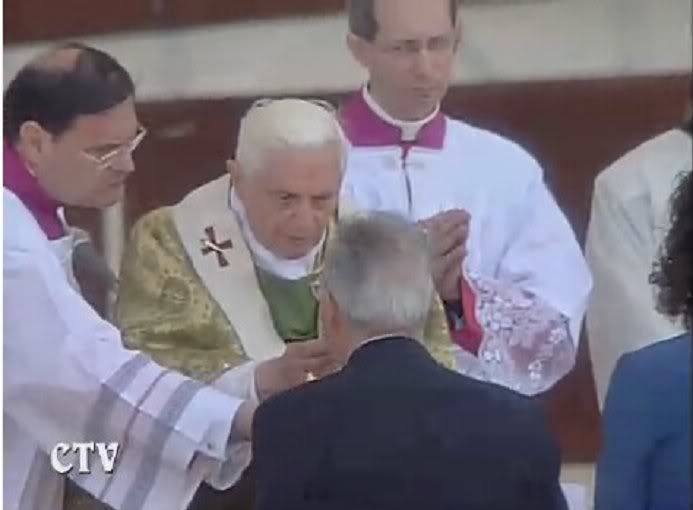
BRINDISI, Italy, June 15 (Translated from AFP French service) - After rehabilitating the 'Tridentine' mass and the reapparition of lace albs, Benedict XVI today took another step in returning to traditional liturgical practices by giving Communion to faithful who knelt to receive it at an open-air Mass before some 70,000 persons in this port city of southern Italy.
This practice fell into disuse over the past 40 years following the liturgical reform of 1969-1970 in which receiving Communion in the hands while standing before the Mass celebrant became common practice with the new form of the Mass (now called the ordinary form).
The Pope first gave Communion this way in public at the Mass on the Solemnity of Corpus Domini last May 22 in front of the Basilica of St. John Lateran, although it did not get much notice because the public was much more limited.
Those chosen beforehand to receive Communion from the Pope himself knelt at a prie-Dieu set in front of the Pope. [What this report does not mention is that the same practice was followed at the Papal Mass in Santa Maria di Leuca yesterday.]
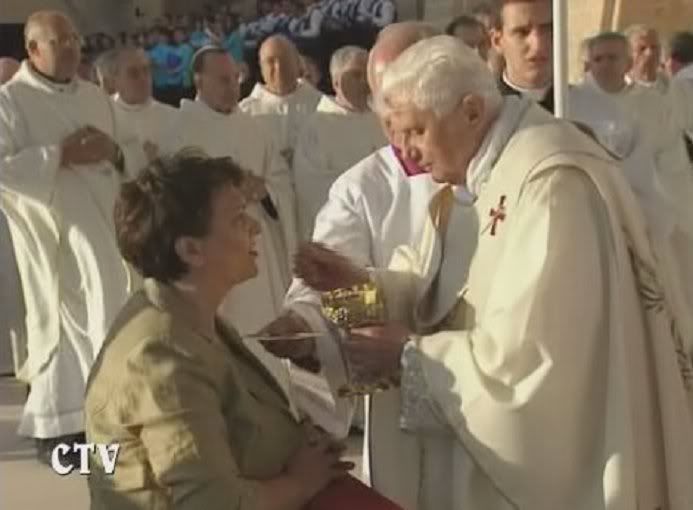 Communion in Leuca yesterday.
Communion in Leuca yesterday.
The implication now is that the faithful may choose which way he or she prefers to receive Communion. [Personally, I can say that I have never had any problem presenting myself to the priest kneeling down for Communion all these years, although there was a much-publicized incident of a California priest not only refusing to give Communion to someone who knelt to receive it but also audibly chastised her on the spot for not doing it the way 'everyone else does'.]
Kneeling for Communion, which was never prohibited, had remained an exclusive practice at parishes where the traditional Mass was still performed (or had been allowed by indult to be performed).
By his actions, Benedict XVI apparently wants to set an example for the whole church and his priests.
"We Christians kneel only before the Blessed Sacrament (the Host) because we know and believe that we are in the presence of the one true God," he said on May 22.
"I am convinced it is urgent to give Communion to the faithful directly on the tongue without them touching it" and "to revive kneeling at the moment of Communion as a sign of respect," he added.
The liturgical modifications introduced by Benedict XVI in the past several months have favored a return to some practices which had fallen into disuse after the post-Vatican II liturgical reforms.
In Brindisi today, the Pope issued "a message of peace and cooperation to all peoples", particularly 'those of the Near and Middle East'.
"From this very evocative place, I wish to renew the Christian message of cooperation and peace among all peoples, particularly among those who live along this sea [the Mediterranean], ancient cradle of civilizations, and the other nations of the Near and Middle East," he said in his homily this morning.
Brindisi, on the Adriatic coast, is the site of the United Nations depot for emergency humanitarian aid administered by the World Food Program.
It was chosen following the arrival there of thousands of Albanians in search of better living conditions and refugees from the former Yugoslavia fleeing the Balkan wars of the 1990s.
The Pope paid tribute to the work of the UN in Brindisi and 'the important role it plays on the humanitarian level.'
He renewed the conviction he expressed at the United Nations in New York last April that it was legitimate for the international community to intervene in case of crisis, saying that "it is indifference or non-intervention which cause real damage."
Before the Angelus prayers at noon today, the Pope addressed himself "to all the peoples of the world" from "this piece of Europe on the Mediterranean, a bridge between East and West," without citing any specific situation.
On his arrival in Brindisi Saturday night, the Pope, in an address to a youth assembly, praised the 'generosity' of the people of Brindisi towards the tens of thousands of refugees "from Croatia and Montenegro, Albania and Macedonia."
This port city deployed an excess of security measures for the Pope. All the streets in the center of the city were closed to regular traffic since Saturday morning, and Coast Guard boats patrolled the waters along the portside esplanade where the Pope celebrated Mass this morning.
In his homily, the Pope also emphasized the Church's social commitment in the name of "Christ's love for the 'little' people and the poor."
"Christian compassion," he said, "has nothing to do with piousness or volunteerism - rather, it is synonymous to brotherly solidarity and sharing and inspired by hope."
=====================================================================
And here is a story about the fabric used for the Pope's chasuble today, which was in the style of St. Philip Neri. Its a translation of an item in the website of the Archdiocese of Brindisi-Ostuni's office of cultural assets, and it can be fully appreciated now that we have seen the chasuble. Unfortunately, none of the pictures available so far can show us the details of the fabric pattern described below.
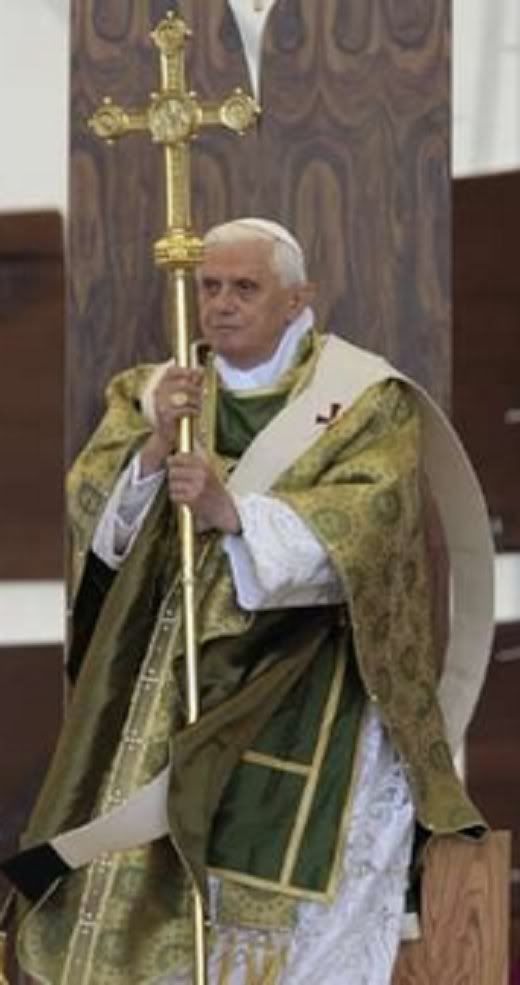 Note the dalmatic and stole under the chasuble.
FABRIC SPECIALLY COMMISSIONED FOR THE CHASUBLE
Note the dalmatic and stole under the chasuble.
FABRIC SPECIALLY COMMISSIONED FOR THE CHASUBLE
OF POPE BENEDICT XVI ON HIS VISIT TO BRINDISI
Technical Description
by Maria Pia Pettinau Vescina
(Historian of old fabrics)
Office of Ecclesiastical Cultural Assets
Archdiocese of Brindisi-Ostuni
www.brindisiweb.com/arcidiocesi/
The fabric, executed masterfully by Angelo De Negri of the Giuseppe De Negri textile factory in Caserta, is absolutely and surprisingly faithful in terms of the design to the original reliquary fabric used for the relics of San Teodoro d'Amasea, patron saint of the city of Brindisi.
[NB: A special note on the site explains:]
On November 9, 1225, feast of St. Theodore, the wedding took place, in the Basilica Cathedral of Brindisi, between the very young queen of Jerusalem, Isabelle of Brienne, and the Lord of the West, Emperer Frederick II of the Swabians [what is now the Baden-Wuerttemberg area of Germany).
For the occasion, the remains of St. Theodore of Amasea were brought to Brindisi by way of a gift from the Eastern queen to her new subjects, wrapped in a reliquary fabric.
On the occasion of the visit to Brindisi of His Holiness Benedict XVI, for both the chasuble tobe worn by the Pontiff as well as the stoles to be worn by the priests, a copy of that reliquary fabric now kept in the Diocesan Museum of Brindisi has been made to order.
Its principal value lies in its relation to the devotional history and tradition of Brindisi.
It was woven using green silk thread as warp, and green linen thread with mustard yellow silk thread for the woof.
It was decided to use the yellow silk instead of the original idea to use gold lurex as a substitute for the gold filigree thread in the original reliquary fabric. The lurex idea was discarded because the shininess of the synthetic would have made the resulting fabric look theatrical and therefore 'fake' for a sacred garment to be used by the Holy Father in a liturgical rite of absolute solemnity.
Using the yellow silk in the woof, with the overall green scheme, results in a changeable shade of green [but in certain lighting, the yellow dominates), and also brings out with better relief the multi-lobed rosettes enclosing the gryphons of the design. [It was explained in an earlier article that the rosette stands for the Mystical Rose, Christ, and the mythological gryphons - half-lion, half-eagle - for the dual nature of Christ].
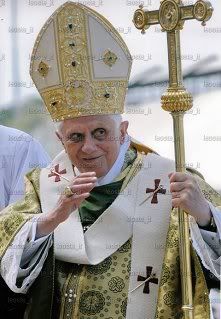 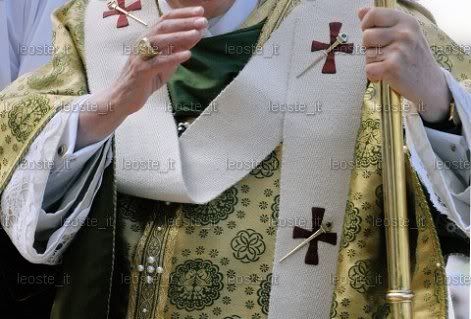 Photos show the composition and detail of the pattern woven into the fabric.
Photos show the composition and detail of the pattern woven into the fabric.
Green is the liturgical color on the Sunday of the papal Mass in Brindisi, and dominates the parallel rows of rosettes, as well as the stellate corollas of the rosettes, and the geometrical play of four-lobed circles forming crosses that adorns the space between the rosettes.
The same fabric is used as borders to trim the chasubles of the concelebrants, executed in green satin with a monochrome pattern repeating the daisylike main pattern of the Holy Father's chasuble.
Much attention has been paid to the stylistic unity of all the liturgical garments that are appropriate to the solemnity of the occasion without being ostentatious.
We hope that the Holy Father will accept the gift of the chasuble crafted specially for him, as a lasting and meaningful souvenir of his visit to Brindisi.
[The site also describes the silver chalice commissioned for the Papal Mass, based on an 18th-century ostensorium carried on Corpus Christi processions and found in the Diocesan Museum of Brindisi. Its main design element is the pelican - which the Fathers of the Church considered the most striking symbol for the Eucharist, because the pelican feeds its young with the blood that gushes from tearing open its chest. Until he became Pope, Joseph Ratzinger's cardinal ring, a gift from his brother Georg, featured a pelican engraved on its gemstone (onyx?).]
======================================================================
ANSA has this picture of the Holy Father presenting Bishop Talucci with his customary gift of a chalice for the host diocese, at the start of the Mass this morning. The principal deacon's dalmatic is made of the same material as the Pope's chasuble. The Holy Father's dalmatic and the chasubles worn by the concelebrants were in green-on-green patterned satin.
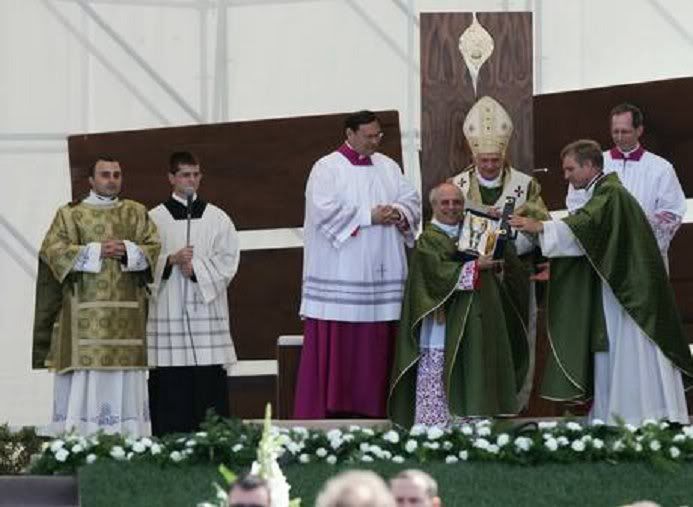
[Modificato da TERESA BENEDETTA 18/06/2008 23:51] |
 16/06/2008 02:43 16/06/2008 02:43 |
|
| | | OFFLINE | | Post: 13.948 | Registrato il: 28/08/2005
| Utente Gold | |
|
  PASTORAL VISIT TO LEUCA AND BRINDISI, June 14-15, 2008
PASTORAL VISIT TO LEUCA AND BRINDISI, June 14-15, 2008
   MEETING WITH THE CLERGY OF PUGLIA
MEETING WITH THE CLERGY OF PUGLIA
So far, we have photos of the Pope arriving for the meeting held in the Cathedral of Brindisi, and one after the meeting, but not the meeting itself. The Vatican did not release any texts from today except the Pope's Angelus remarks, but according to an Italian news agency report, the Holy Father called on the clergy to strengthen their pastoral ministry by basing it on assiduous prayer and a continuing cultural, theological and spiritual formation.
He asked them to be missionaries of God's love and to make their parishioners experience the joy of belonging to Christ.
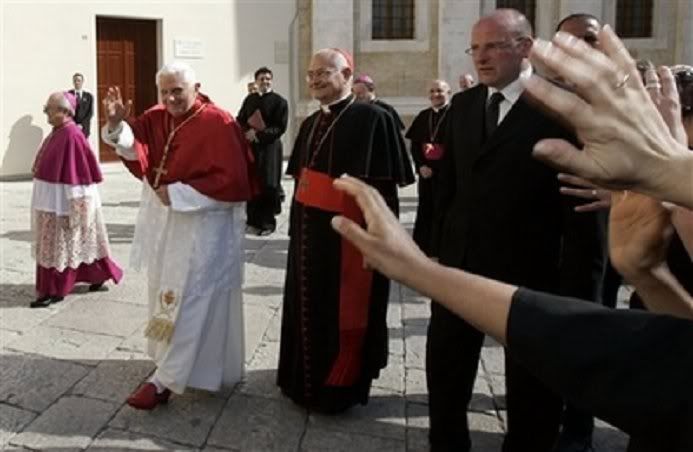 The Pope is flanked by Cardinal Salvatore De Giorgi, emeritus Archbishop of Palermo and a native of the Salento region, and by the Bishop of Brindisi-Ostuni, Mons. Vito Talucci.
The Pope is flanked by Cardinal Salvatore De Giorgi, emeritus Archbishop of Palermo and a native of the Salento region, and by the Bishop of Brindisi-Ostuni, Mons. Vito Talucci.
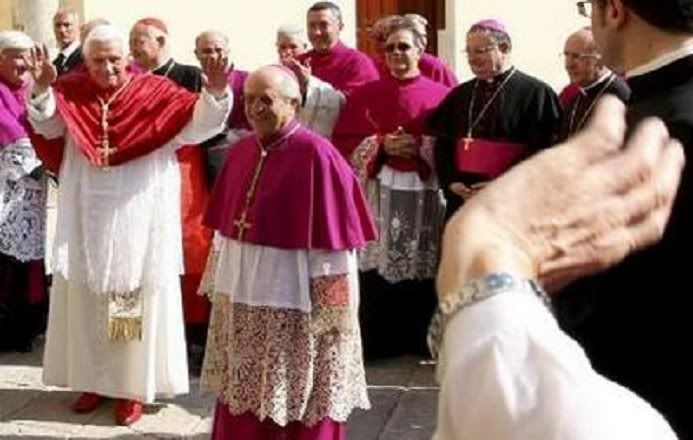
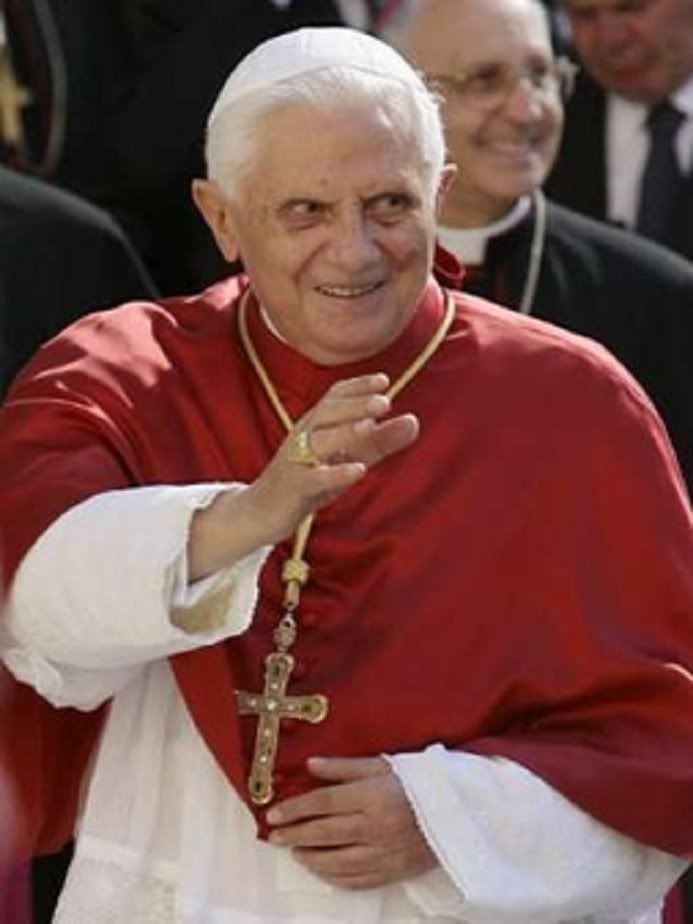
The note which precedes the text of the Holy Father's address posted by the Vatican (on June 16) says:
In the afternoon, before leaving the Bishop's Palace, the Pope greeted some of the organizers of this papal visit. He then proceeded to the Cathedral of San Lorenzo for a meeting with the clergy of Puglia, scheduled for 4:45 p.m.
The Holy Father first spent some moments in adoration of the Blessed Sacrament, and then, after a greeting from the Archbishop of Brindisi-Ostuni, Mons. Vito Talucci, the Pope addressed the assembled clergy with these words (translated here):
ADDRESS TO THE CLERGY OF PUGLIA
Dearest priests, deacons and seminarians,
I am happy to extend my heartfelt greeting to all of you who are gathered in this beautiful Cathedral which has been re-opened for use after restorations undertaken last November.
I thank the Archbishop, Mons. Vito Talucci, for the warm message of greeting that he addressed to me in your name, and for all his gifts.
I thank the priests, to whom I wish to express my satisfaction for the vast and detailed pastoral work that they are carrying out. I greet the deacons, the seminarians, and all who are here, and express to you my joy at being surrounded by so many souls consecrated to the coming of the Kingdom of God.
Here, in this Cathedral which is the heart of your diocese, we all feel ourselves at home, united by the bond of Christ's love. Here, we wish to render grateful thanks to the memory of all who spread Christianity in these lands. Brindisi was one of the first cities of the Western world to welcome the Gospel, which reached here through the Roman consular routes.
Among the evangelizing saints, I think of St. Leucius, Bishop, of St. Oronzo, of St. Theodore of Amasea and St. Lawrence of Brindisi, who was proclaimed a Doctor of the Church by John XXIII. Their presence continues to be very much alive in the hearts of the people and visible in many monuments in your city.
Dear brothers, seeing you gathered in this Church, in which most of you received your diaconal adn priestly ordinations, I am reminded of the words that St. Ignatius of Antioch wrote to the Christians of Ephesus: "Your venerable college of priests, worthy of God, must be harmoniously united to the Bishop, as the strings are to the zither. In this way, in the accord of your feelings and the perfect harmony of your fraternal love, you raise a concert of praise to Jesus Christ."
And the sainted bishop adds: "May each of you learn to be a part of the choir - in the harmony of concord and in unison with the word of God heard through Jesus Christ, in the single voice that sings the praises of the Father, he will listen to you" (Letter to the Ephesians, 4).
Be persevering, dear priests, in the quest for such a unity of intentions and of reciprocal assistance, so that your fraternal love and the unity of your pastoral work may be an example and a stimulus for your communities.
This has been the main objective of the pastoral visits made to the parishes by your Archbishop which he completed last March. Precisely because of your generous collaboration, those visits were not merely a juridical compliance but an extraordinary occasion of ecclesial and formative value.
I am sure that it will bring its fruits, so that the Lord may give abundant growth to the seeds sown with love in thr souls of the faithful.
With my presence today, I wish to encourage you to place yourselves with ever increasing disposition in the service of the Gospel and the Church. I know that you have been working with zeal and intelligence, without sparing your energies, for the purpose of spreading the happy news of the Gospel.
Christ, to whom you have consecrated your lives, is with you! In him, we all believe; to him, we entrust our lives; it is He we wish to proclaim to the world. Christ is the Way, the Truth, and the Life (cfr Jn 14,6) - may this be the theme of our thoughts, the subject of our speech, the motive for our life.
Dear brother priests, in order that yours may be a strong and vigorous faith, it must be nourished, as you well know, by assiduous prayer. Be models of prayer, become masters of prayer.
Your days must be marked by periods of prayer during which, following the example of Jesus, you may undertake a regenerating dialog with the Father.
I know it is not easy to be faithful to these daily appointments with the Lord, especially these days when the rhythm of life has become frenetic, and our daily cares absorb us increasingly more. Still, we must convince ourselves: the moment of prayer is the most important in the life of a priest - it is when divine grace acts most effectively, bestowing a fecundity on our ministry.
Prayer is the first service we can render to our community. That is why the periods of prayer should have a true priority in our life. I know how many things press on us: in my case, an audience, documents to study, a meeting, always something else.
But if we are not in interior communion with God, then we cannot give anything to others. That is why God is the first priority. We should always reserve the time necessary to be in a communion of prayer with our Lord.
Dear brothers and sisters, I also wish to rejoice with you for the new Archiepiscopal Seminary which was inaugurated last November by my Secretary of State, Cardinal Tarcisio Bertone.
On the one hand, it expresses the present of the Diocese, constituting a point of arrival for the work carried out by the priests and parishes in the sectors of youth ministry, catechetical instruction, and religious motivation for families.
On the other hand, the Seminary is an investment in the future that is more valuable than ever because it assures, through patient and generous work, that the Christian communities will not lack for pastors of souls, masters of faith, zealous leaders and witnesses of Jesus's love.
Besides being the seat of your formation, dear seminarians, who are the true hope of the Church, your Seminary is also a place for keeping up to date [with the faith] and of continual formation for young people and adults who wish to offer their contribution to the cause of the Kingdom of God.
The attentive preparation of seminarians and the permanent ongoing formation of priests and other pastoral workers constitute priority concerns for the Bishop, to whom God has entrusted the mission of leading, as a wise Pastor, the People of God who live in this city.
Another occasion for the spiritual growth of your community is the diocesan Synod, the first after Vatican-II and after the unification of the dioceses of Brindisi and Ostuni. It is the occasion for relaunching the apostolic commitment of the entire diocese, but it is, above all, a privileged time for communion, which helps to rediscover the value of fraternal service, as indicated by the Biblical icon which you chose that shows the washing of the feet (cfr Jn 13,12-17), with the words of Jesus who says, "Just as I did" (John 13,5).
If it is true that the Synod - every Synod - is called to establish laws, to issue norms that are appropriate and adequate for an organic pastoral ministry, which can inspire and stimulate renewed commitment to evangelization and evangelical witness, it is also true that it should reawaken in every baptized person that missionary yearning which constantly inspires the Church.
Dear brother priests, the Pope assures you of a special place in his prayers so that you may continue along the path of authentic spiritual renewal that you have been taking with your respective communities.
May you be helped in this task by the experience of 'being together' in faith and reciprocal love, as the Apostles had with Christ in the Cenacle. It was there that the divine Teacher taught them by opening their eyes to the splendor of truth, and where he gave them the sacrament of unity and love: the Eucharist.
In the Cenacle, at the moment of the washing of the feet, it emerged clearly that service is one of the fundamental dimensions of Christian life. It is therefore the task of the synod to help your local Church, in all its components, to rediscover the sense and the joy of service - a service out of love.
This is important above all for you, dear priests, who are configured to Christ 'leader and pastor', always ready to serve his flock. Be cognizant and joyous for the gift you have received. Be generous in carrying out your ministry. Sustain yourself with assiduous prayer and a permanently continuing cultural, theological and spiritual formation.
As I renew to you my expression of sincere appreciation and my most heartfelt encouragement, I invite you and the entire diocese to prepare yourselves for the Pauline Year, which will start soon.
It could be an occasion for relaunching a generous missionary effort, for a more profound proclamation of the Word of God - heard, meditated and translated into a fruitful apostolate - just as it was for the Apostle of the Gentiles. Conquered by Christ, Paul lived completely for him and for his Gospel, spending his existence in it to the point of martyrdom.
May you be aided by Our Lady, Mother of the Church and the Patron of listening. May you be protected by the patron saints of this beloved land of Puglia. Be missionaries of God's love, so that every parish may experience the joy of belonging to Christ.
As a token of divine grace and of the gifts of his spirit, I gladly impart to each and everyone the Apostolic Blessing.
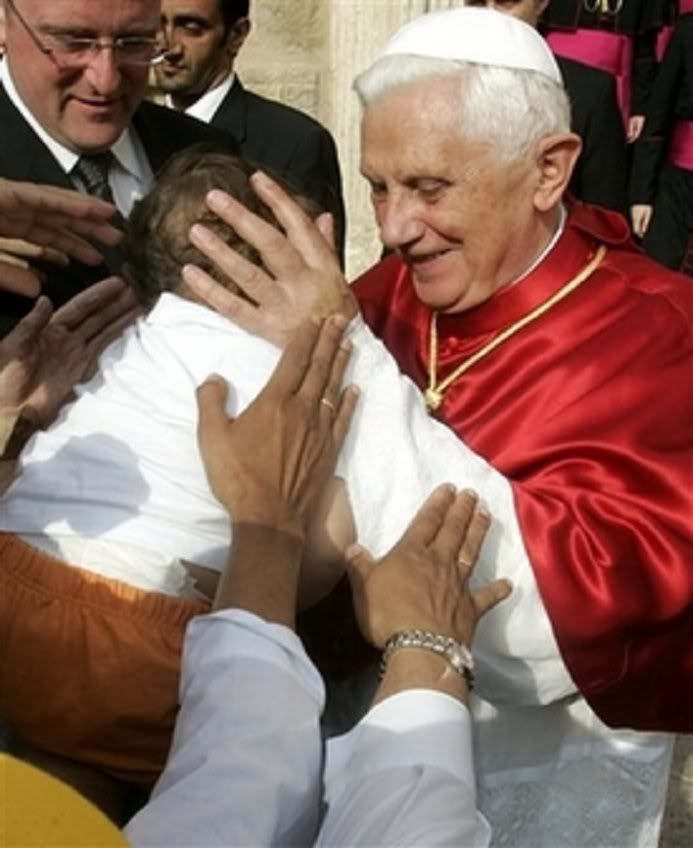
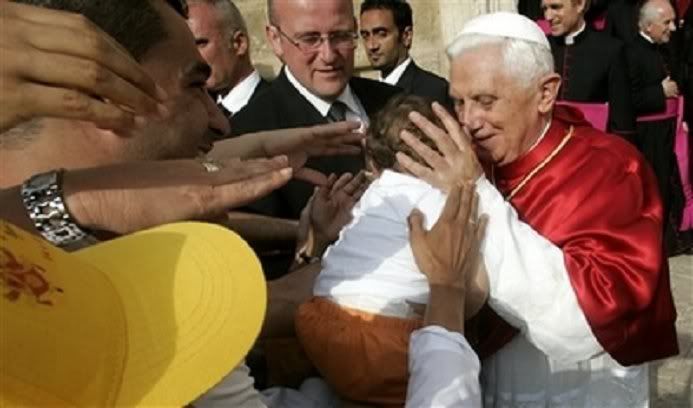
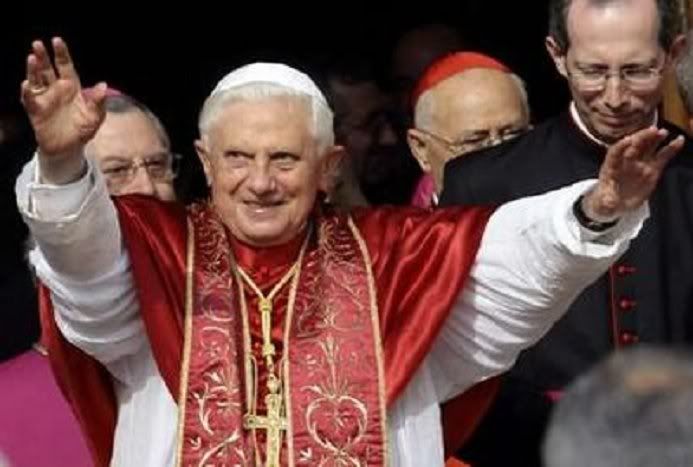
Earlier, the Holy Father had lunch with all the bishops of Puglia at the Bishop's Palace. ANSA reports that the lunch was prepared by teachers at the hotel and restaurant training academy of Brindisi and consisted of: spinach shoots, orechiette [a pasta] with ricotta, smoked goose breast au gratin, stuffed artichokes, and ice cream glazed with orange-flavored chocolate.
On his way to the airport to return to Rome, the Pope's motorcade was to pass by Brindisi's new minor seminary, which Cardinal Bertone inaugurated last November.
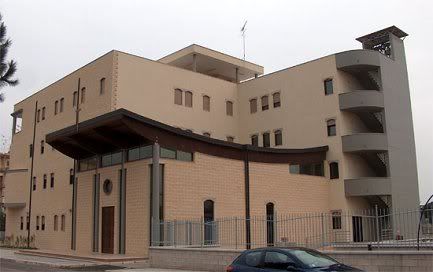 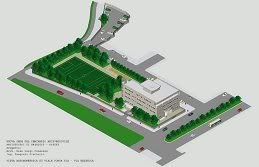 The Benedict XVI Seminary.
The Benedict XVI Seminary.
It was Bishop Talucci's decision to locate the new seminary in a working-class area near the port, and to name it the Benedict XVI Seminary as of today. [It is the second training institution named for Benedict XVI - the first being the Benedict XVI University for Philosophical and Theological Studies at Heiligenkreuz Abbey in Austria.]
[Modificato da TERESA BENEDETTA 16/06/2008 19:14] |
 16/06/2008 04:32 16/06/2008 04:32 |
|
| | | OFFLINE | | Post: 13.949 | Registrato il: 28/08/2005
| Utente Gold | |
|
  PRAYER VIGIL FOR THE POPE
PRAYER VIGIL FOR THE POPE
AT ST. PETER'S SQUARE TOMORROW
Translated from

Tomorrow, at 9 p.m. at St. Peter's Square, there will be a prayer vigil for the Pope and his pontificate.
Organized by the Movimento dell'Amore Familiare [Movement of Family Love] with the support of the Diocese of Rome, the event will include a recitation of the Rosary and a candlelight procession.
This is the fourth year of the prayer vigil, which will presided by Cardinal Angelo Comastri, Arch-priest of St. Peter's Basilica and the Pope's Vicar for the Vatican.
The initiative was born from Pope Benedict's appeal at the start of his Pontificate to pray for his universal mission, so that the Church may be united behind its universal pastor.
The Movement was born in the 1990s to promote awareness of Christian vocation in families, with faith illuminated by reason and a life of spiritual growth and testifying to the Gospel.
The family movement works at the diocesan and parochial levels . One of its objectives is to bring hope to parishioners in difficult or desperate circumstances and towards a more mature Christian faith so that they may take their place once again as vibrant parishioners and citizens.
Fr. Stefano Tardani, who founded the movement, said: "This prayer vigil also expresses the affection and love that so many lay faithful and families in the diocese wish to show for the Holy Fahter and for his work in the world."
[Modificato da TERESA BENEDETTA 16/06/2008 04:46] |
 16/06/2008 17:25 16/06/2008 17:25 |
|
| | | OFFLINE | | Post: 13.952 | Registrato il: 28/08/2005
| Utente Gold | |
|
I have now posted in the appropriate sections above the translations of all five texts delivered by the Holy Father in Leuca and Brindisi this weekend. Once again, it is clear that 'soundbites' used in news reports about the Holy Father's words never capture the full flavor - nor even the full sense - of the individual discourses, and that there is nothing like reading his full texts to convey the full impact of his preaching.
[Modificato da TERESA BENEDETTA 17/06/2008 03:30] |
|
|
|
|